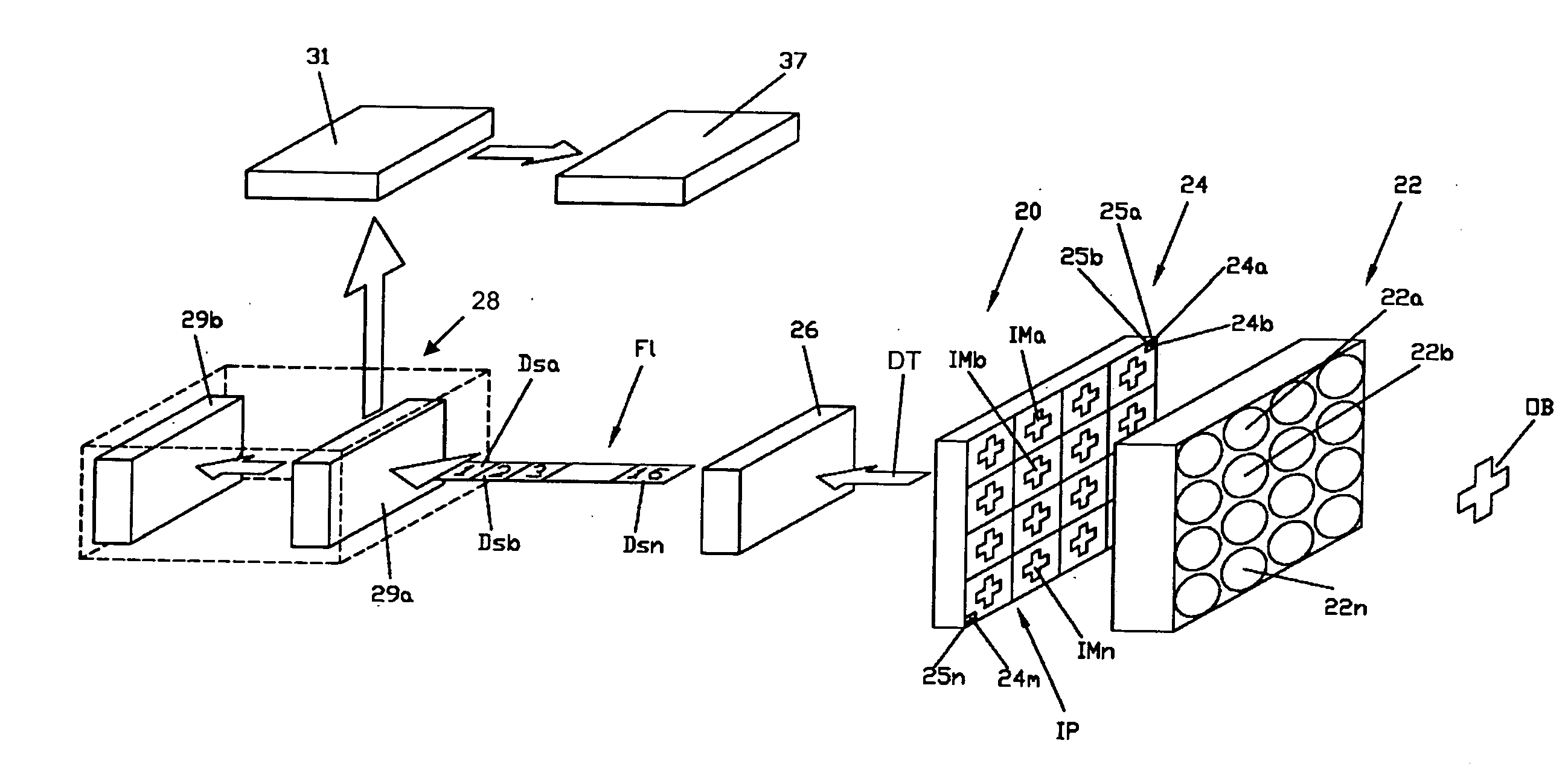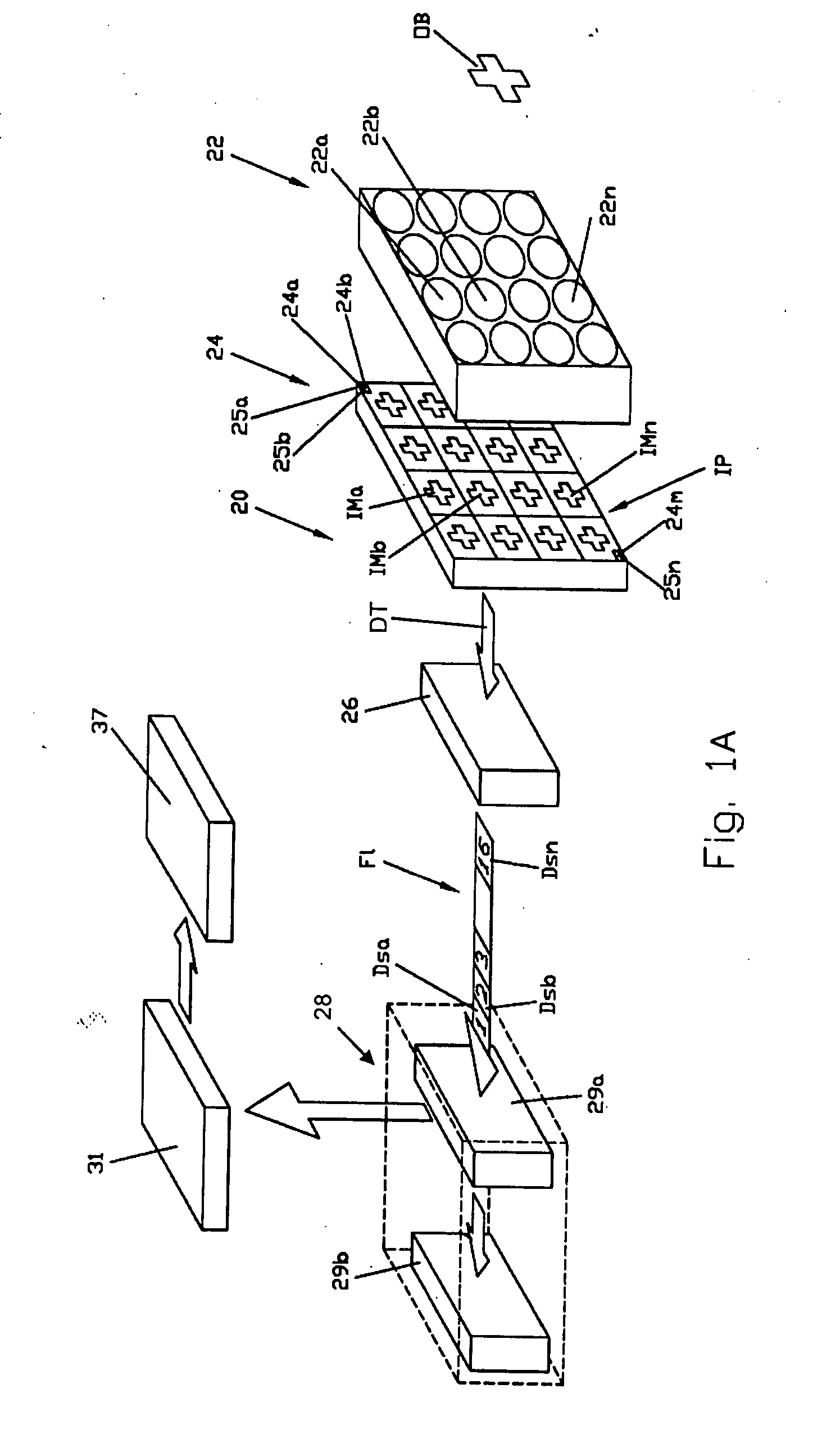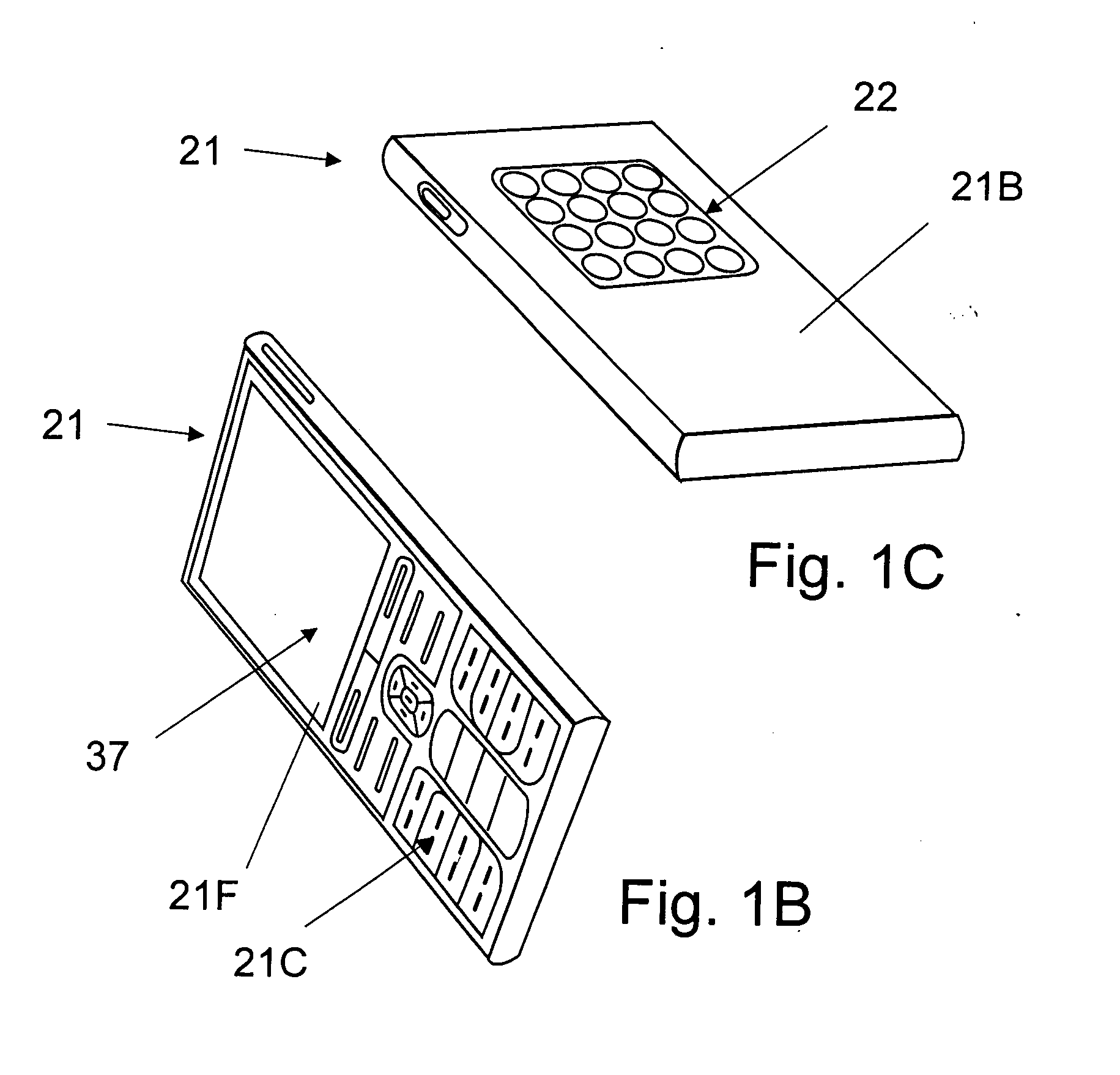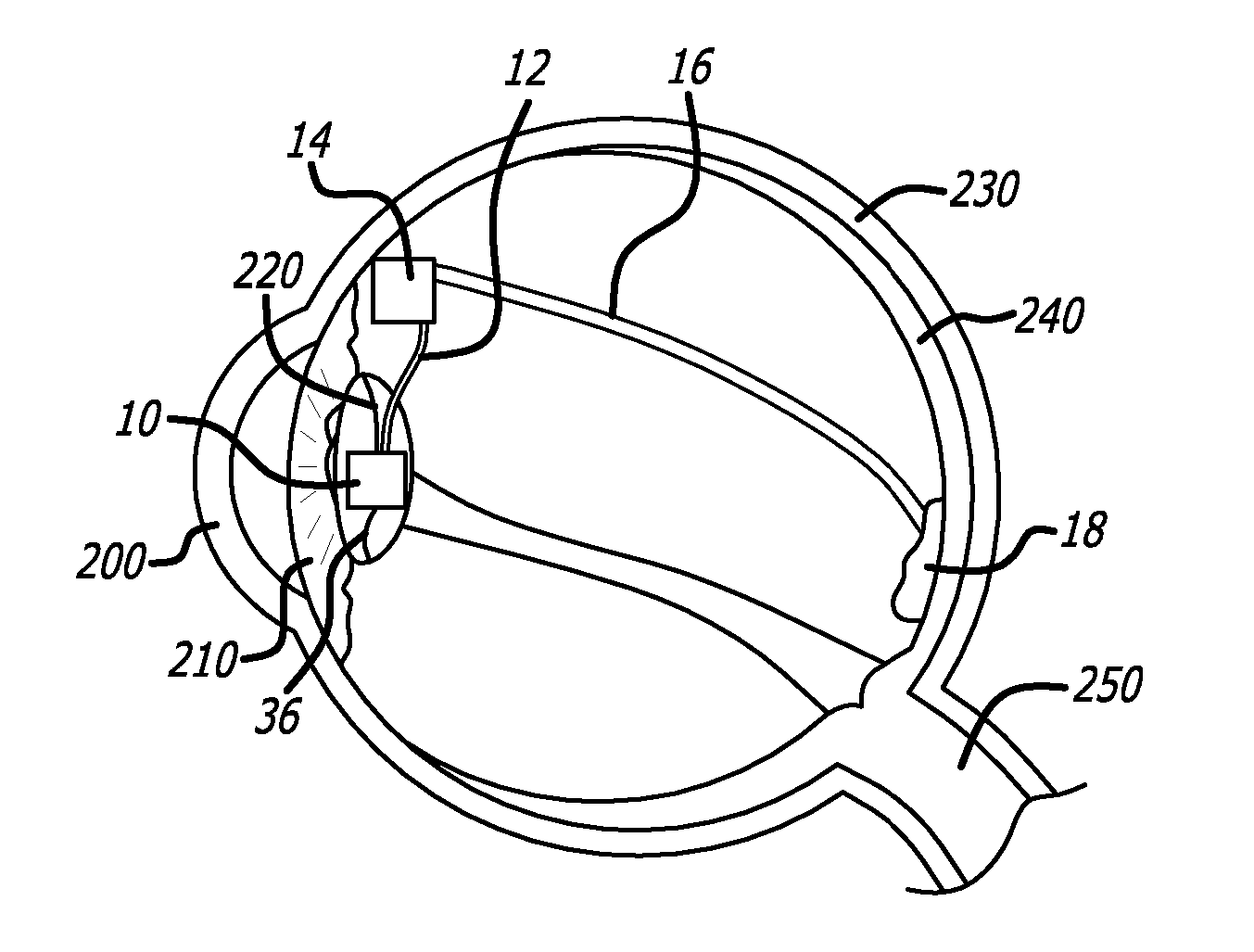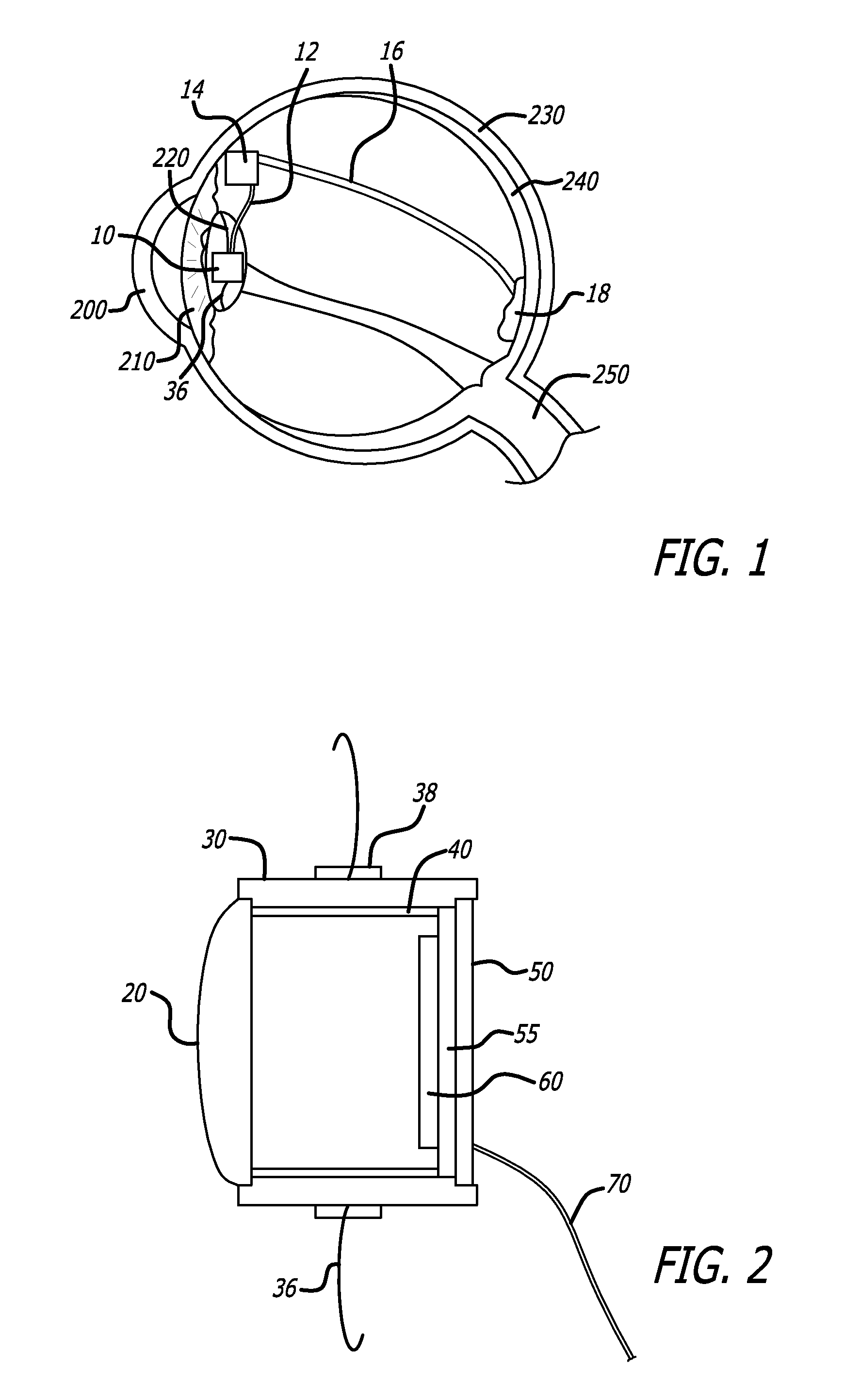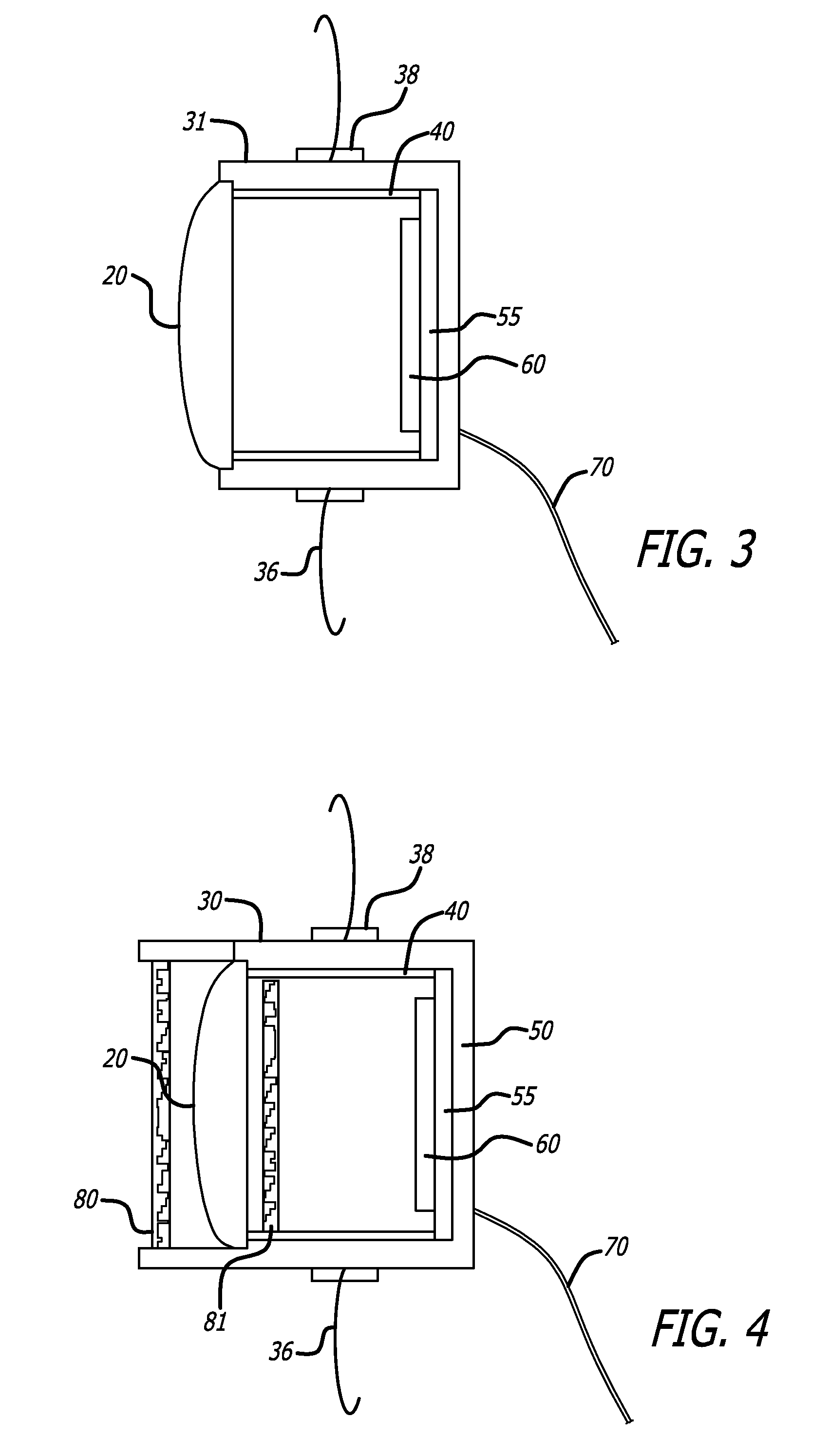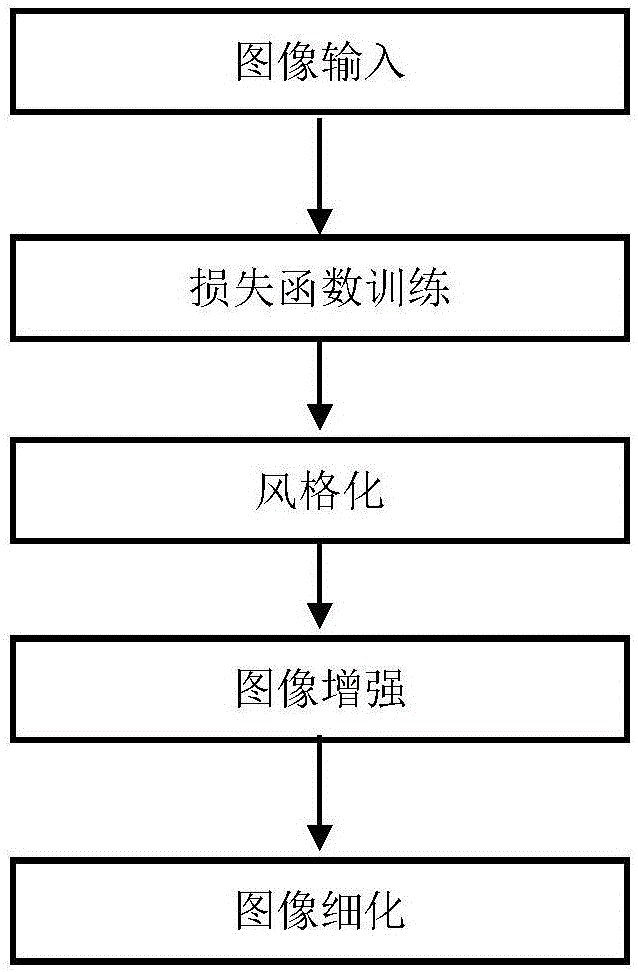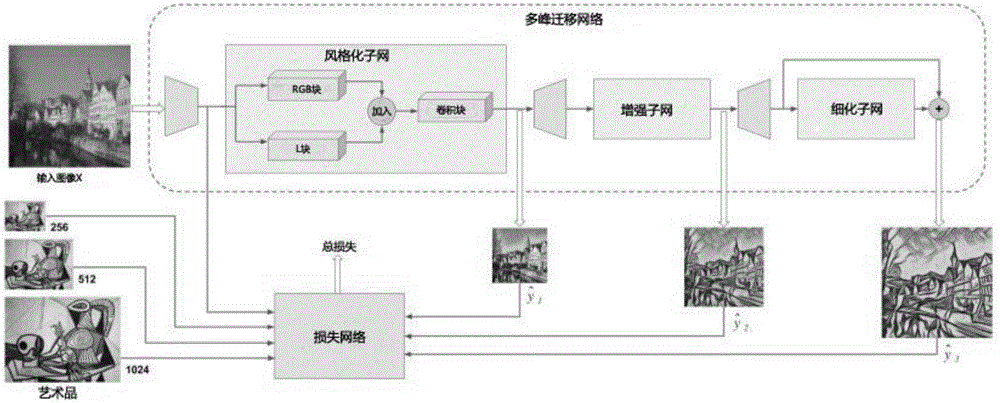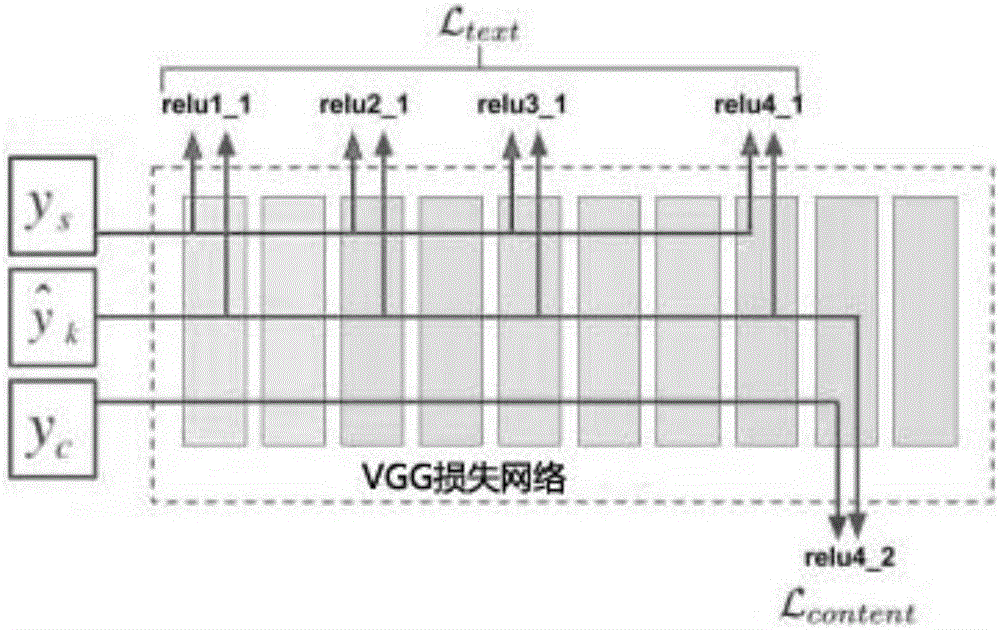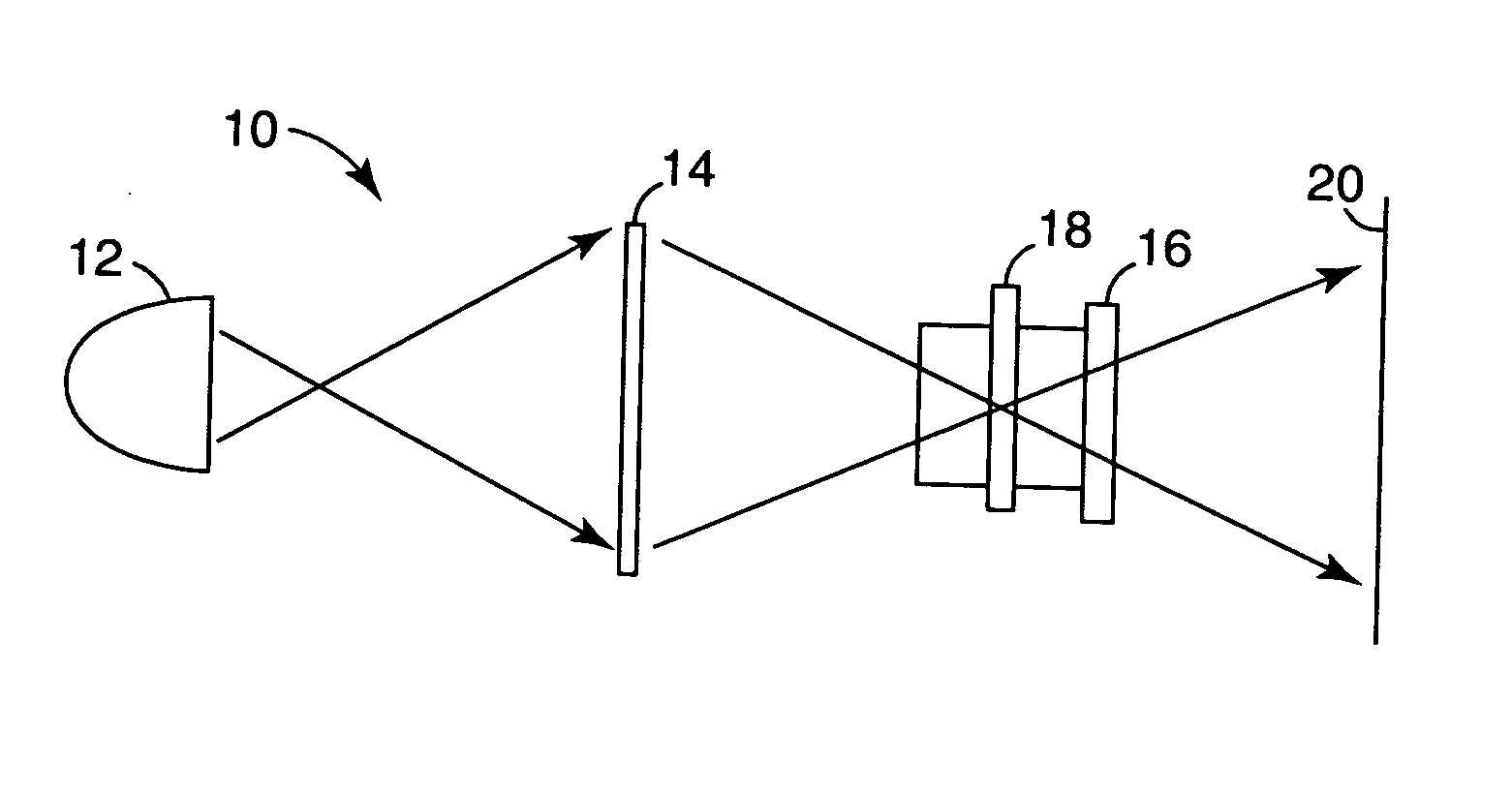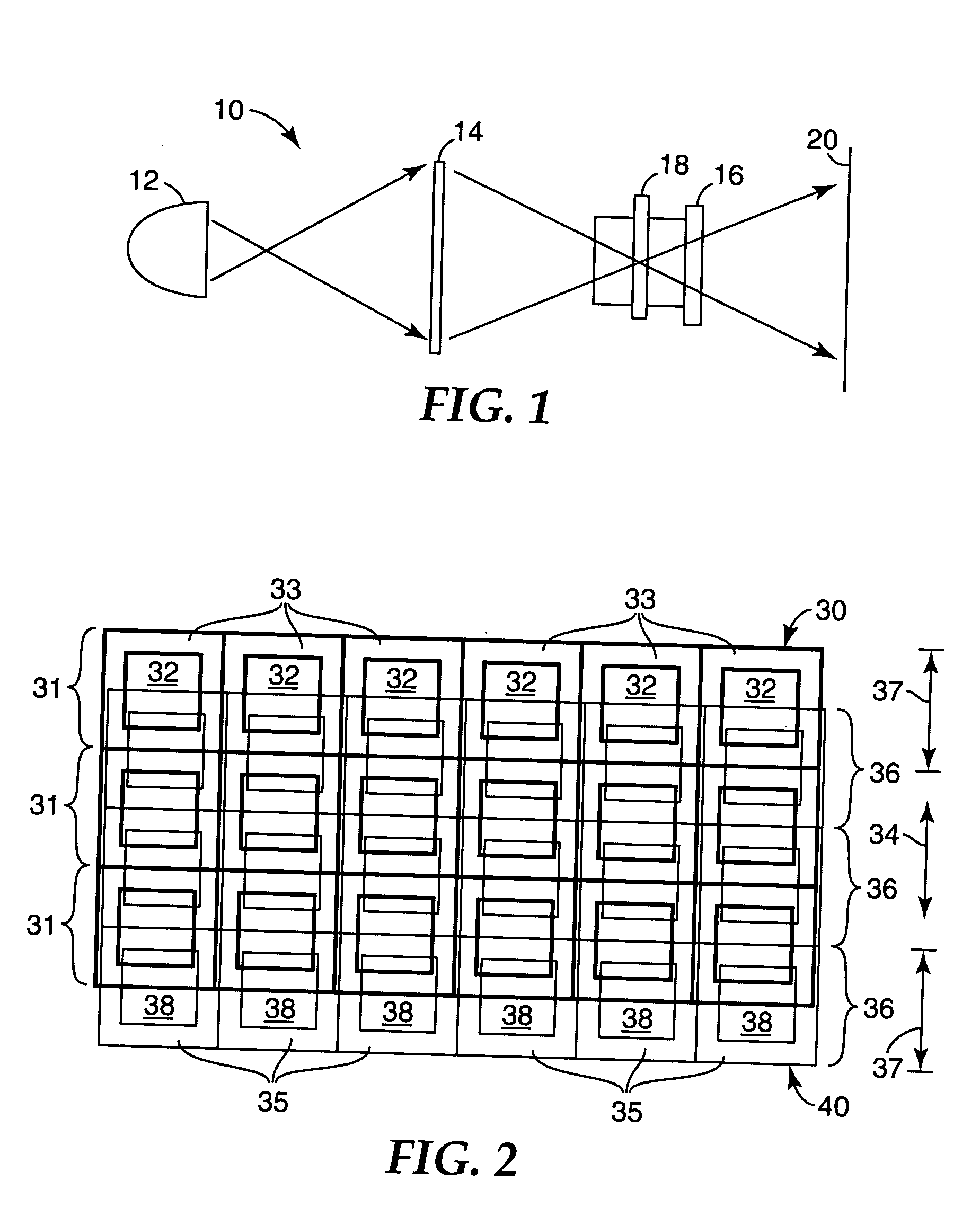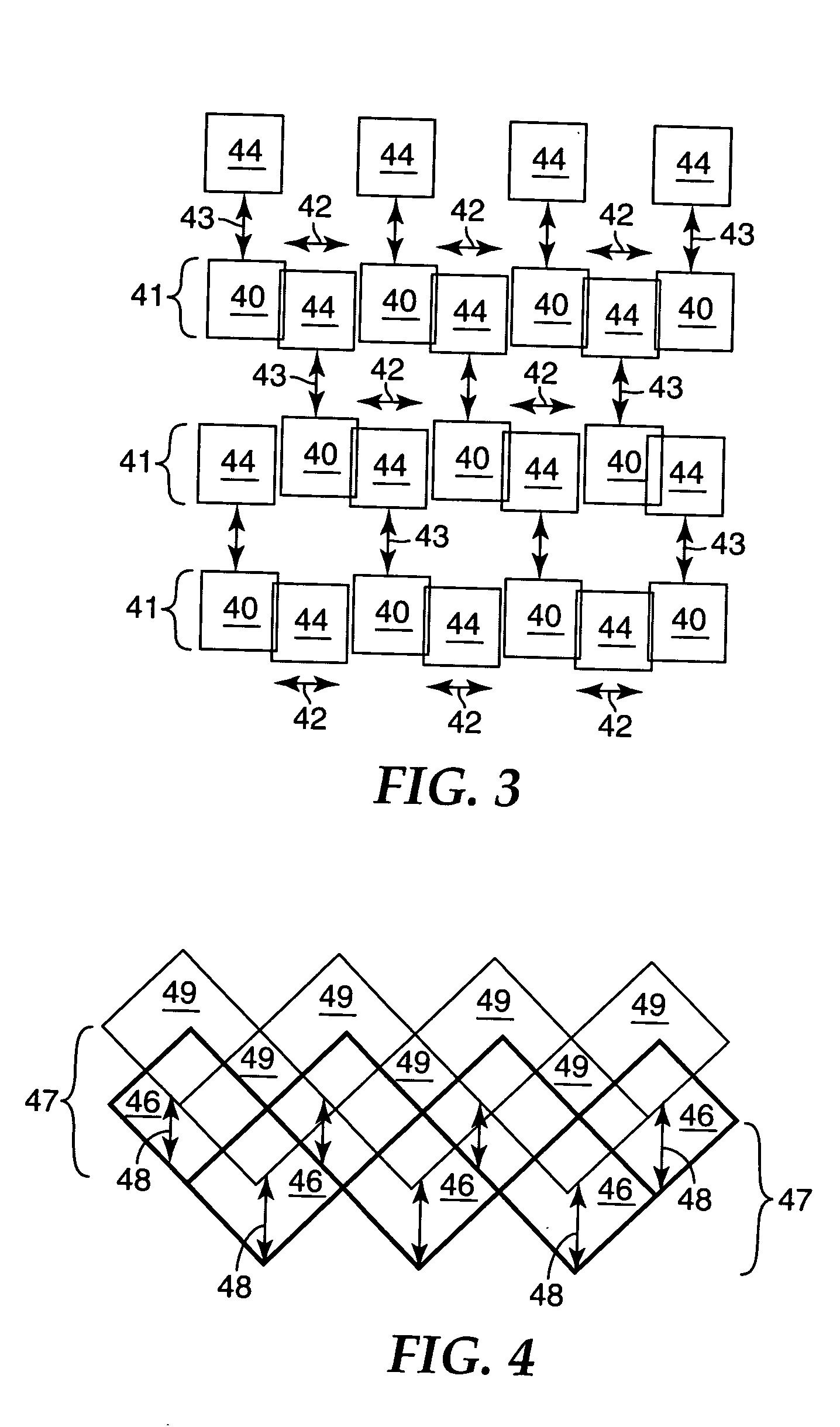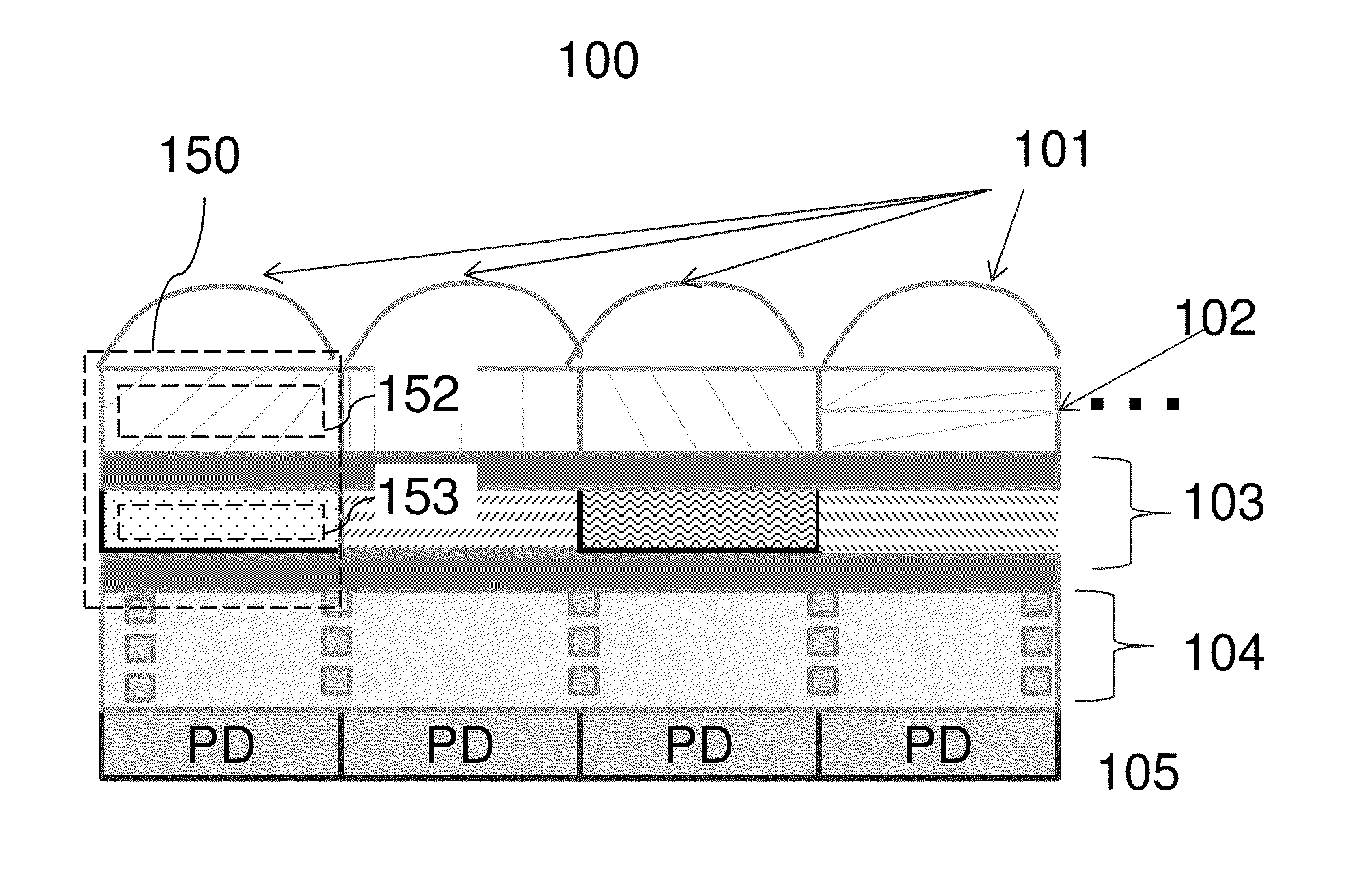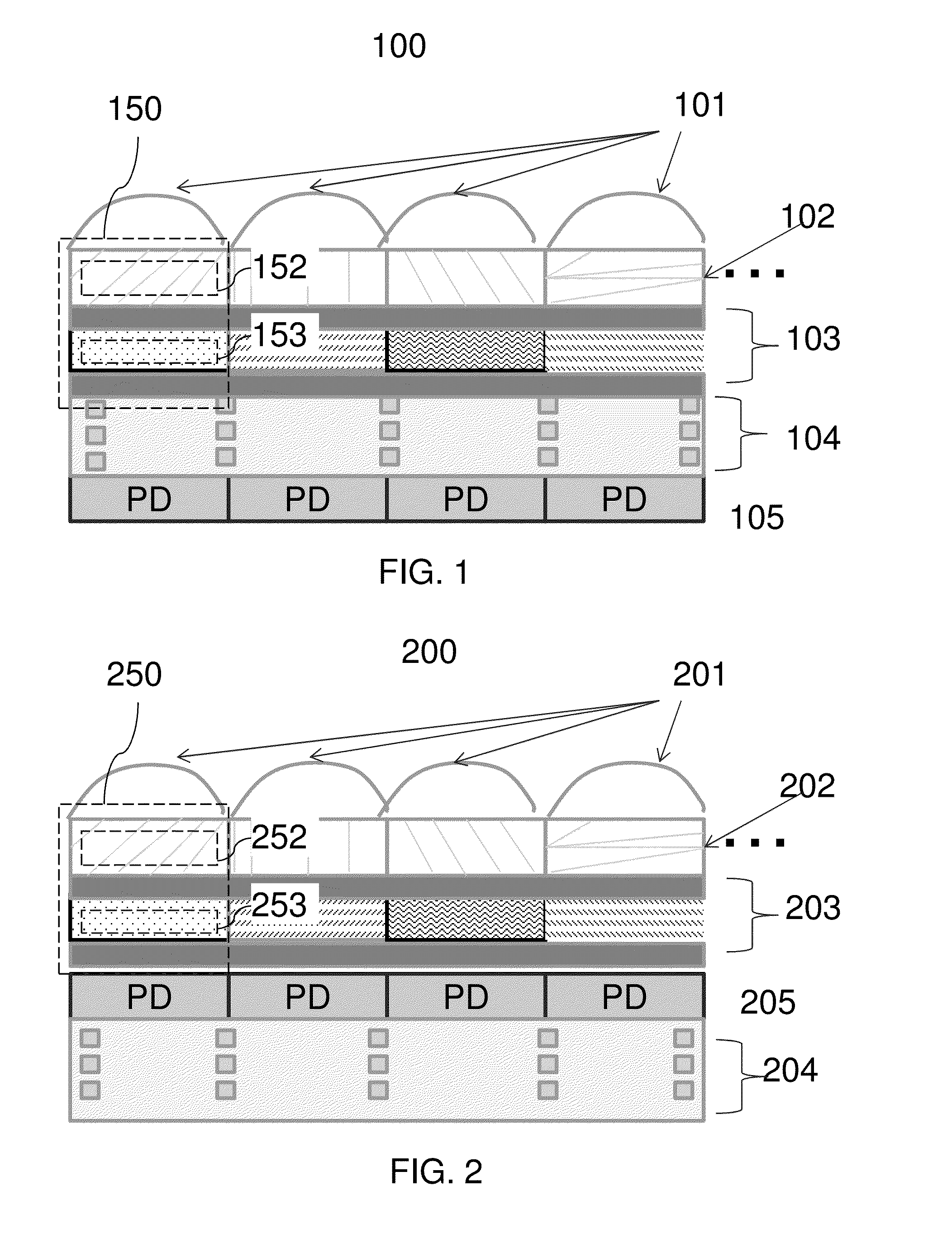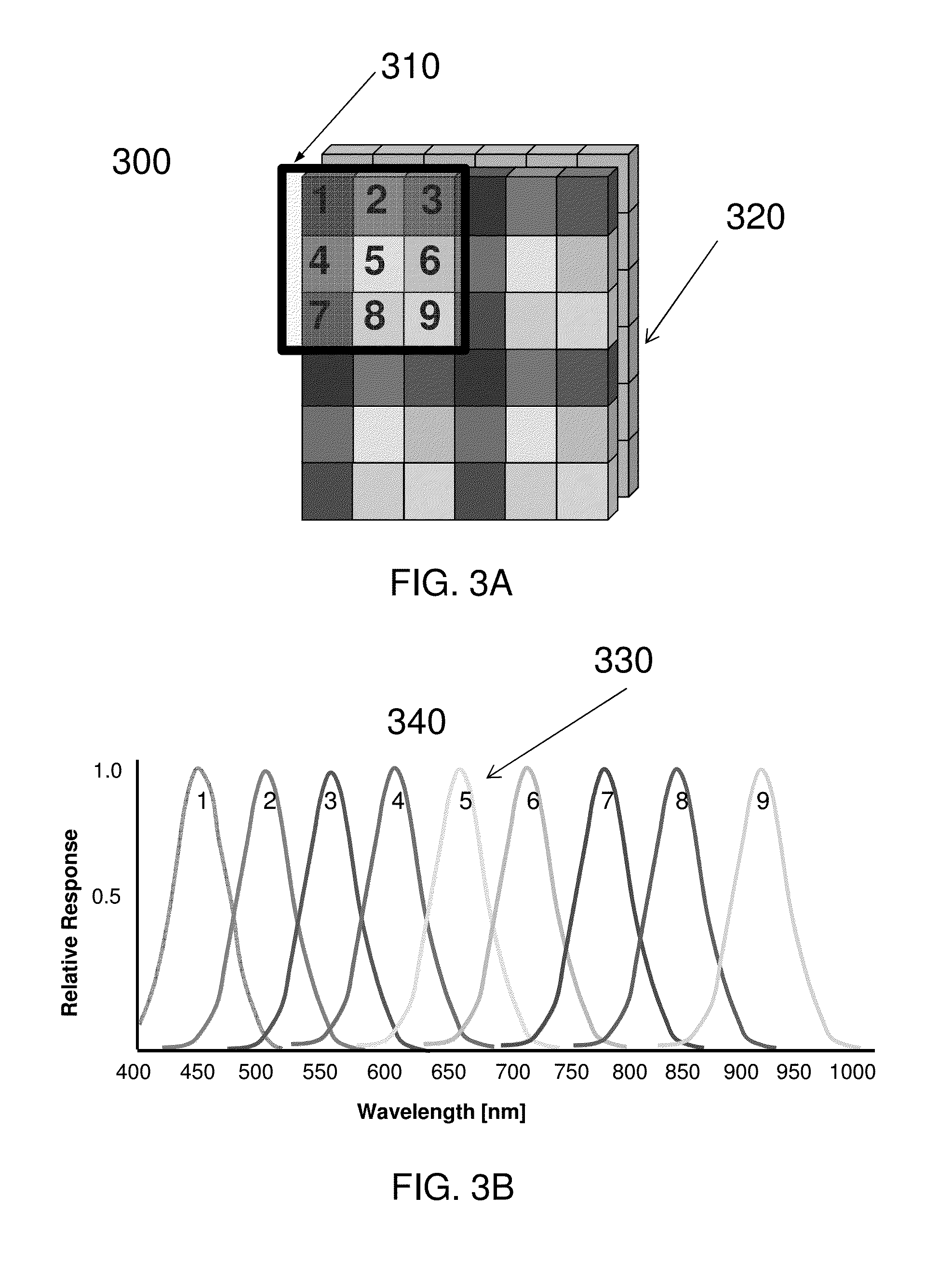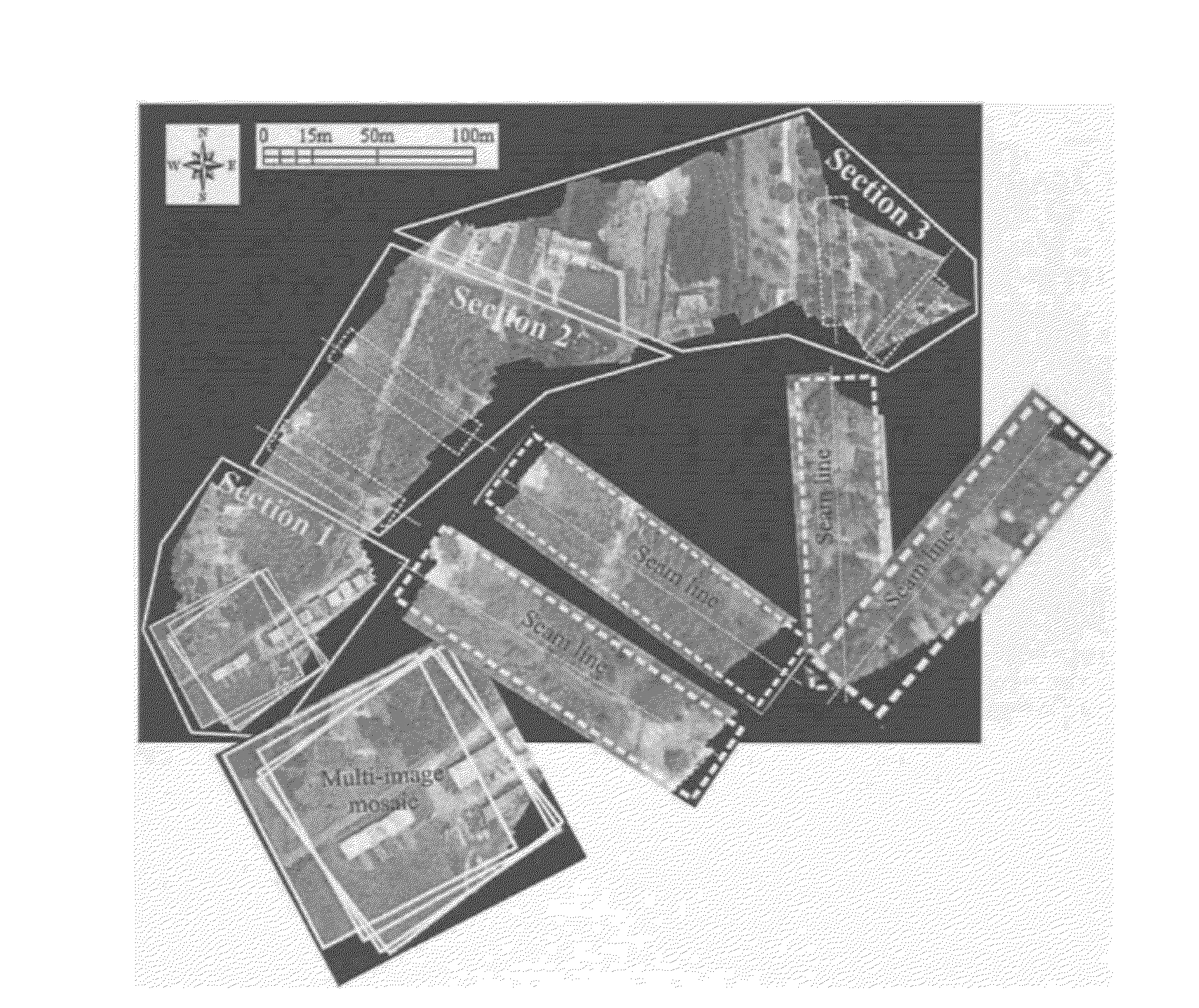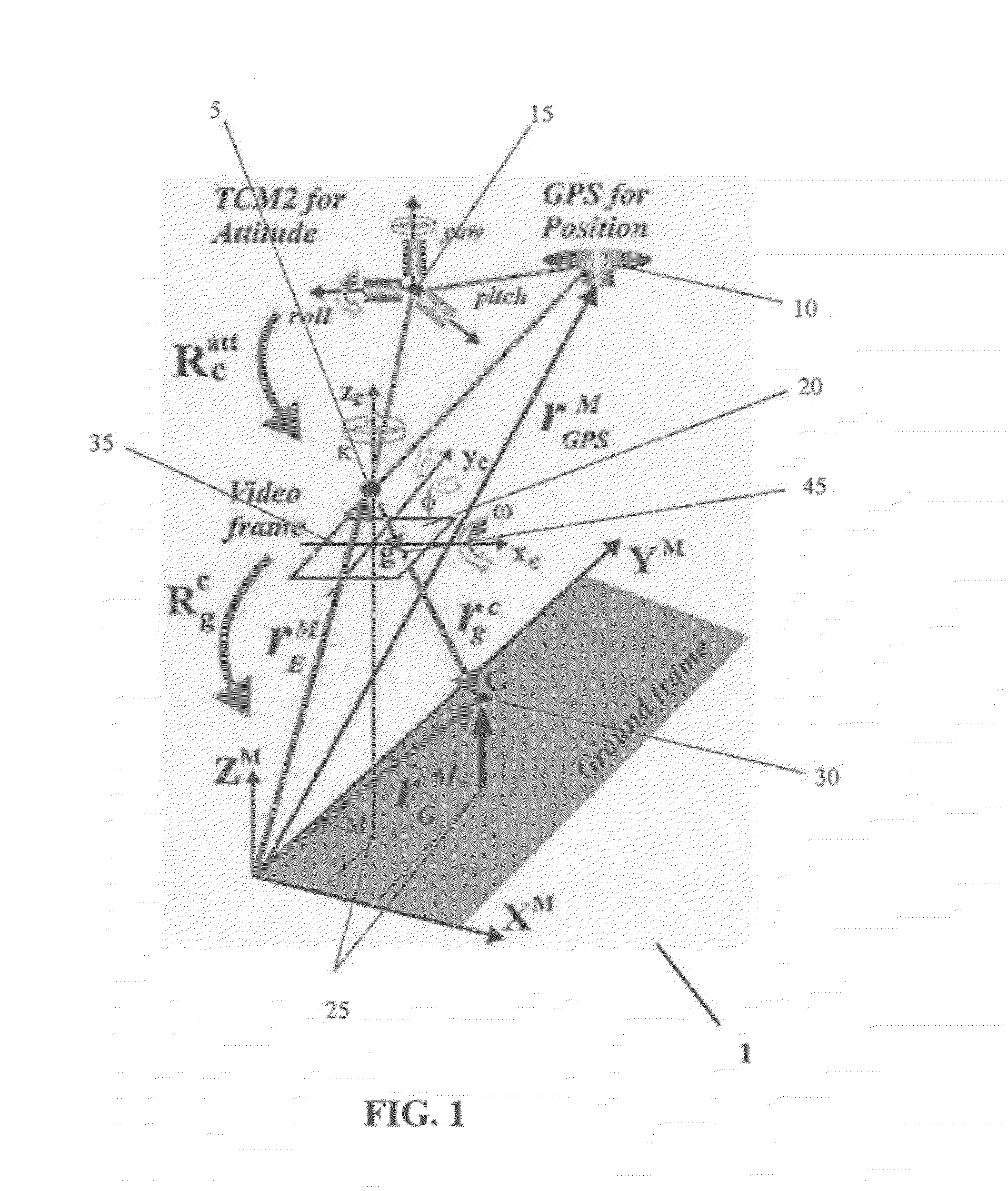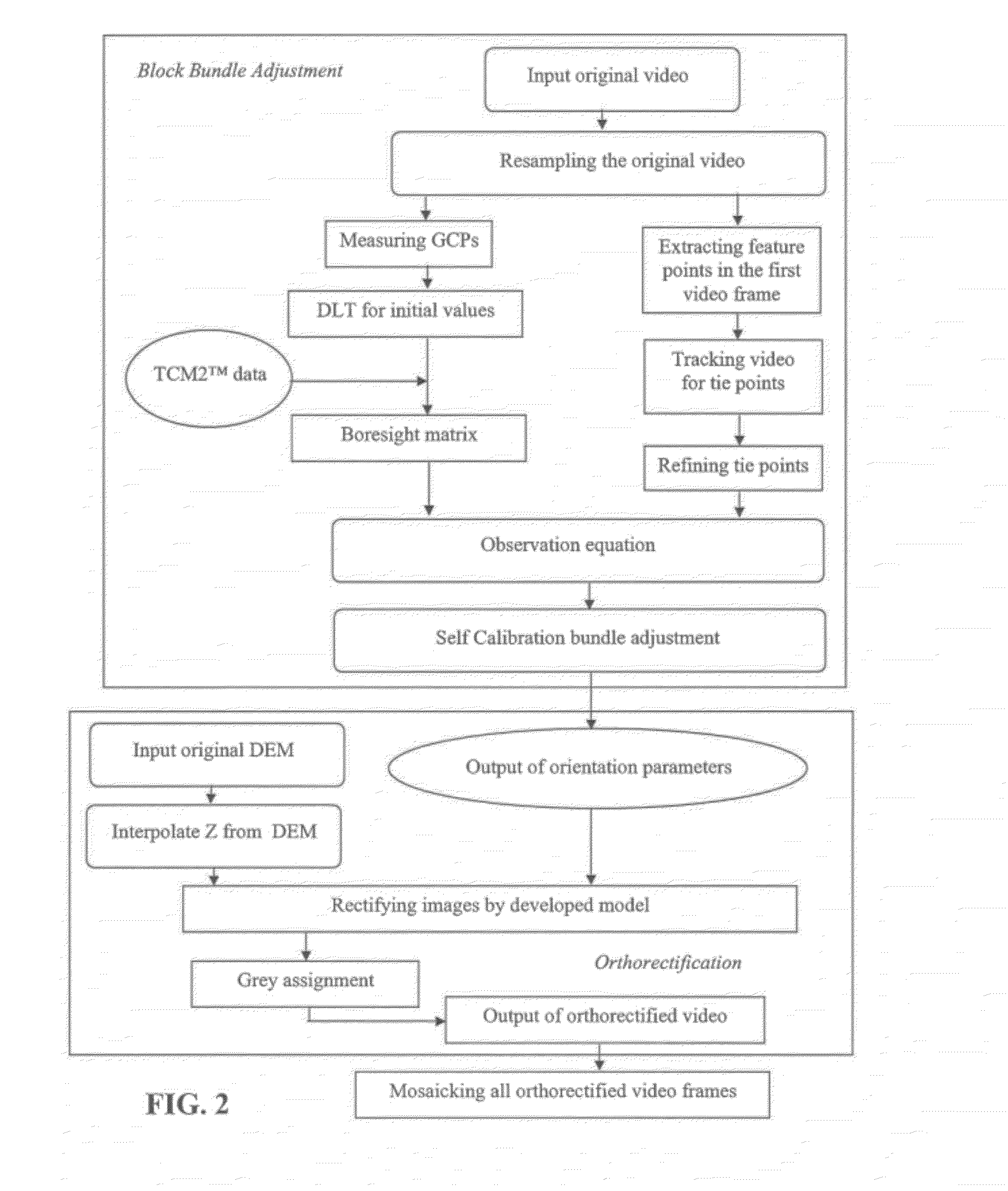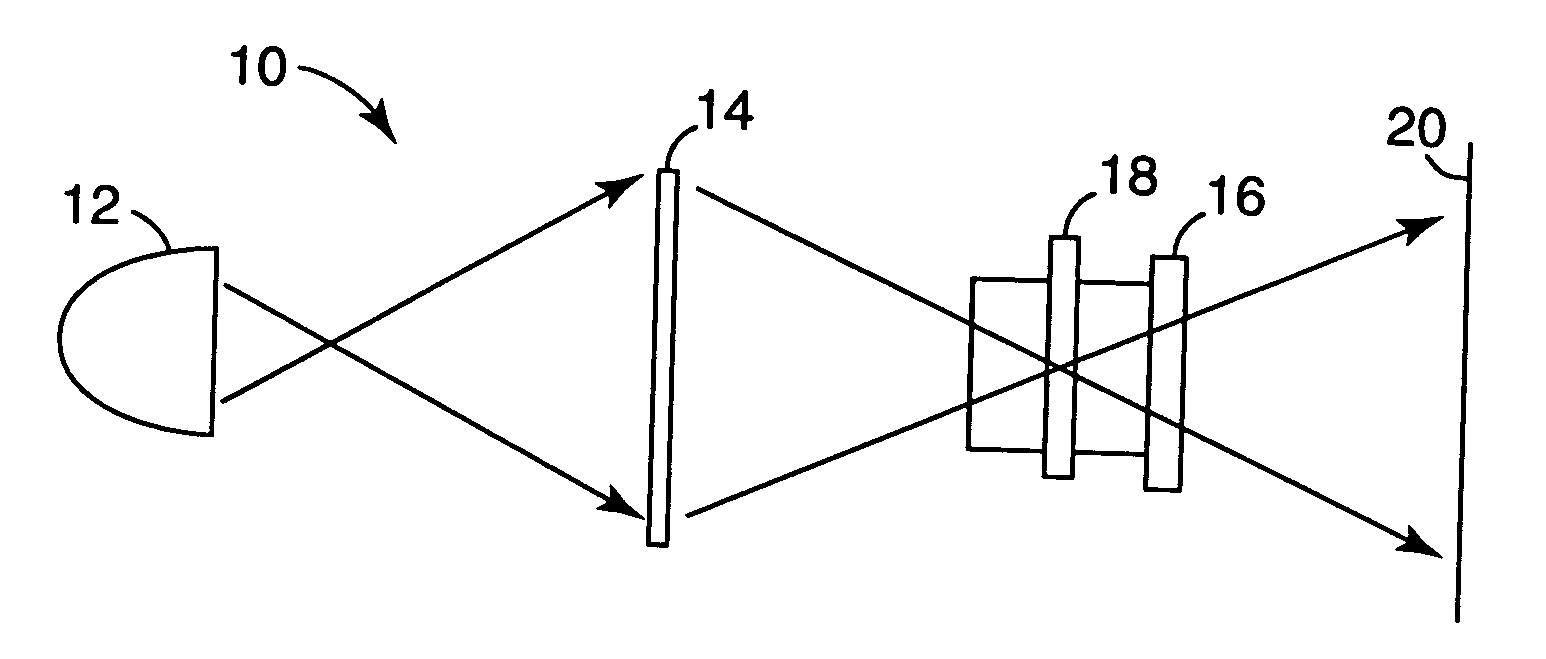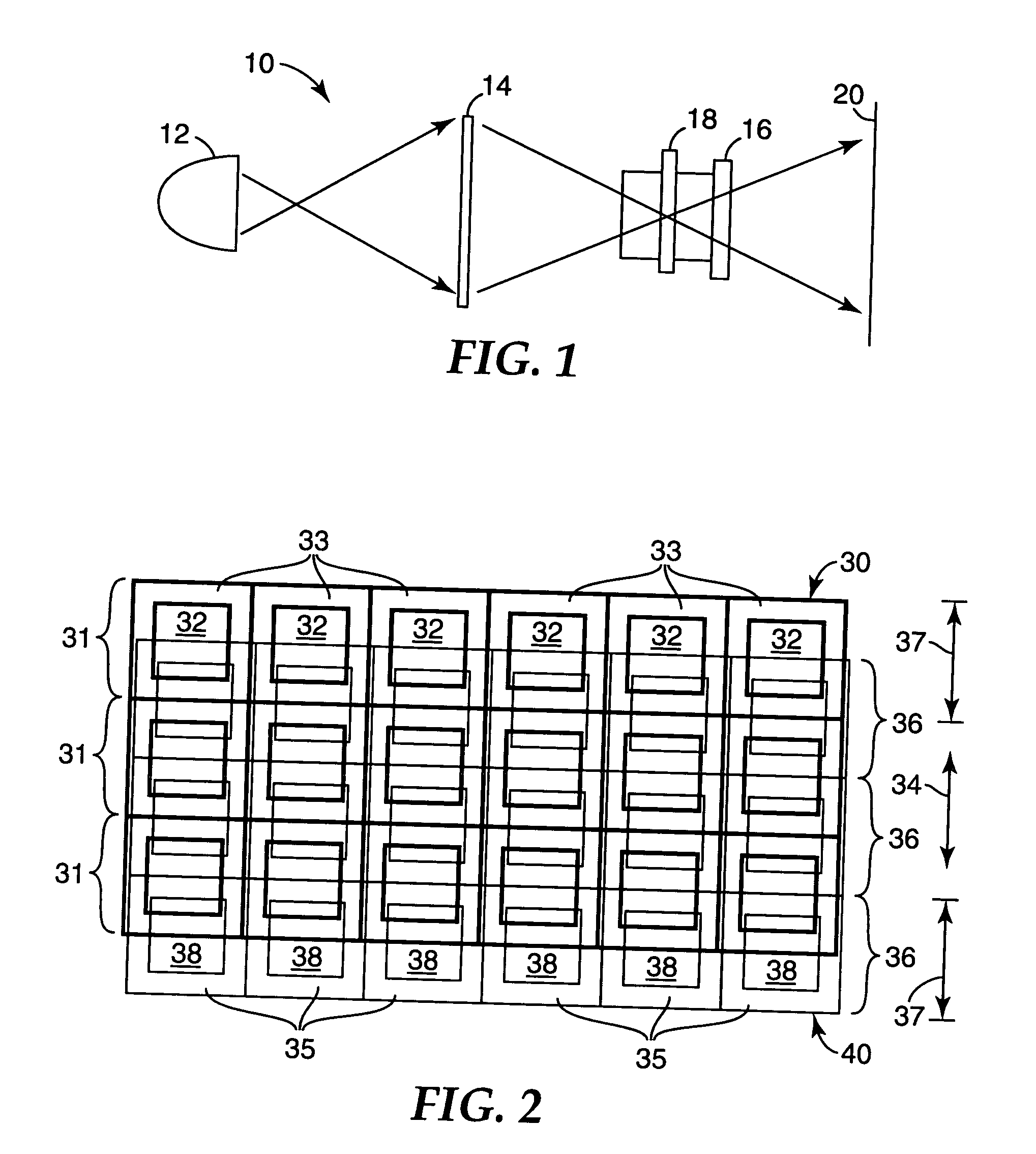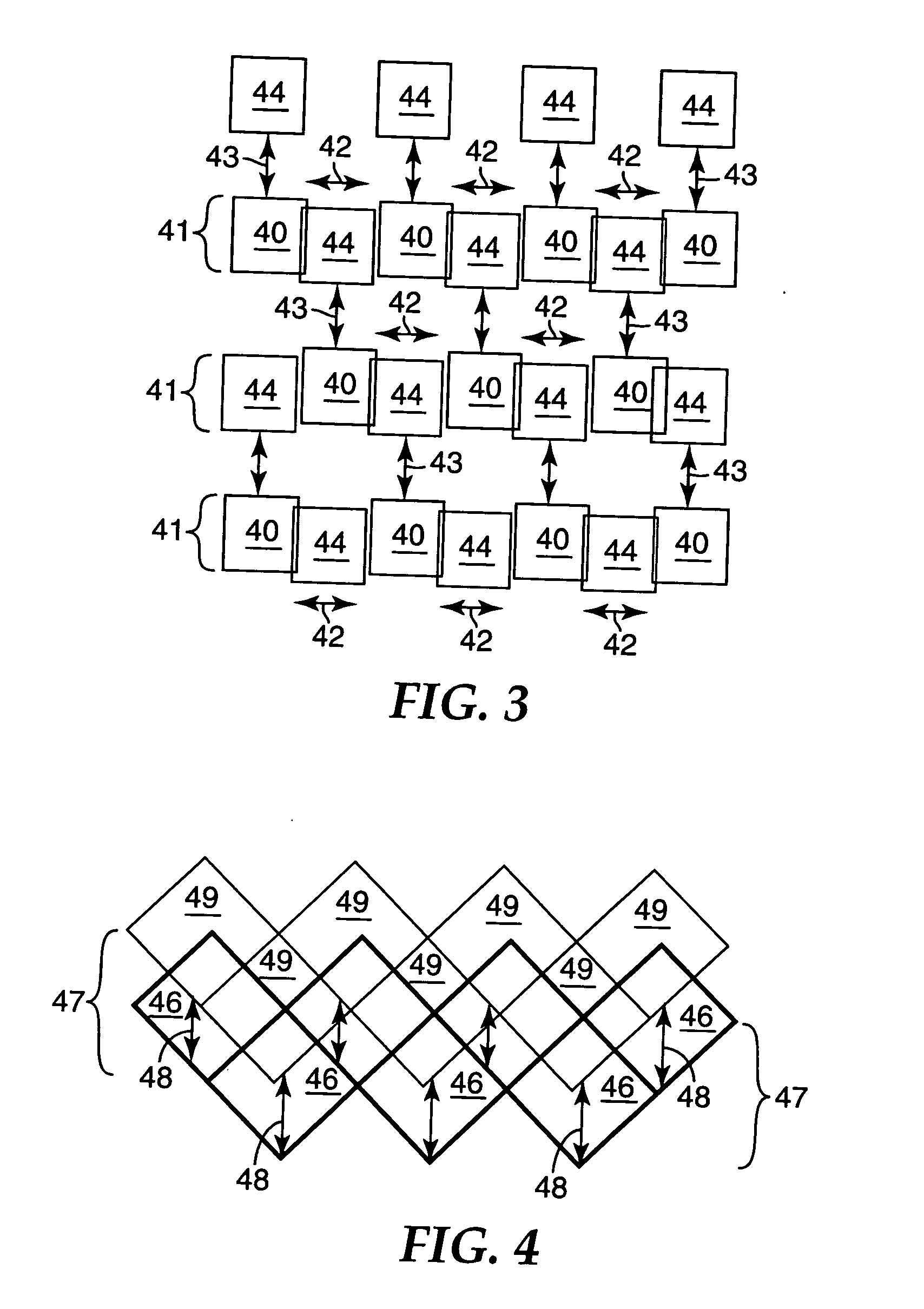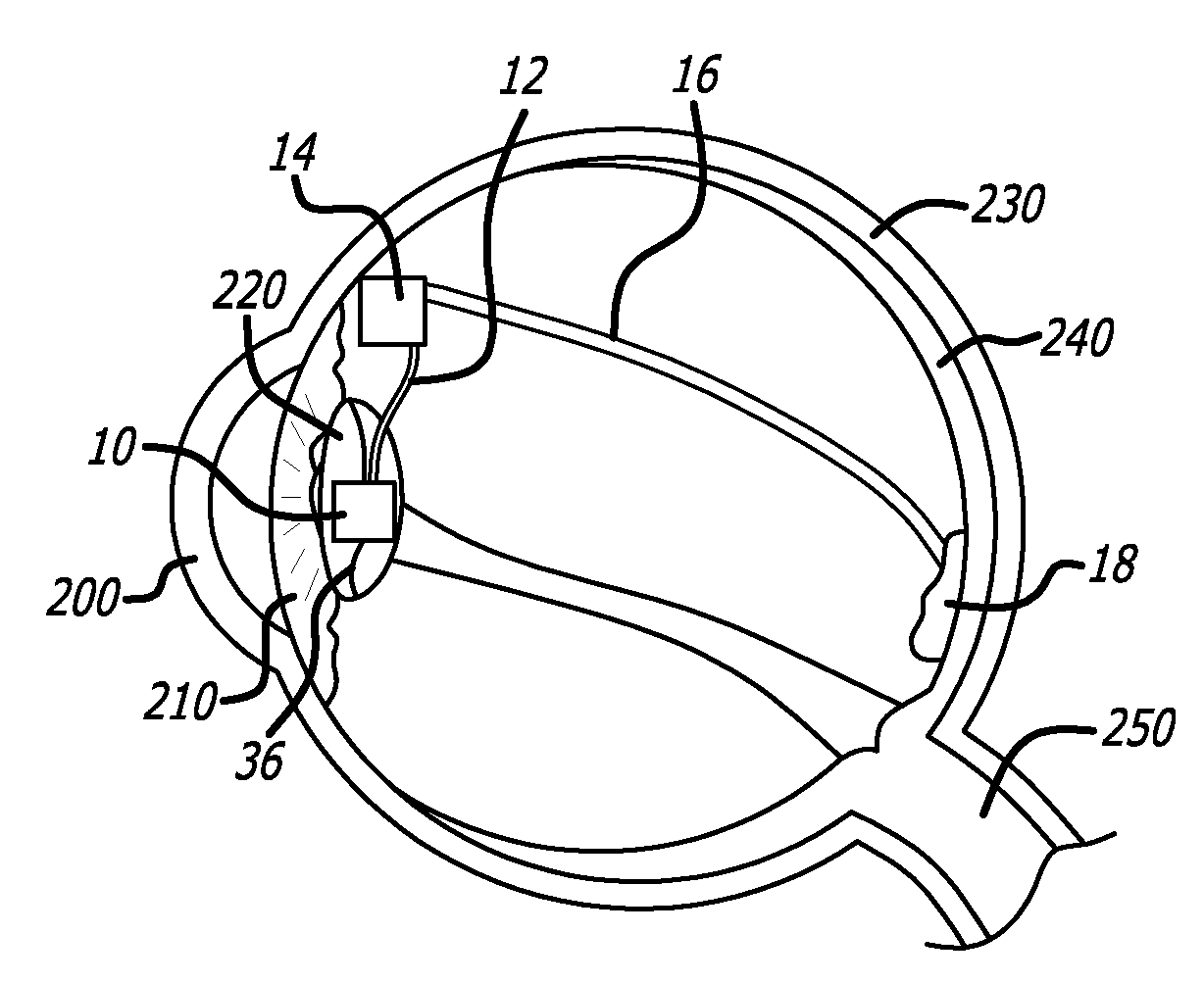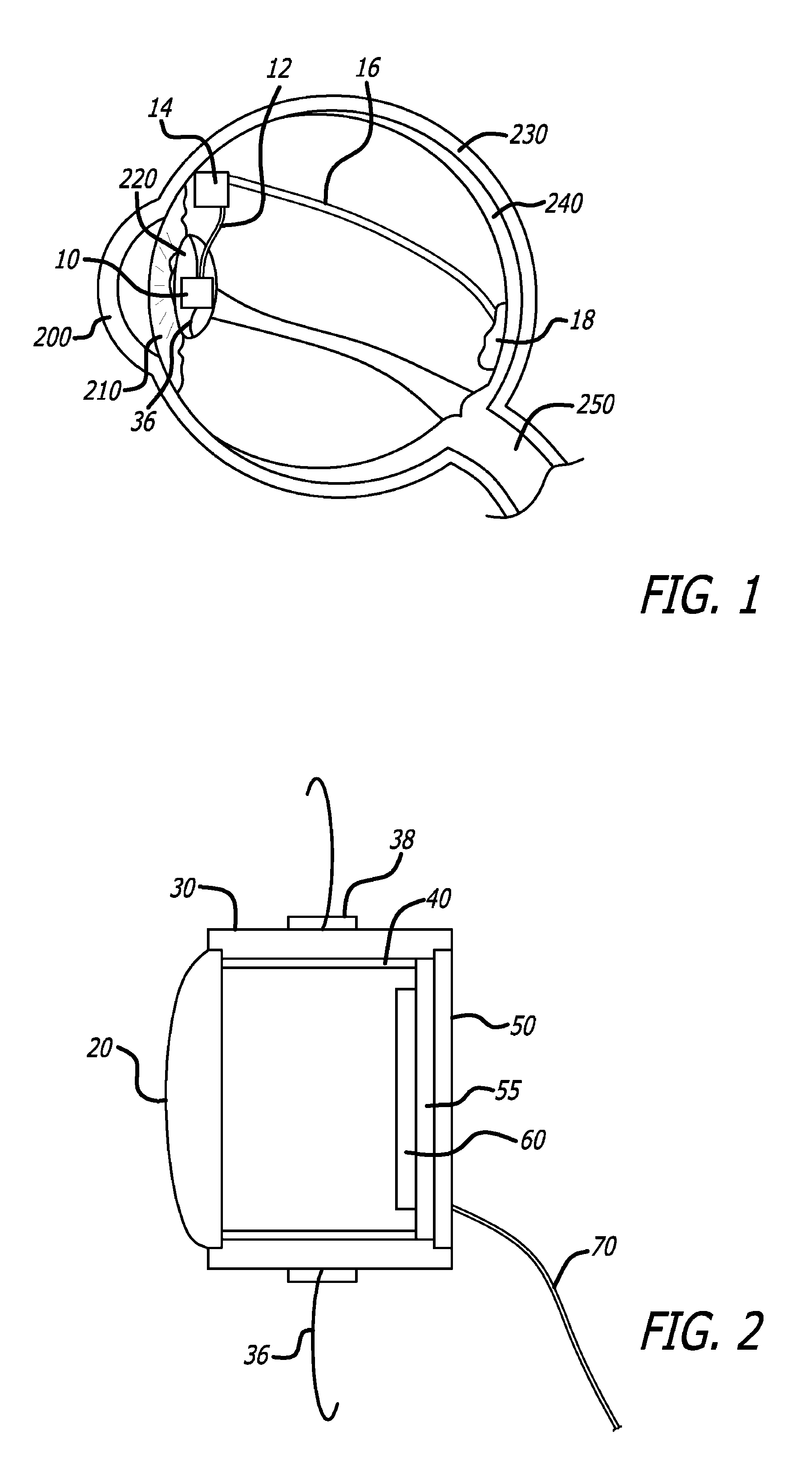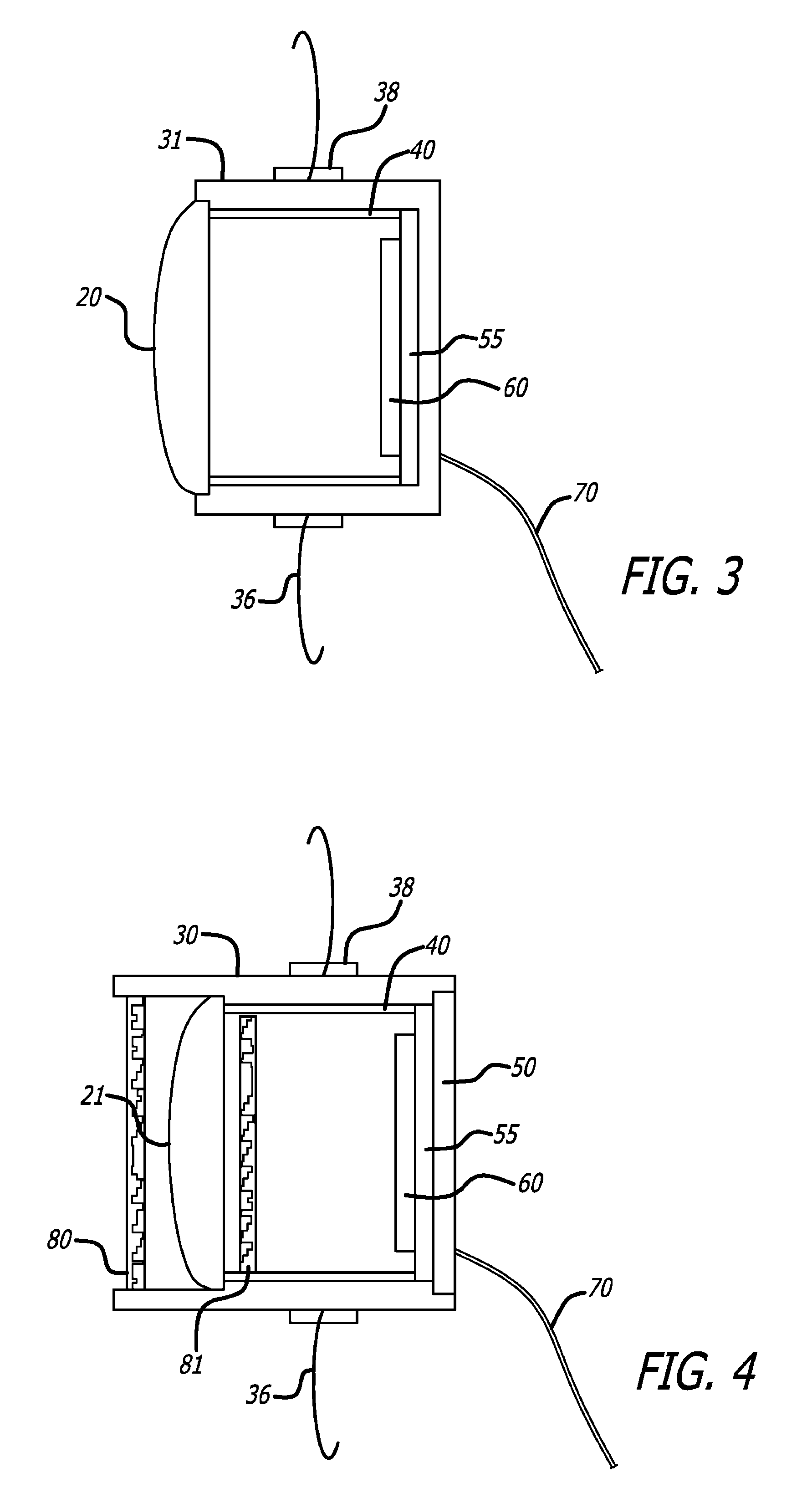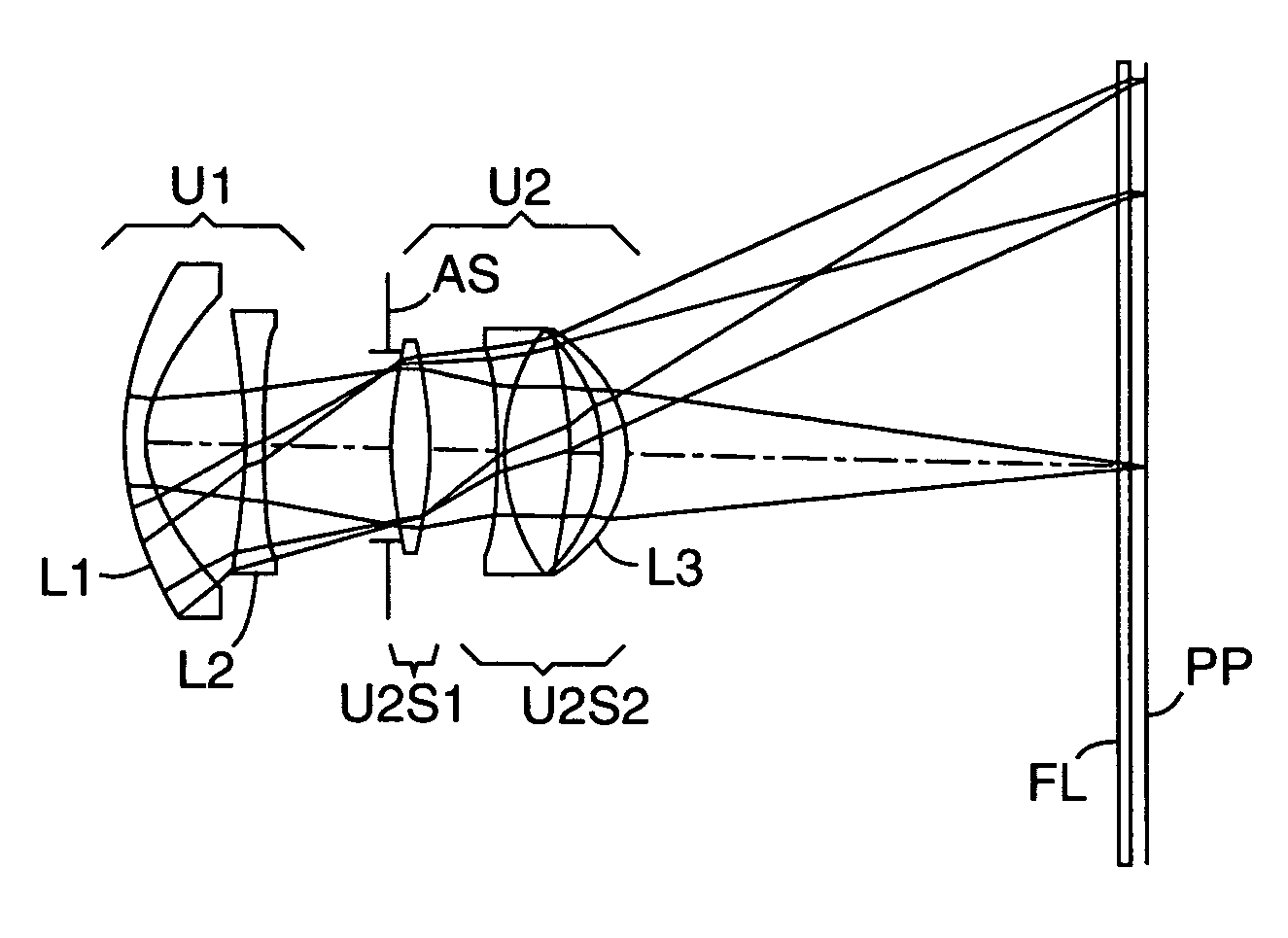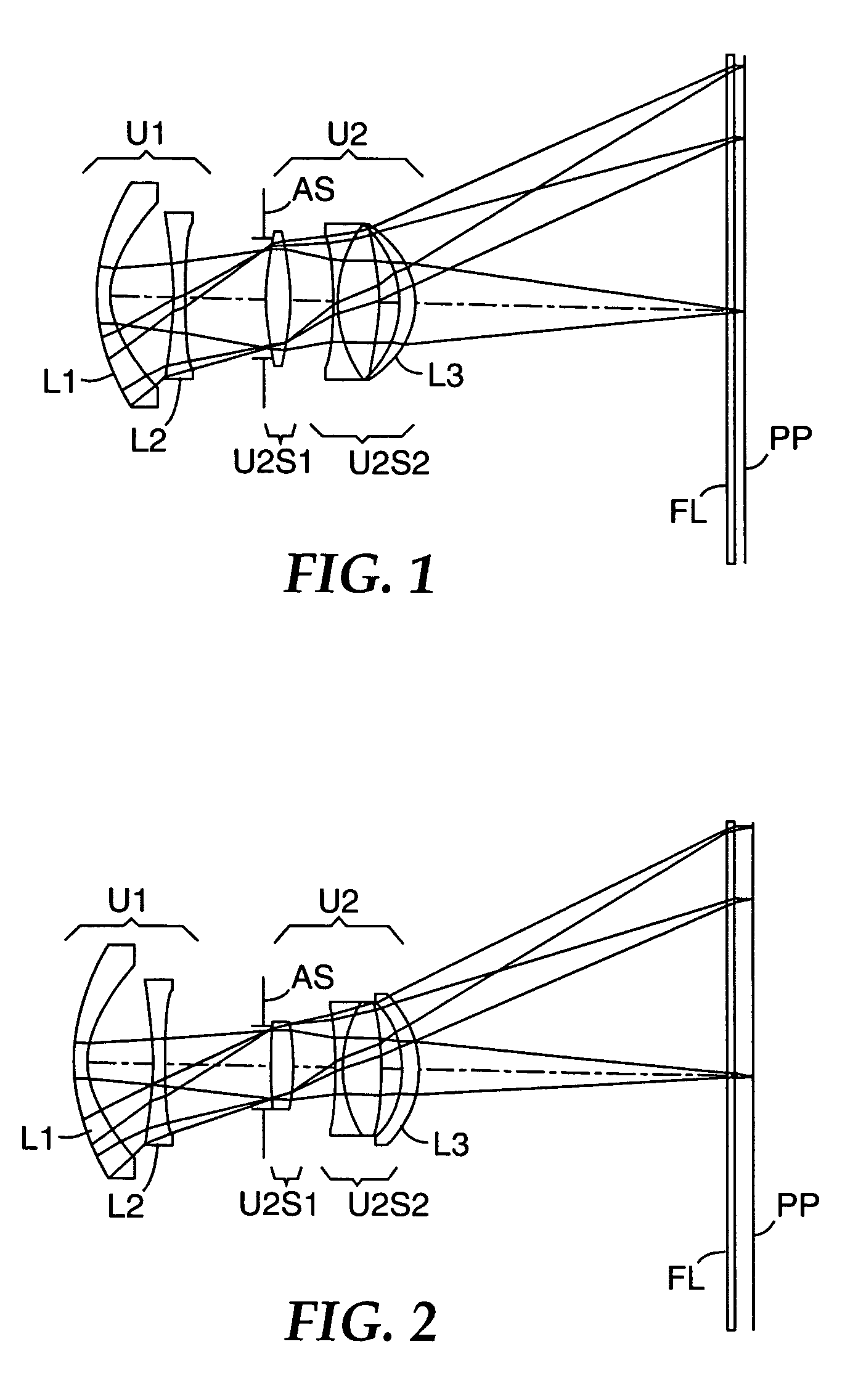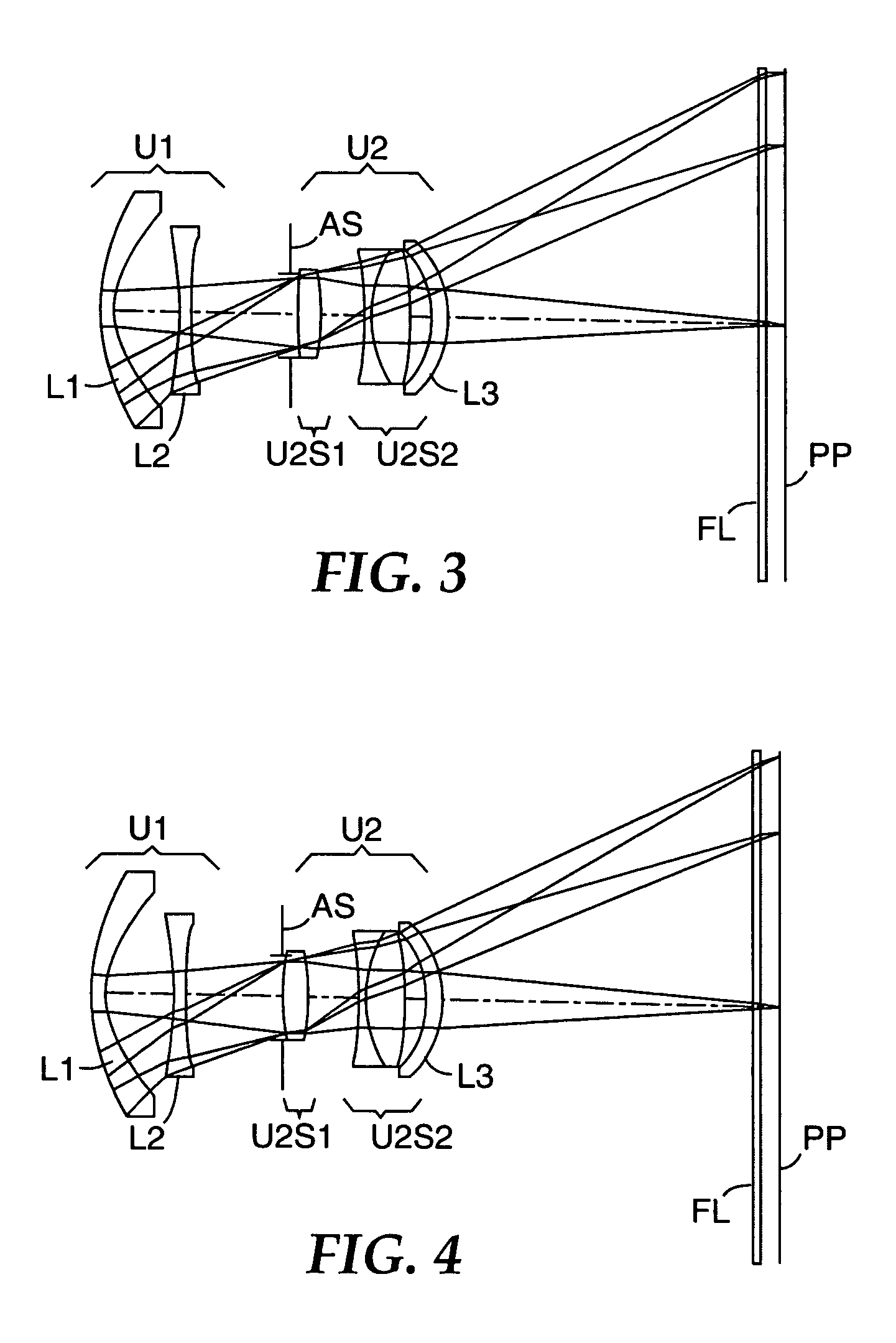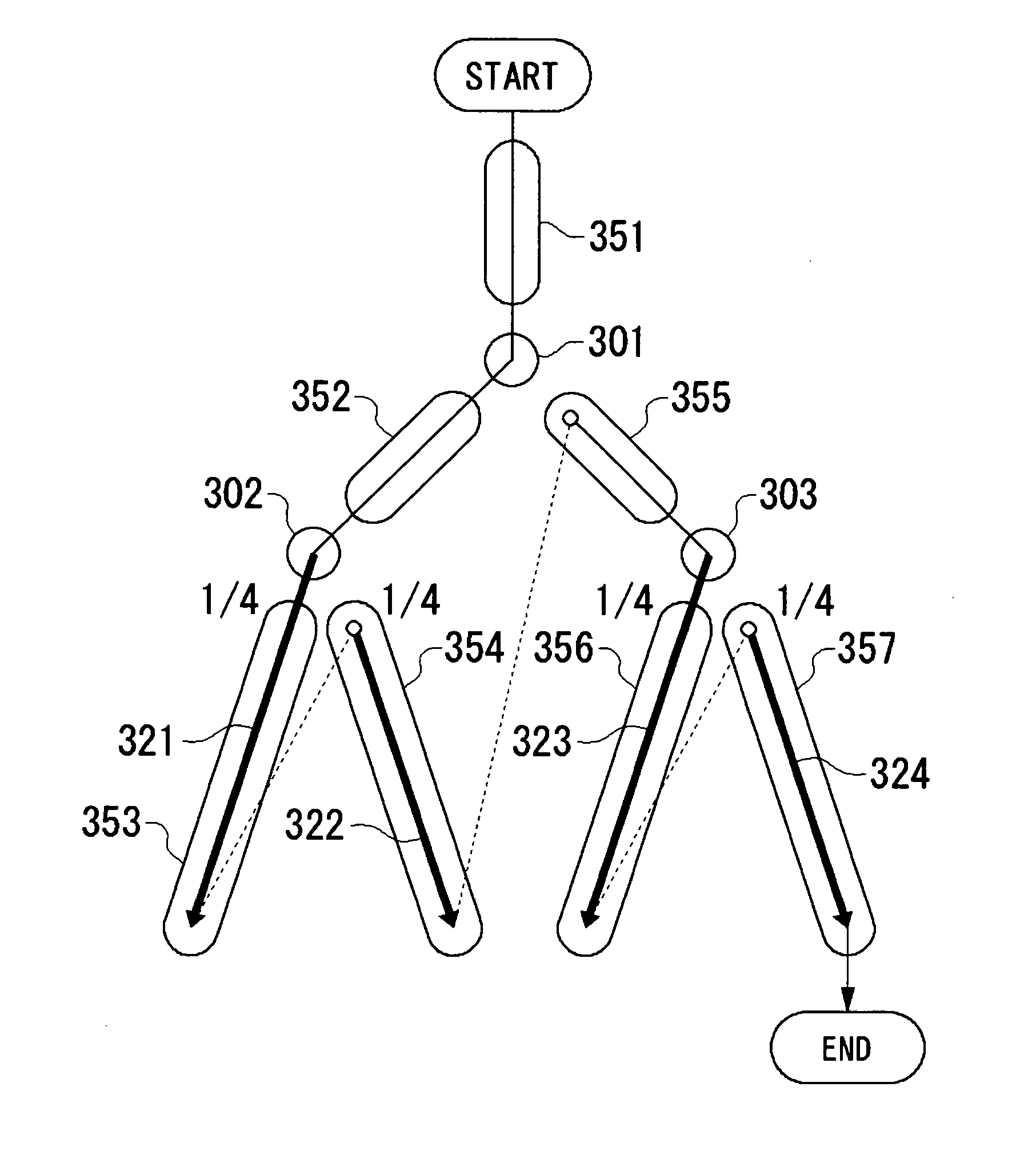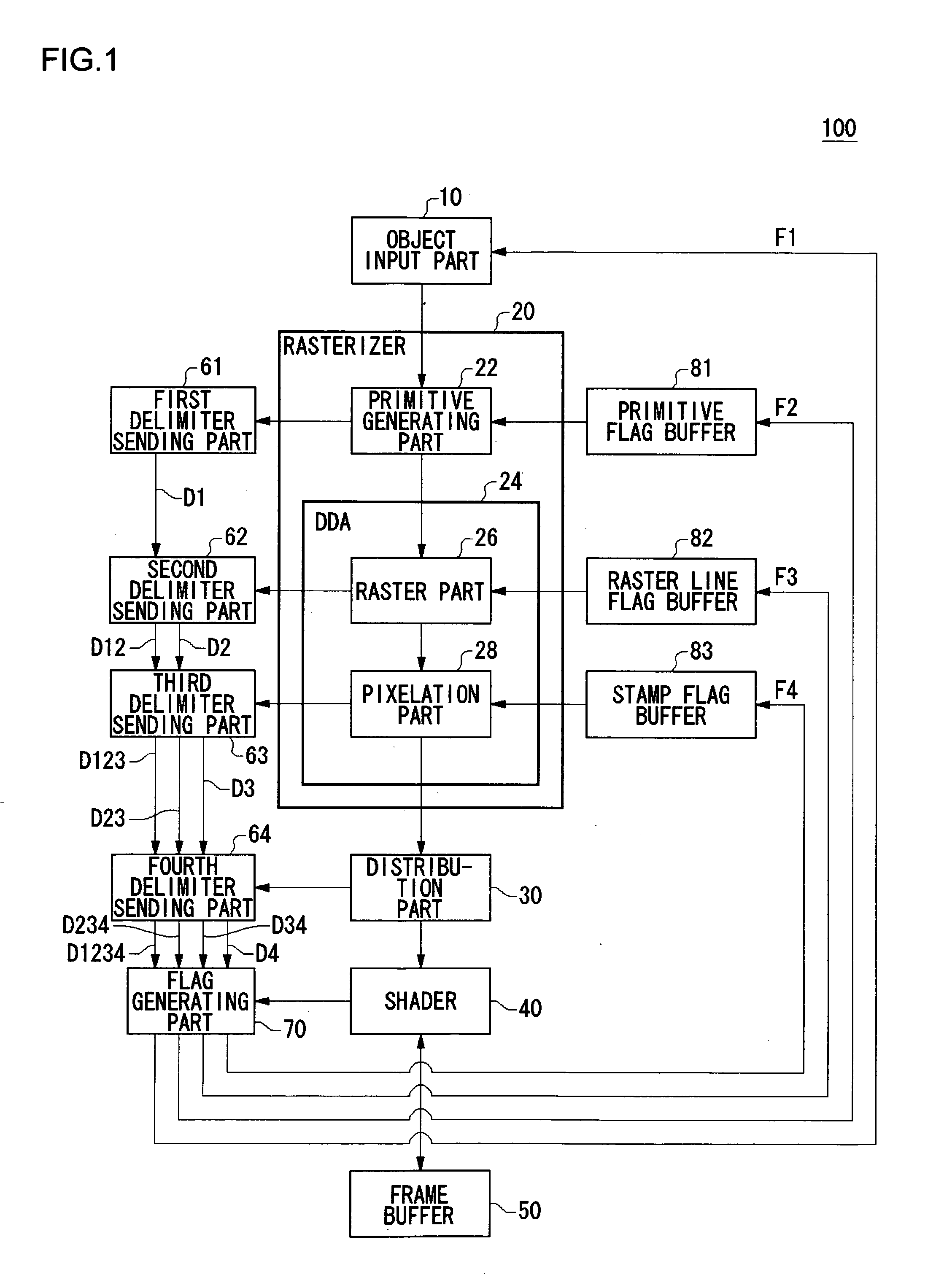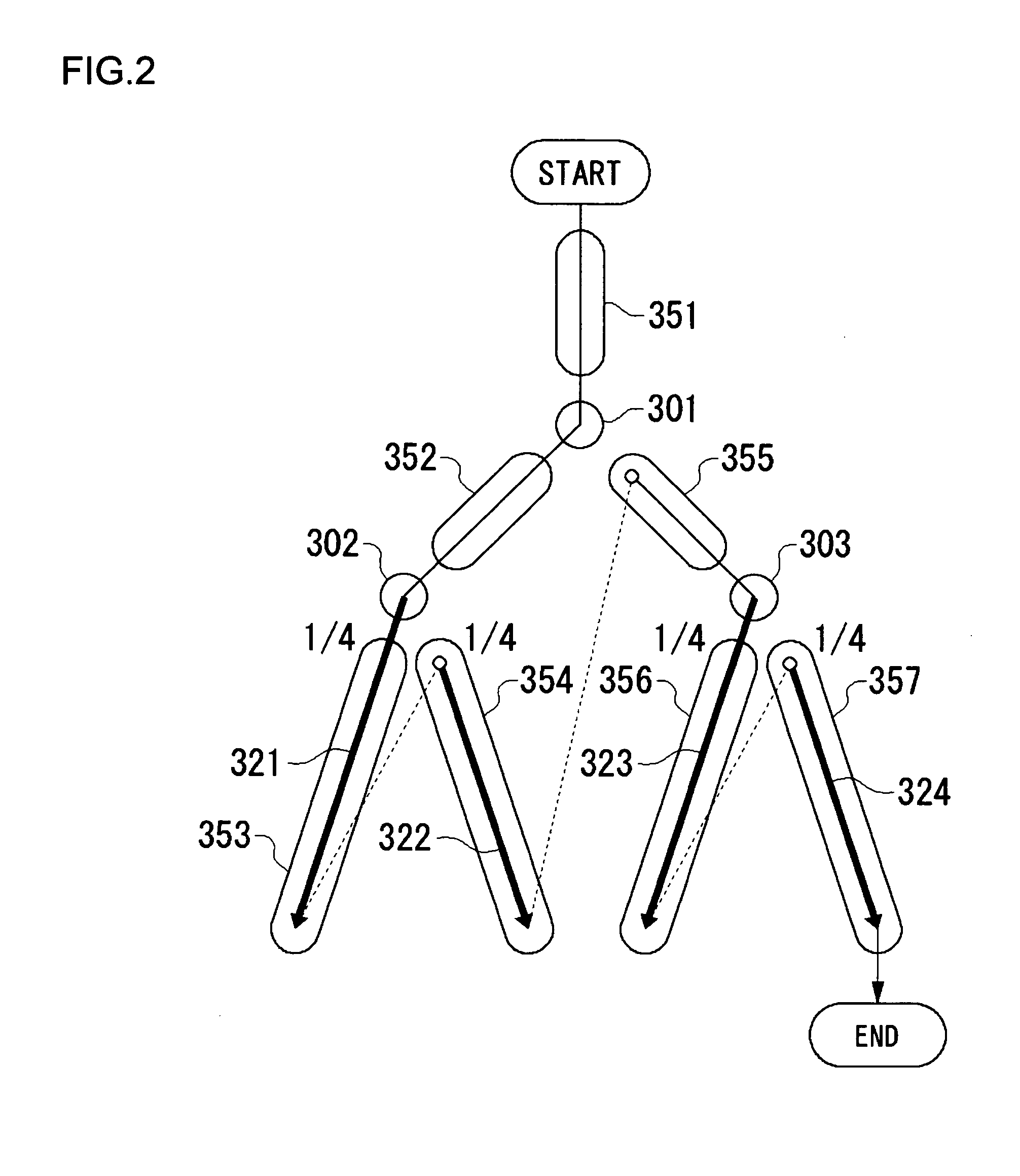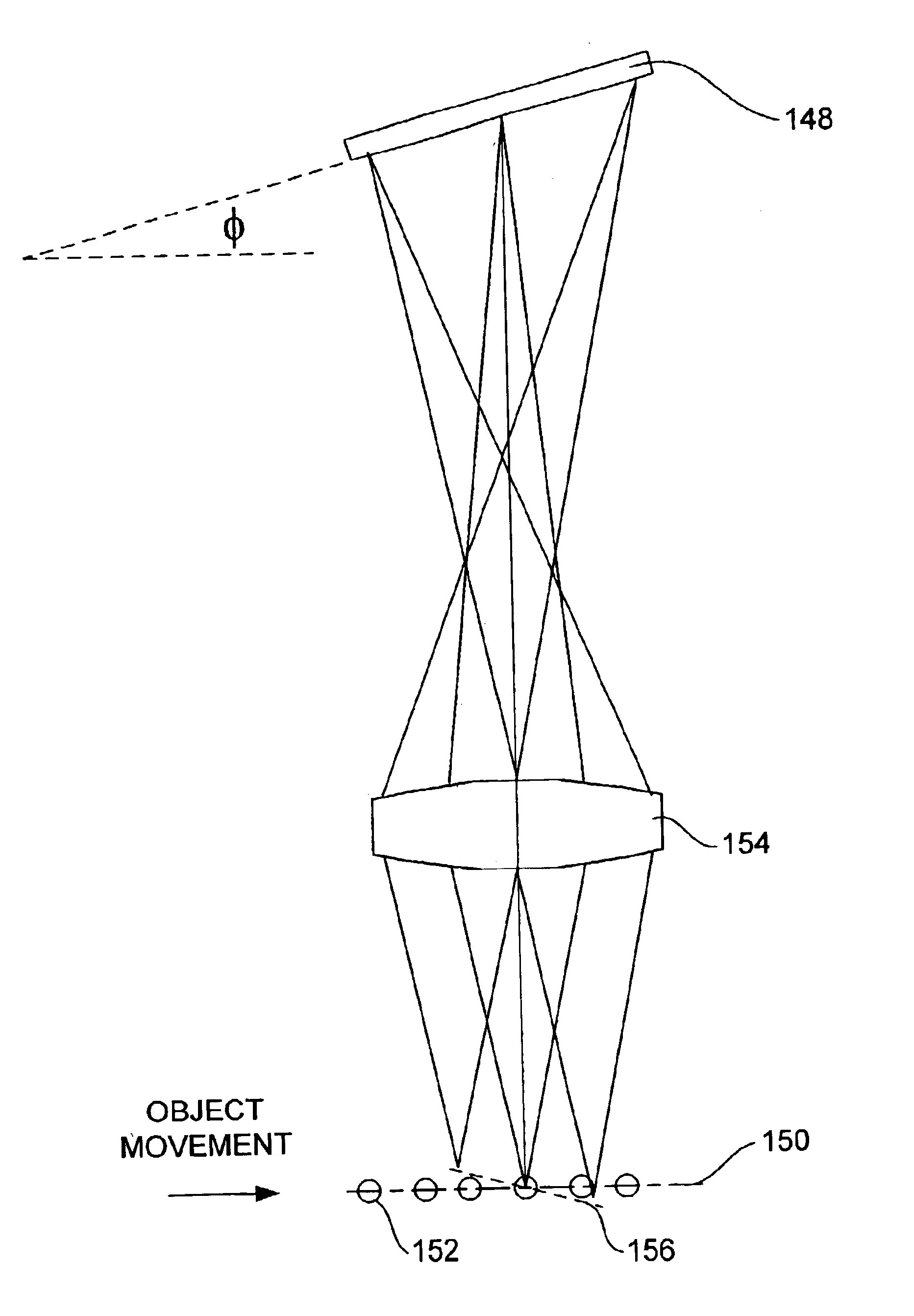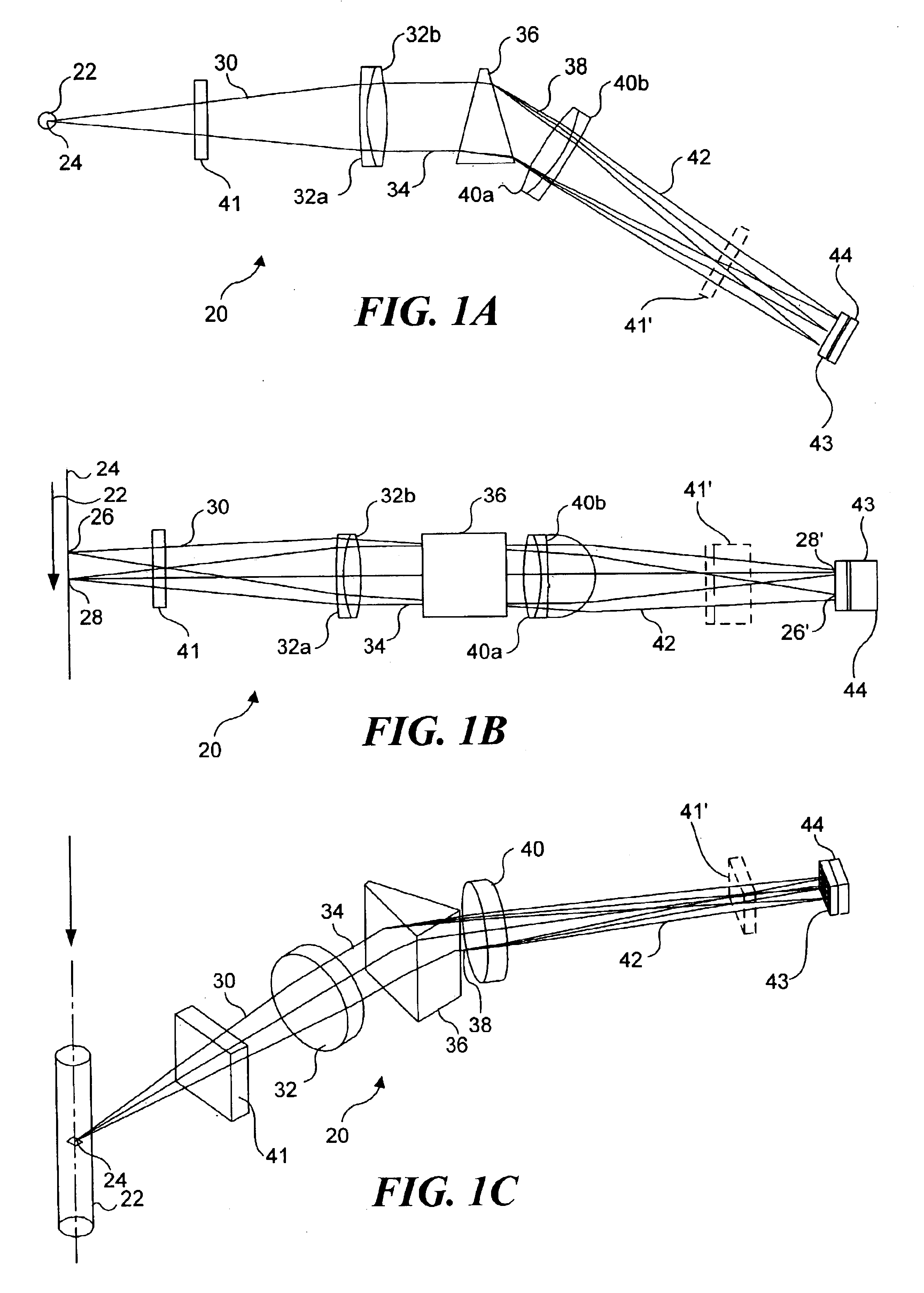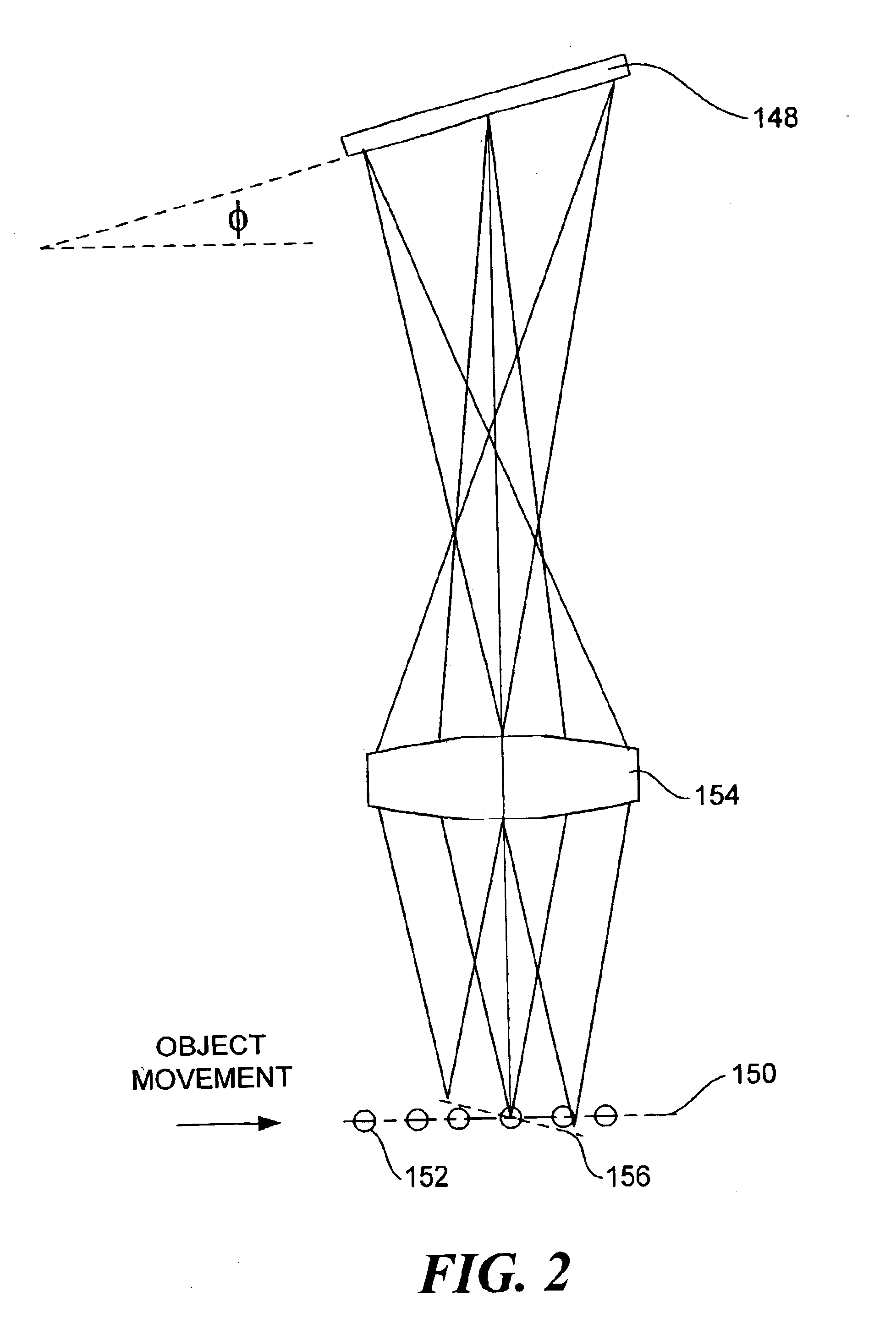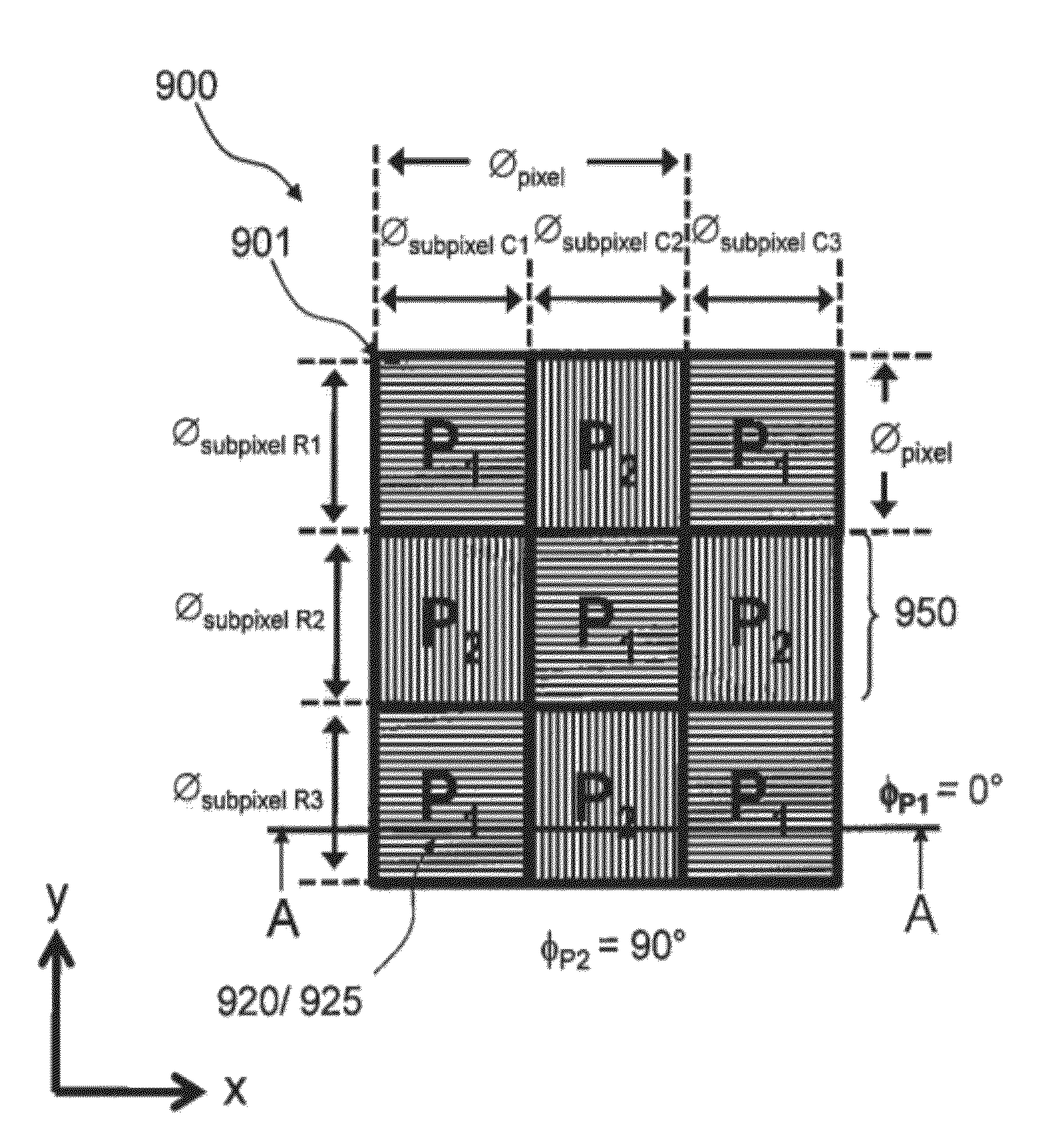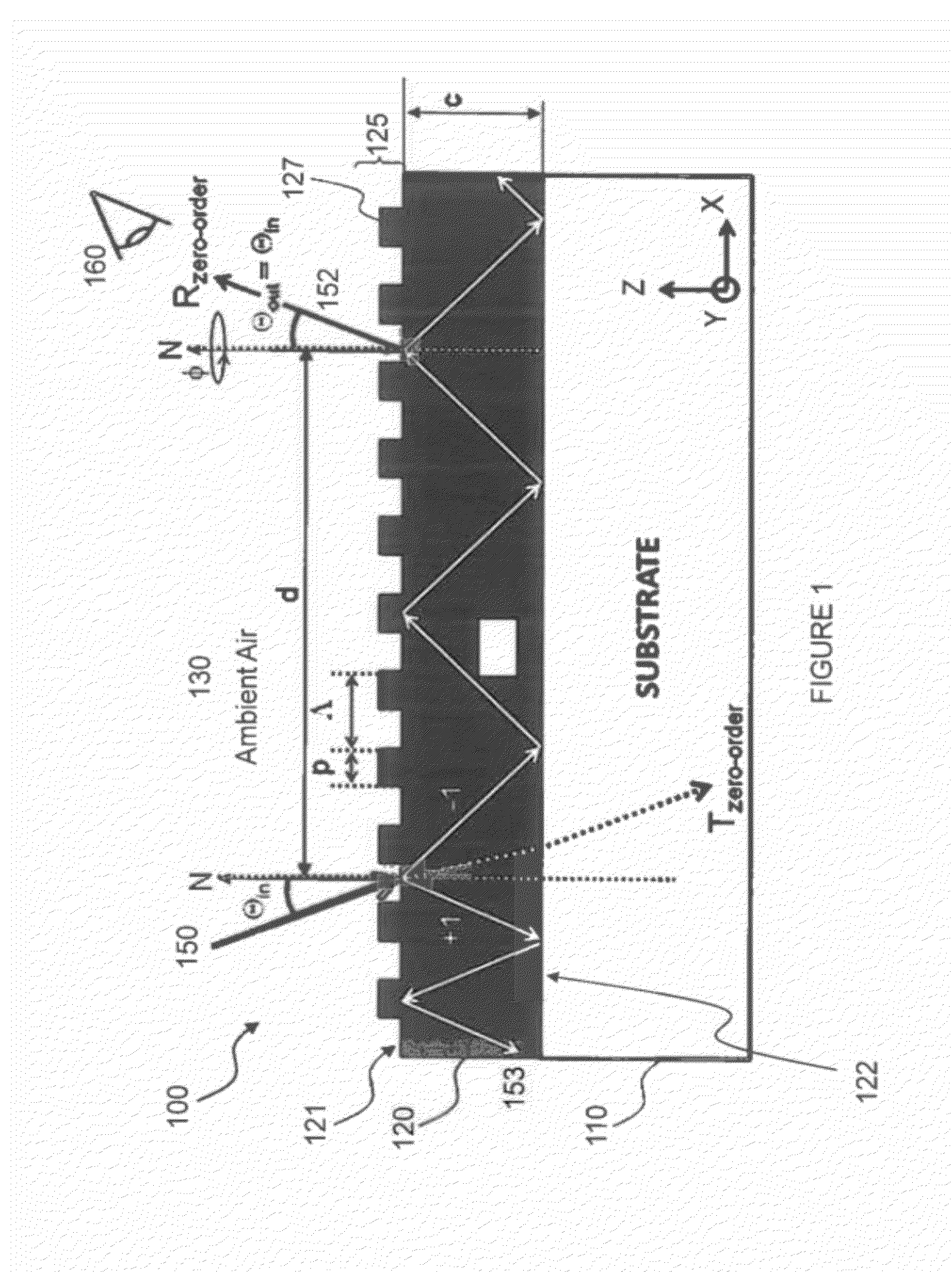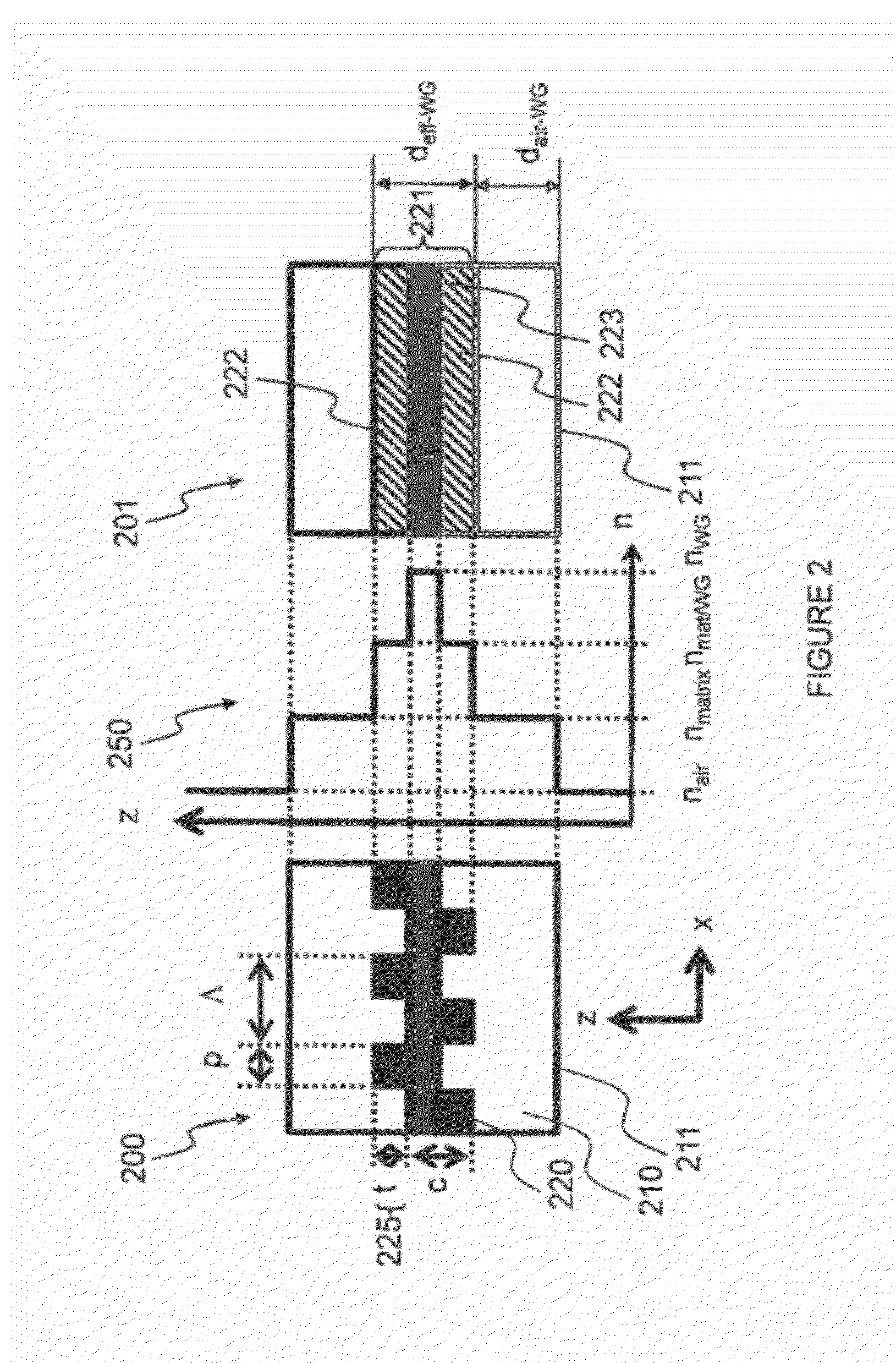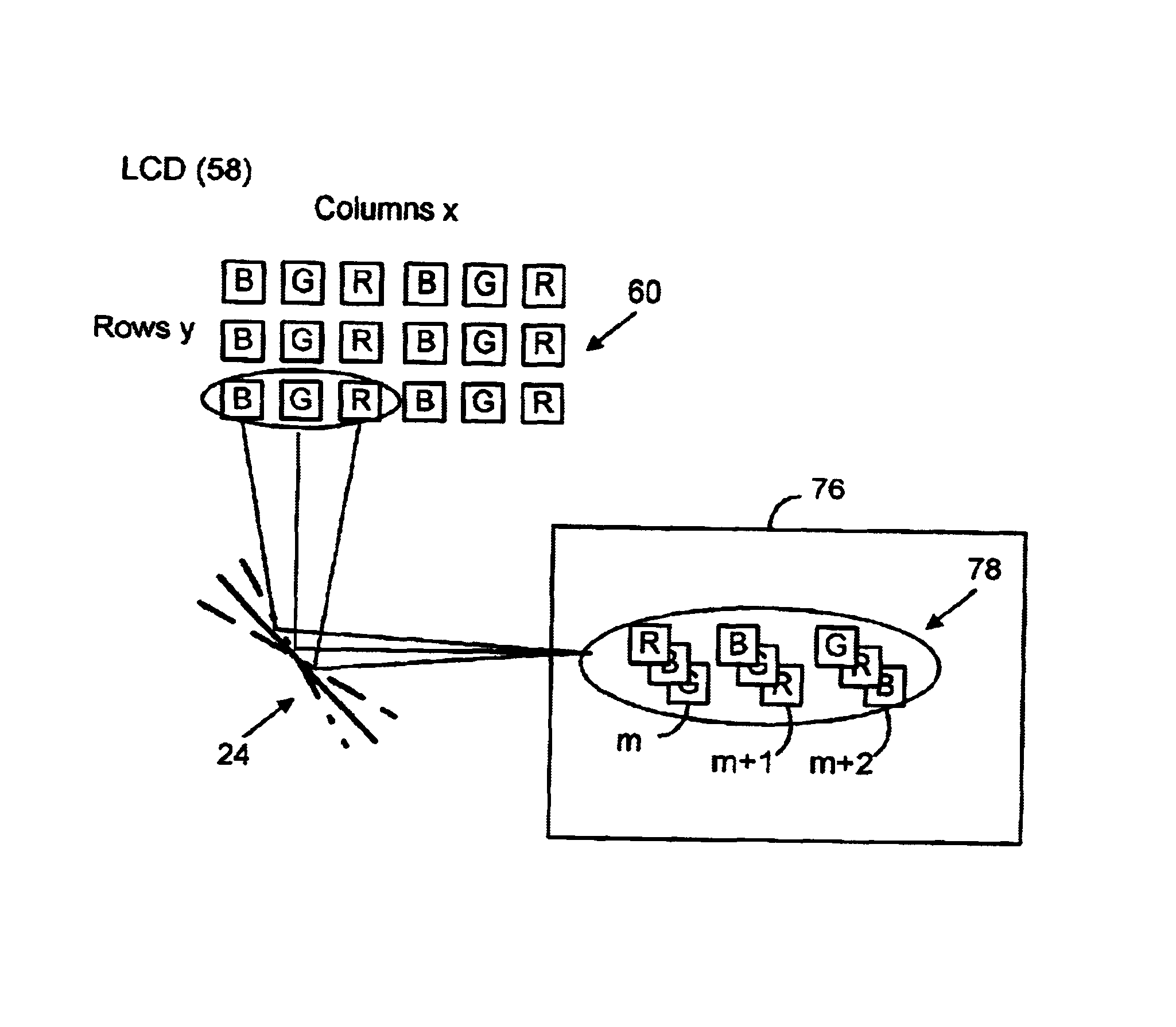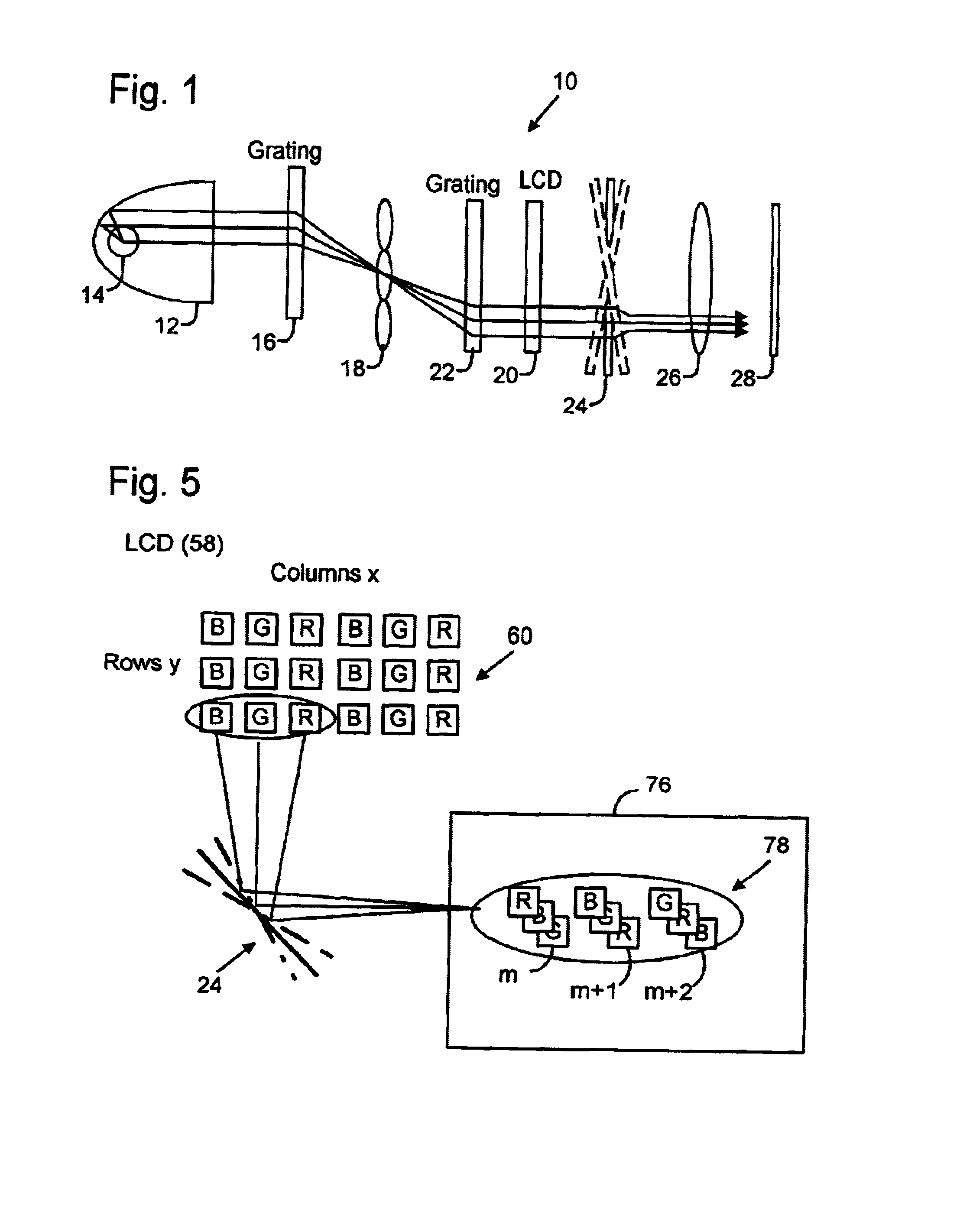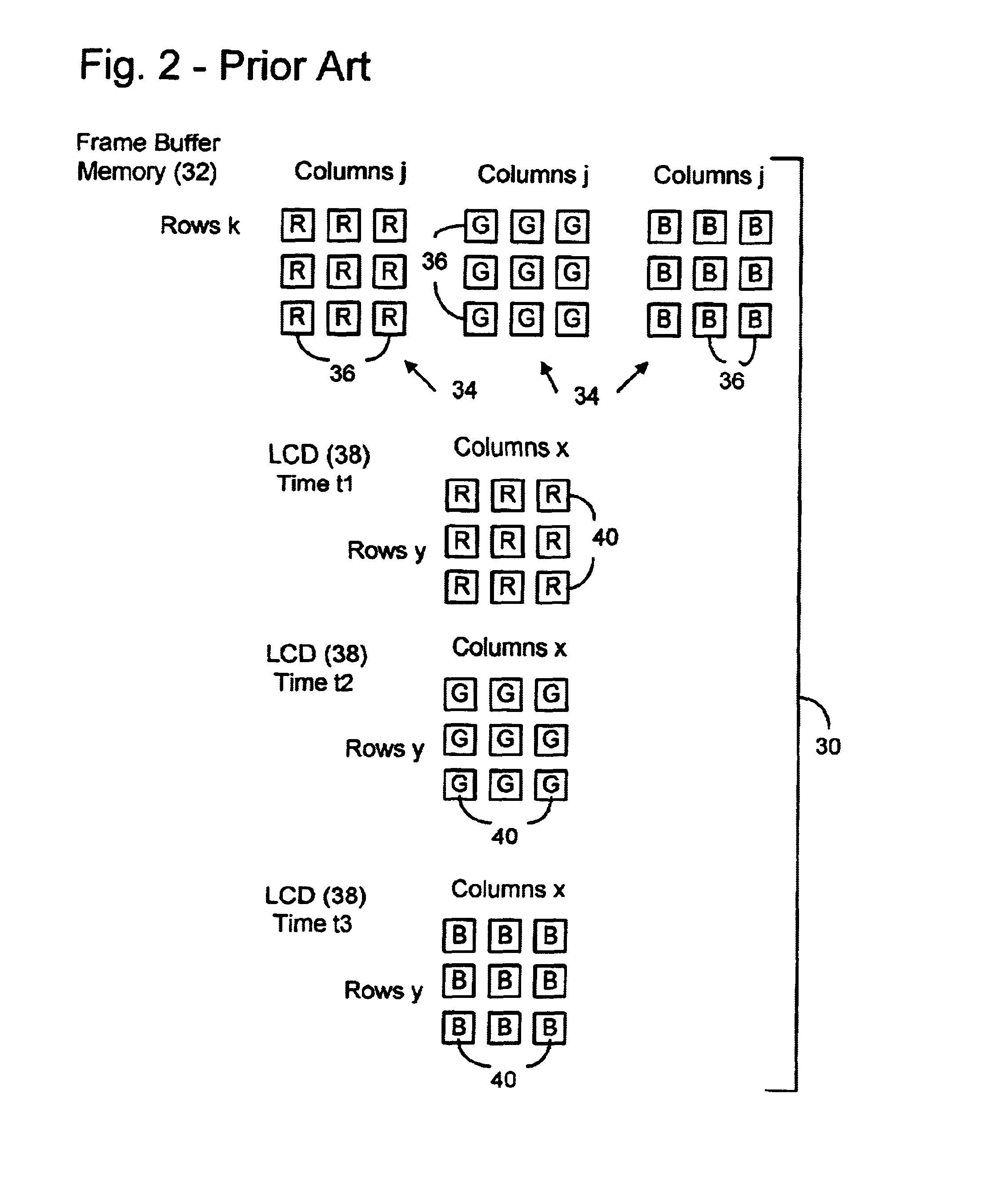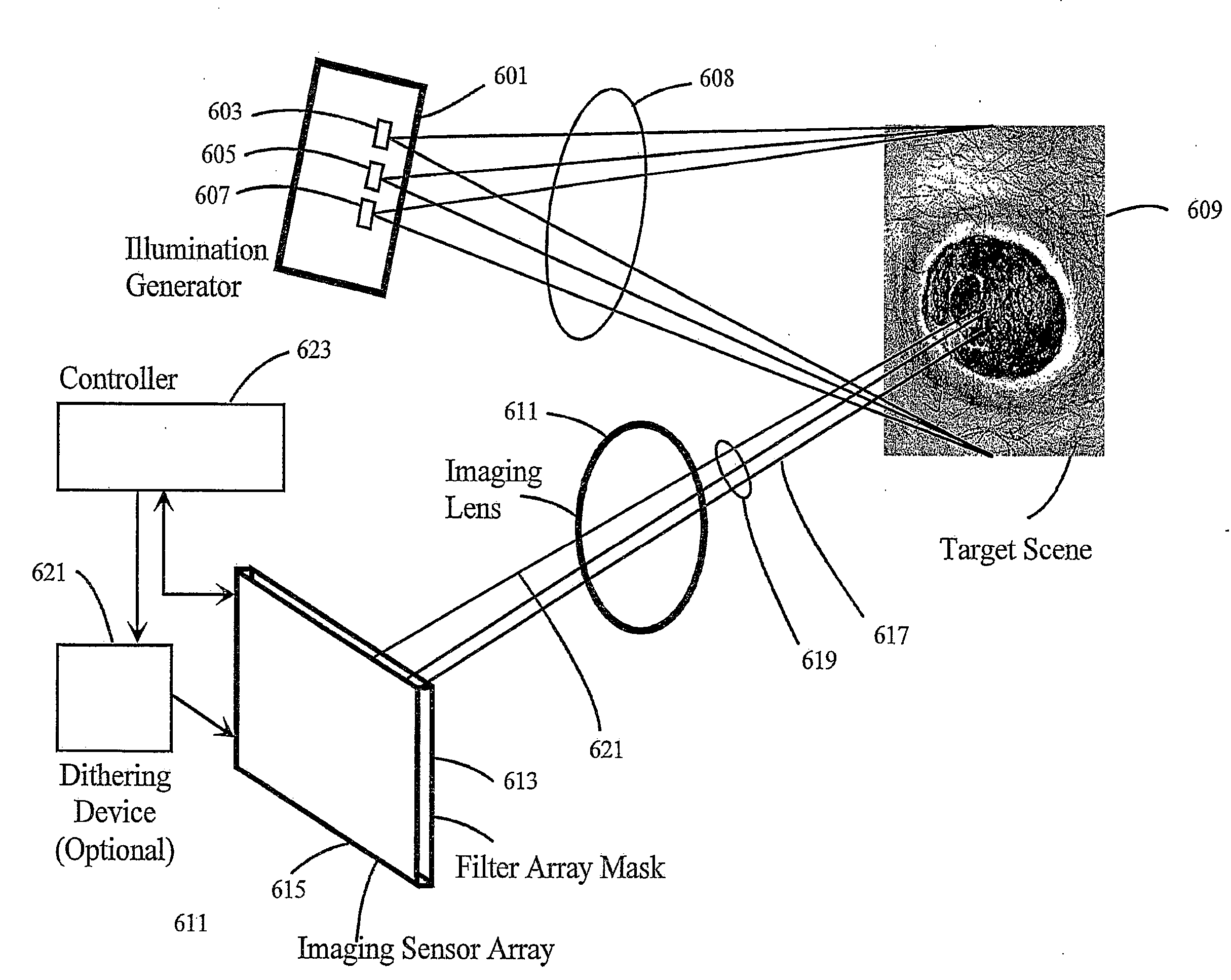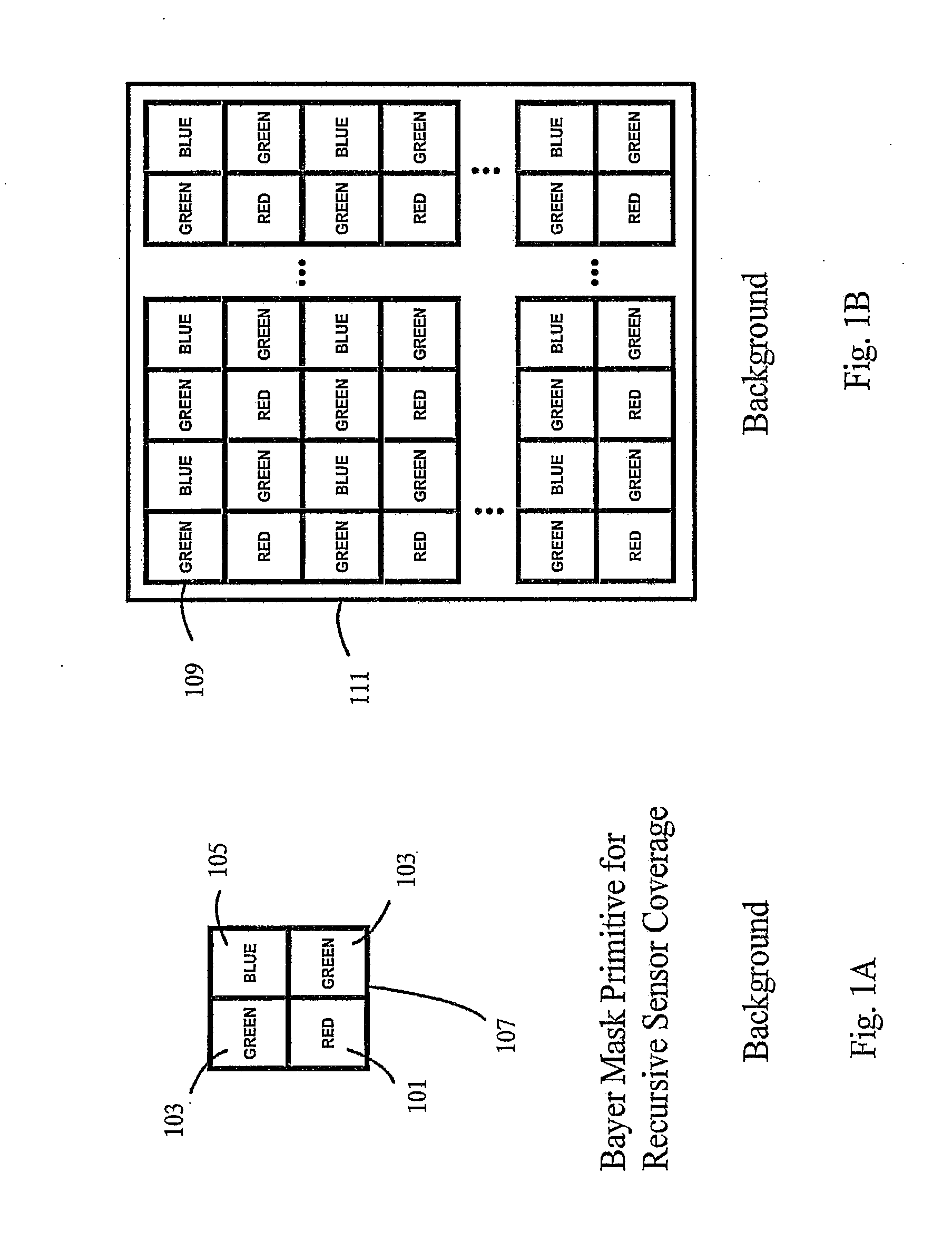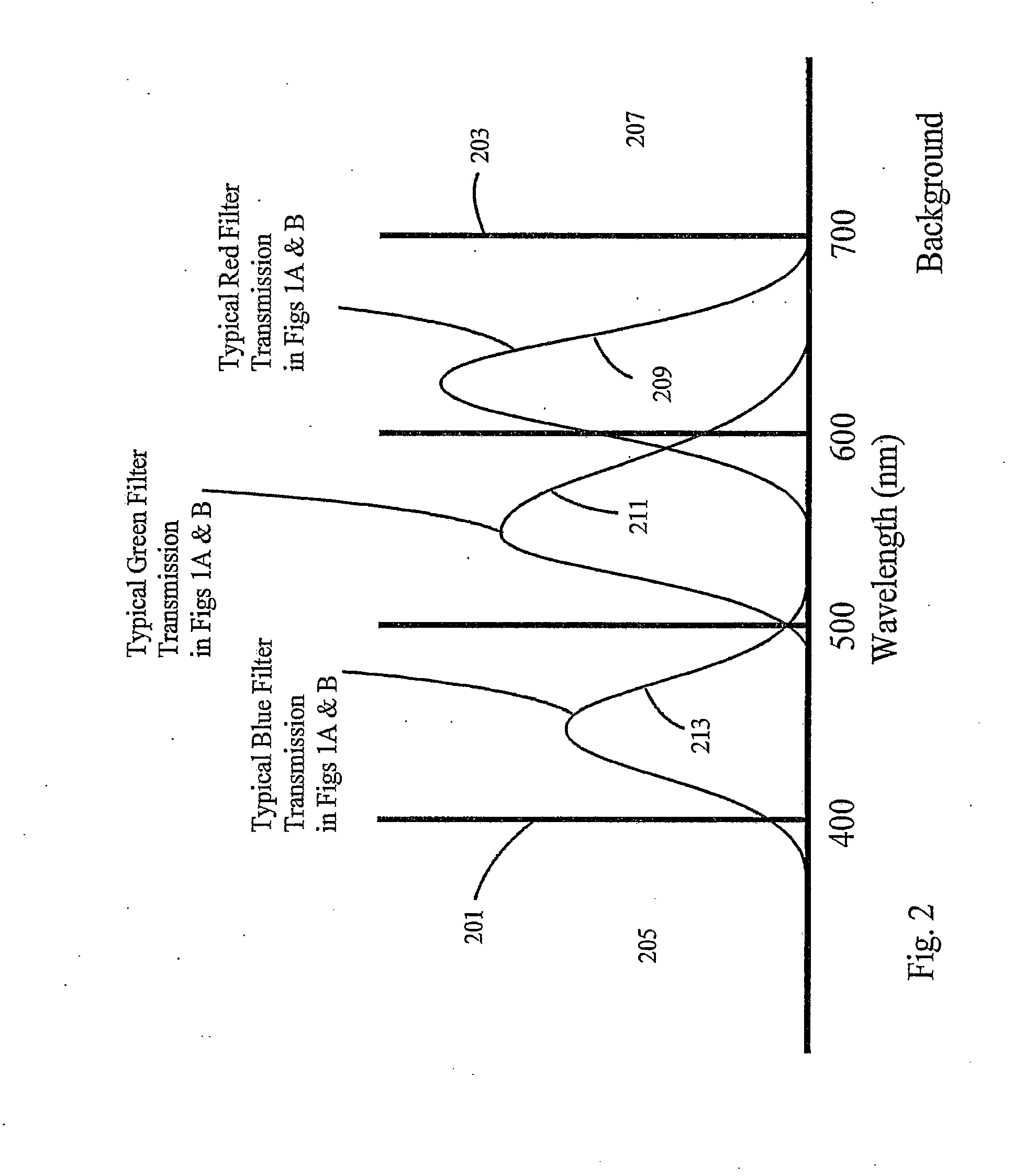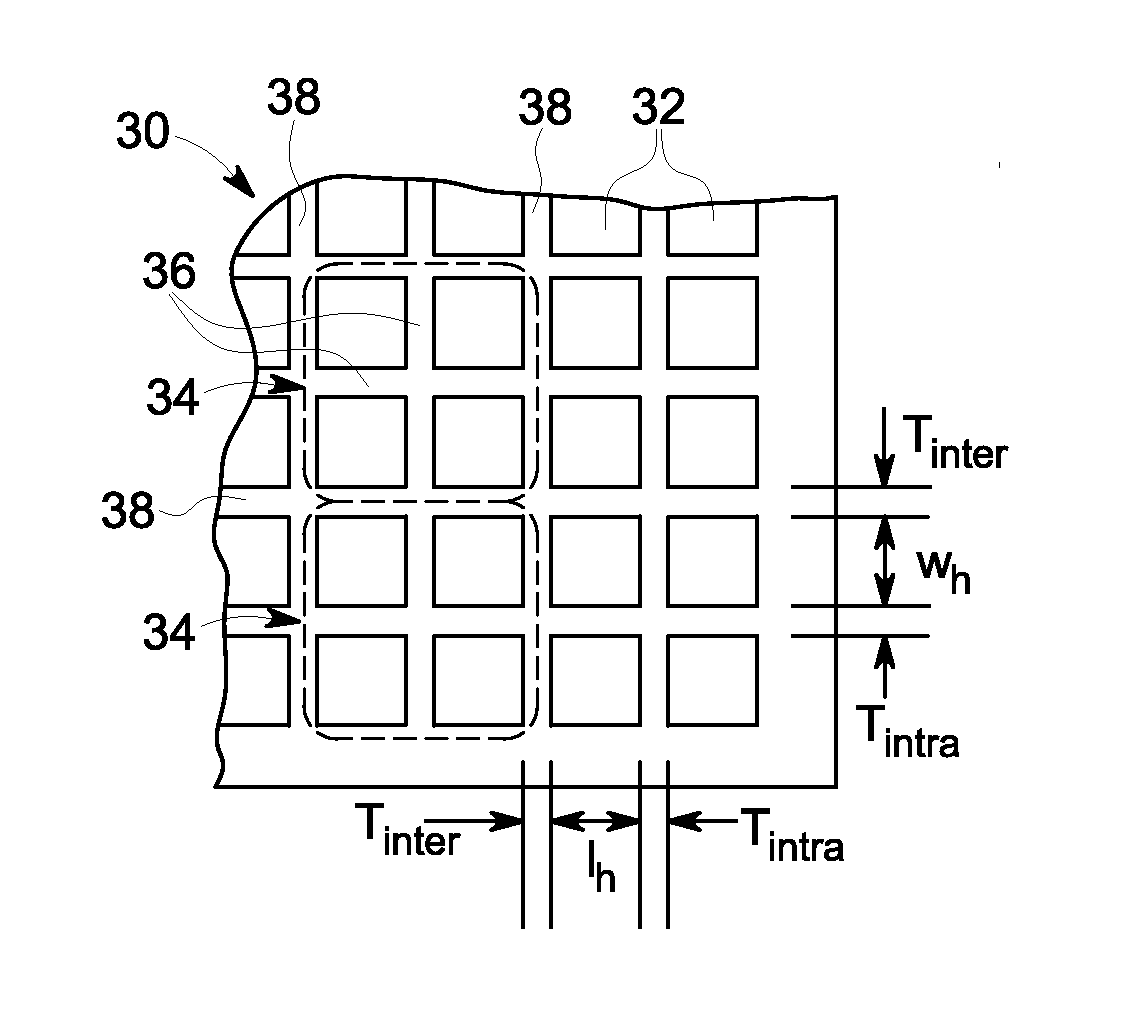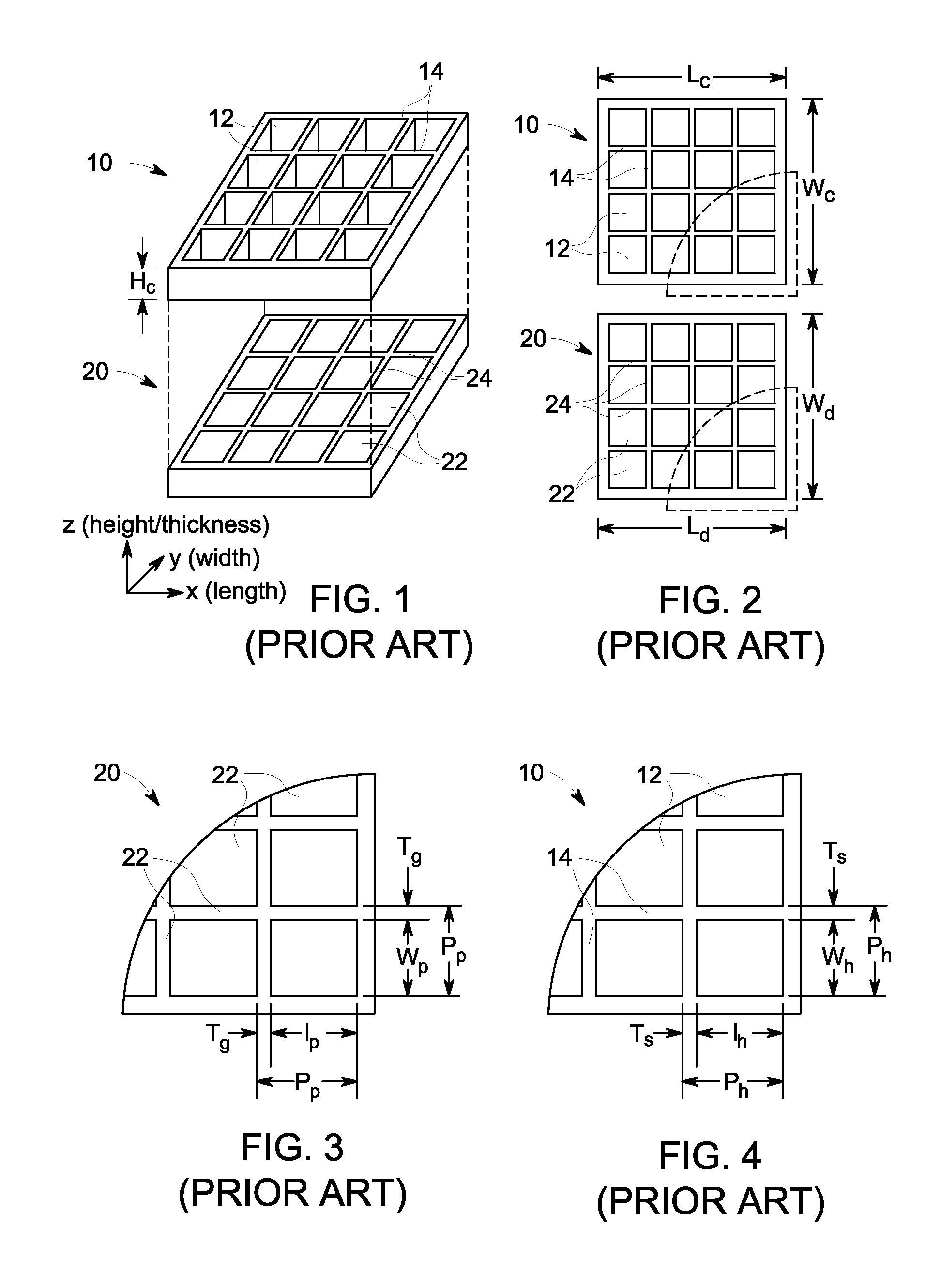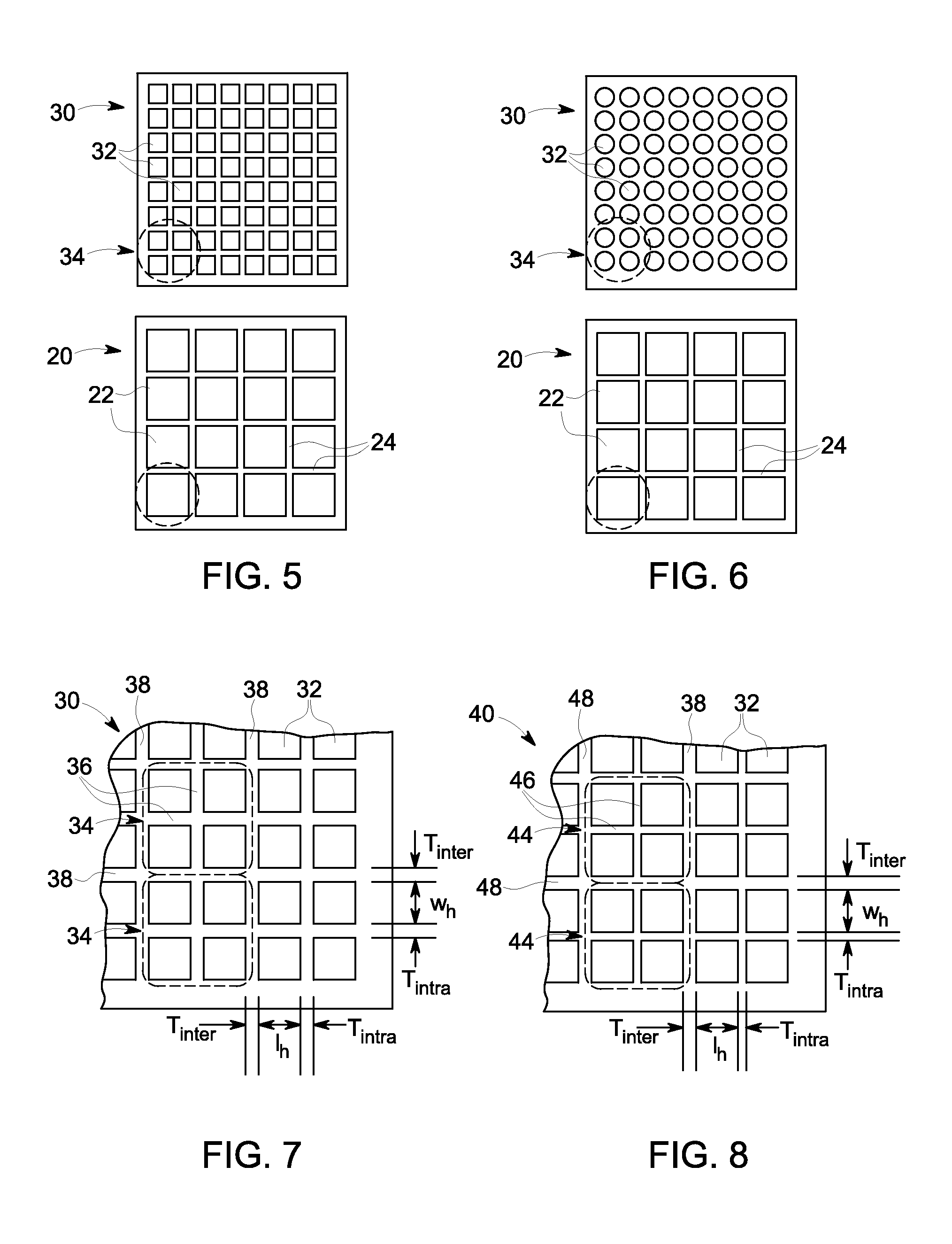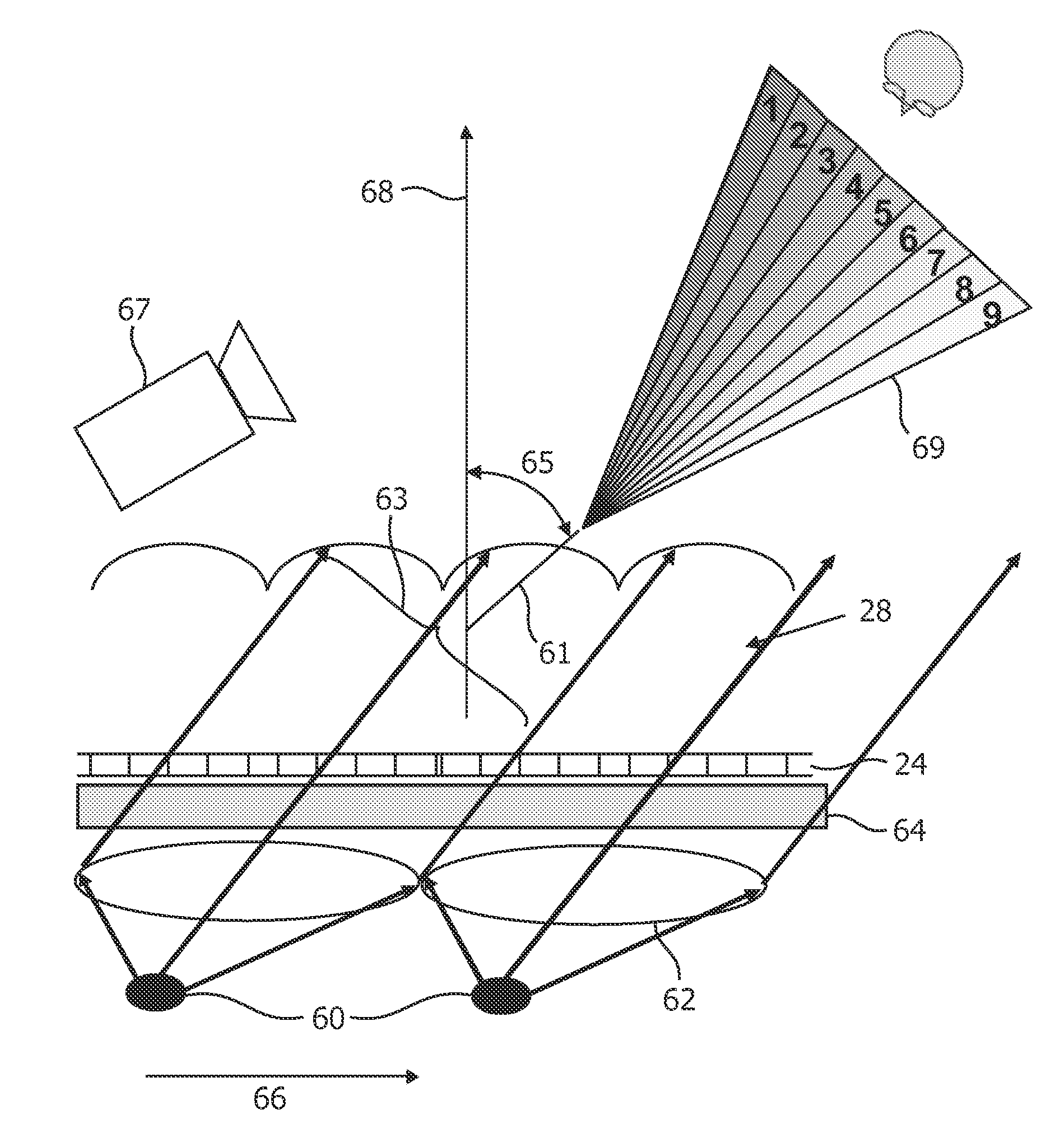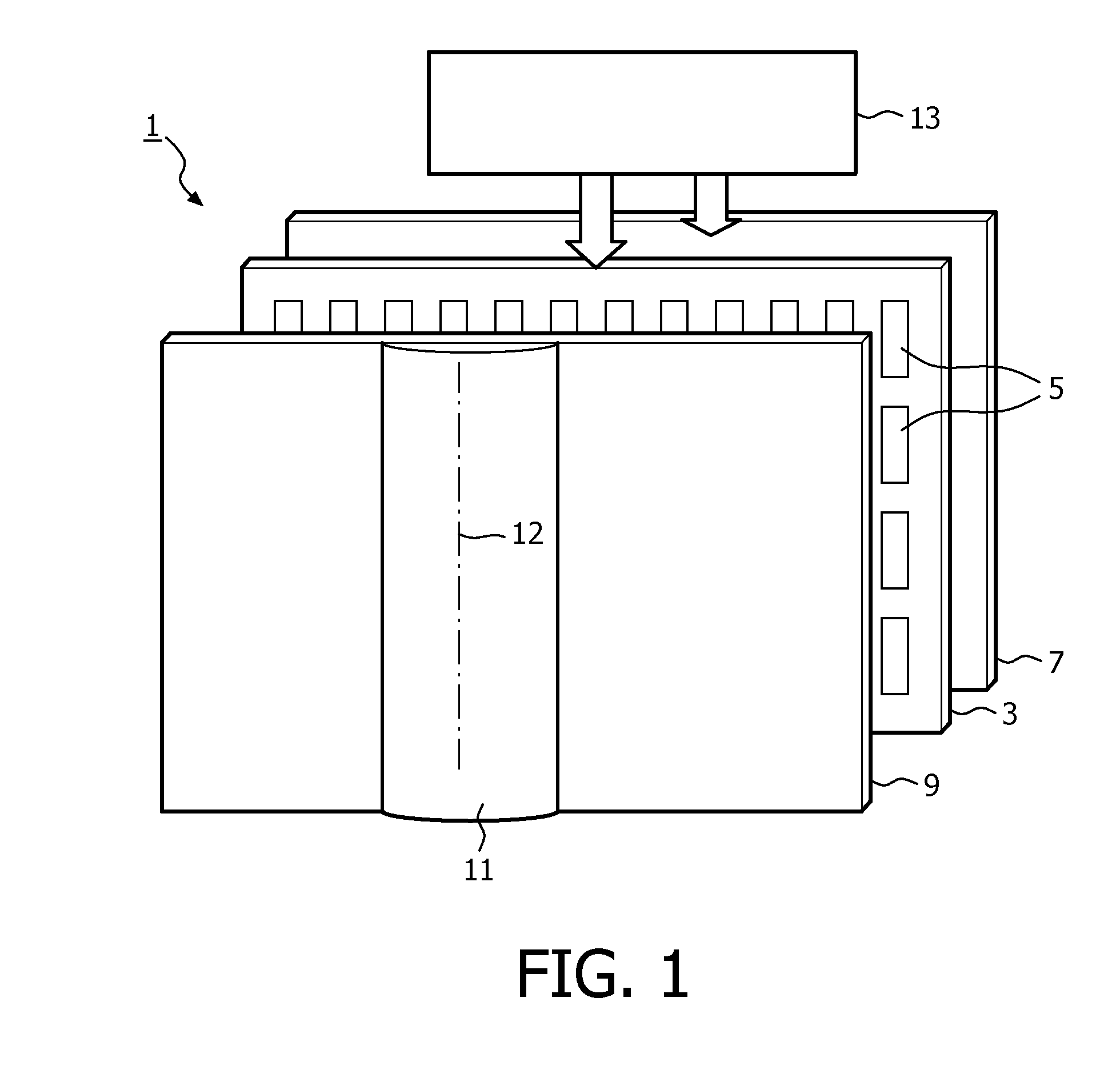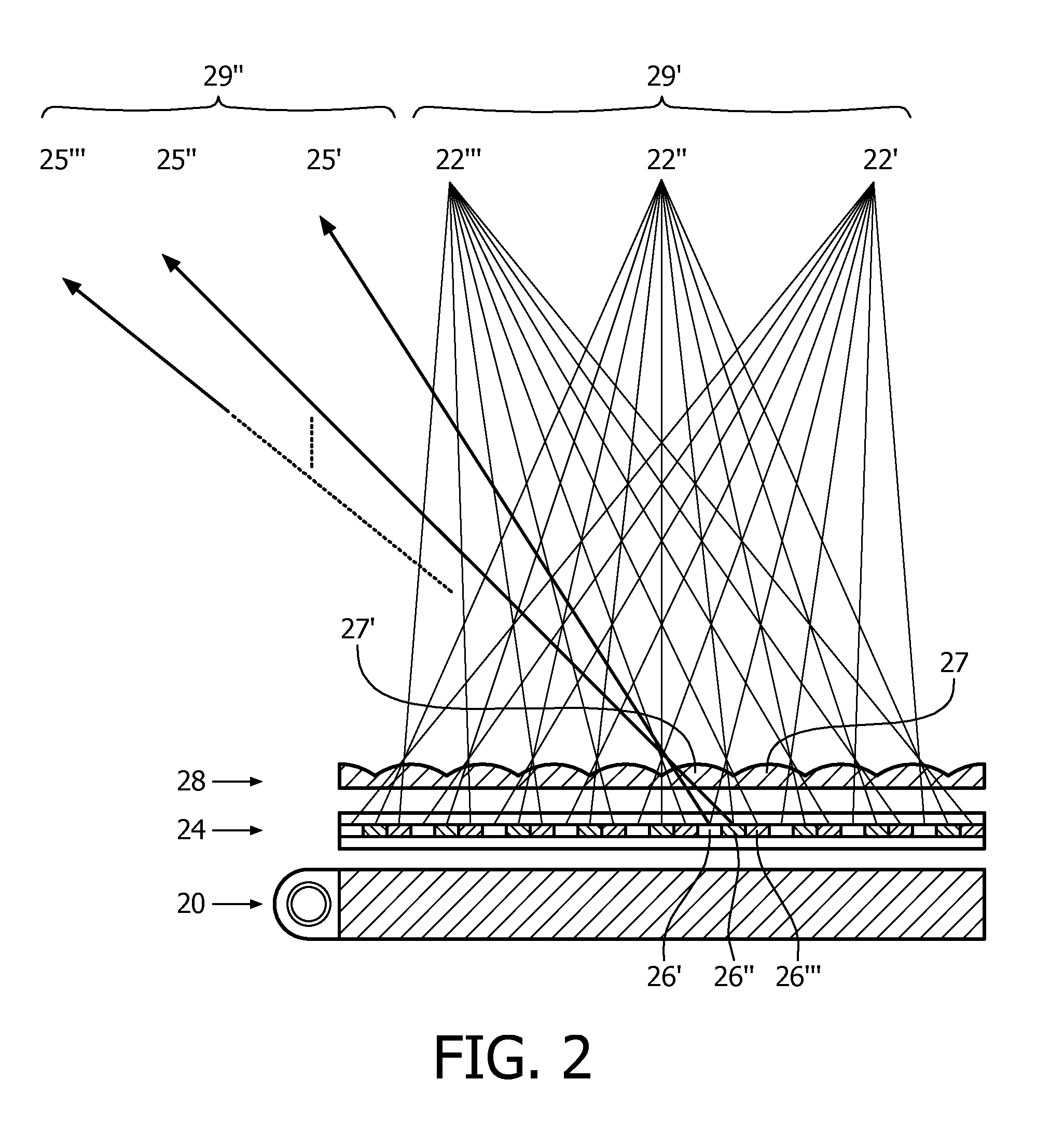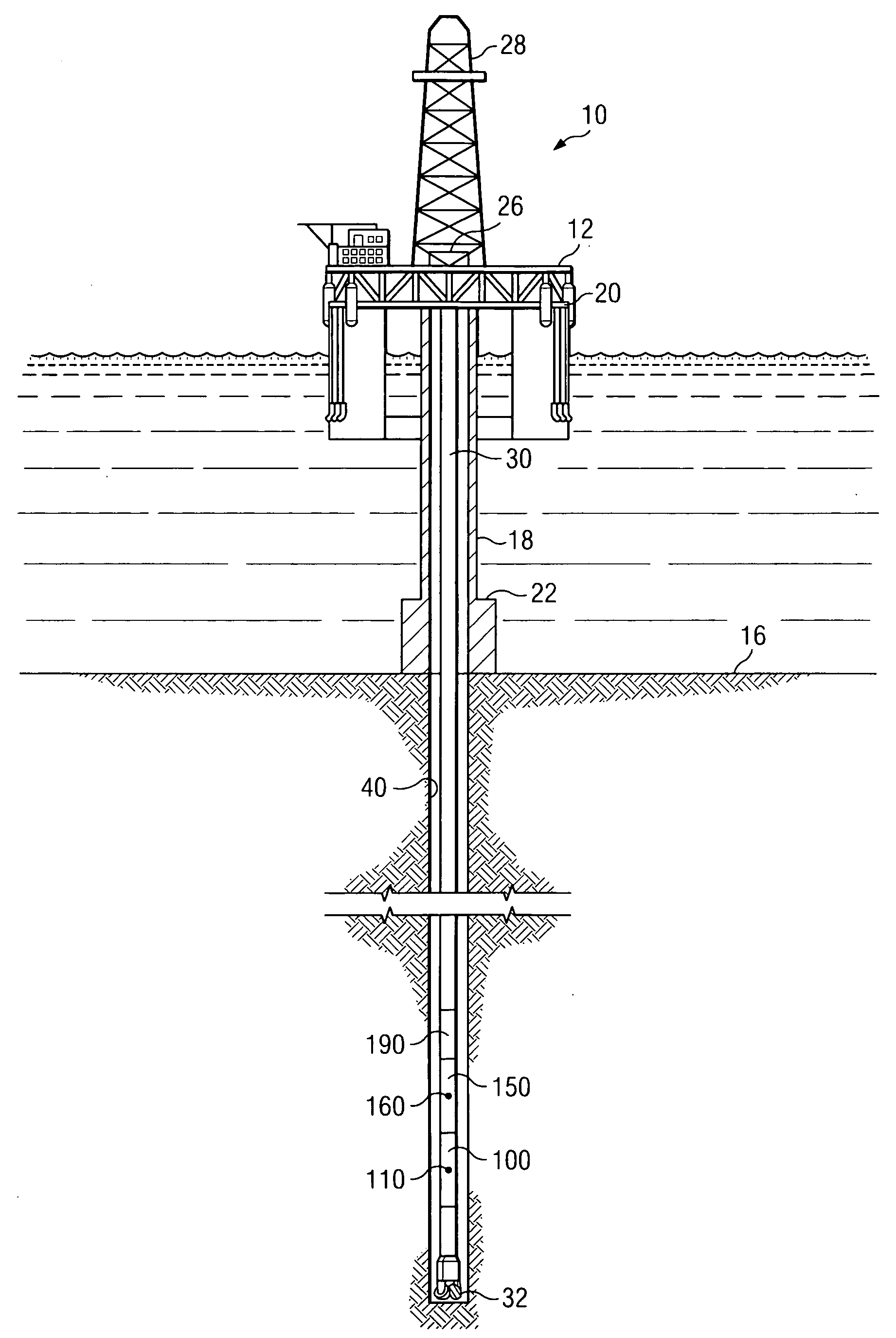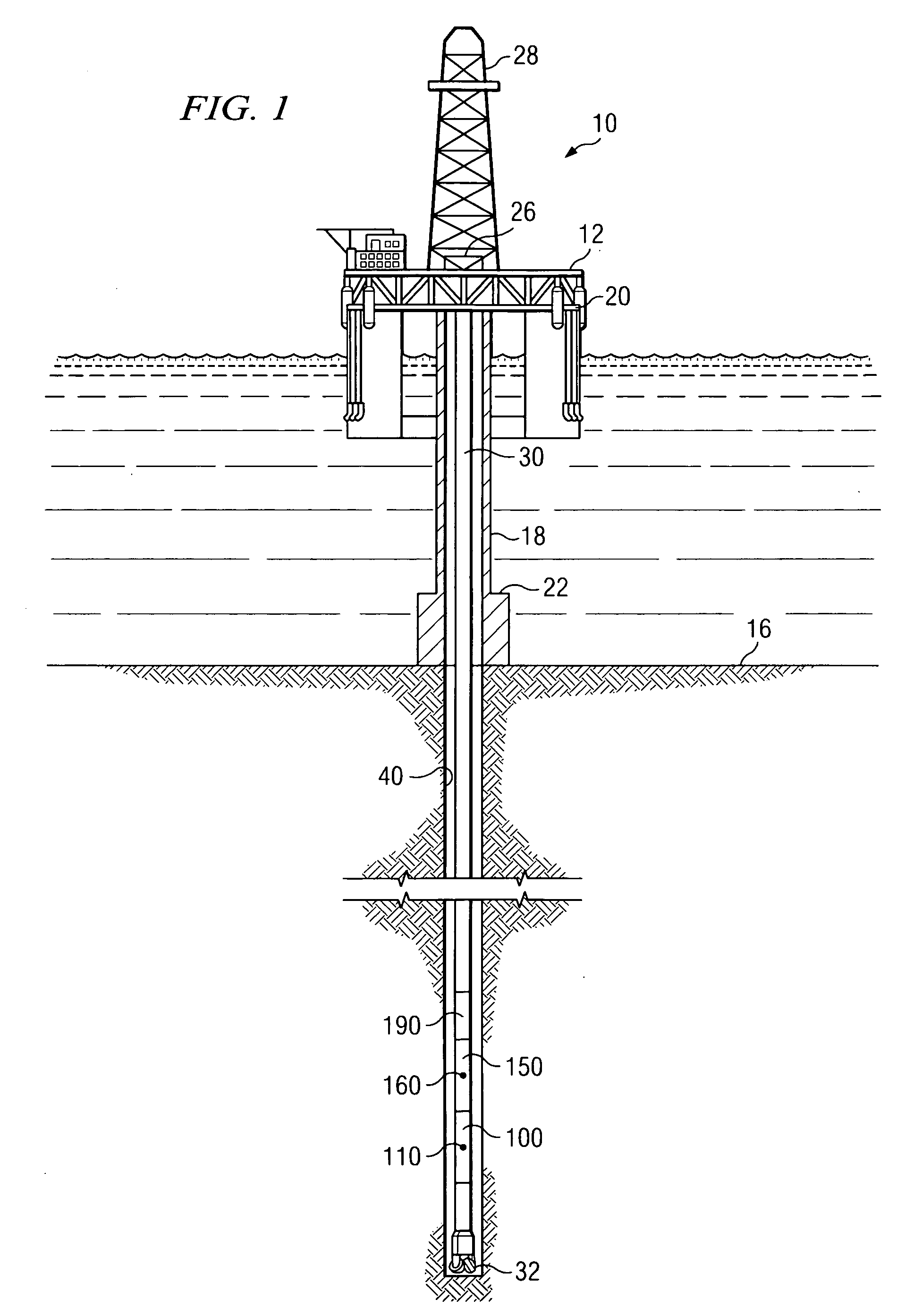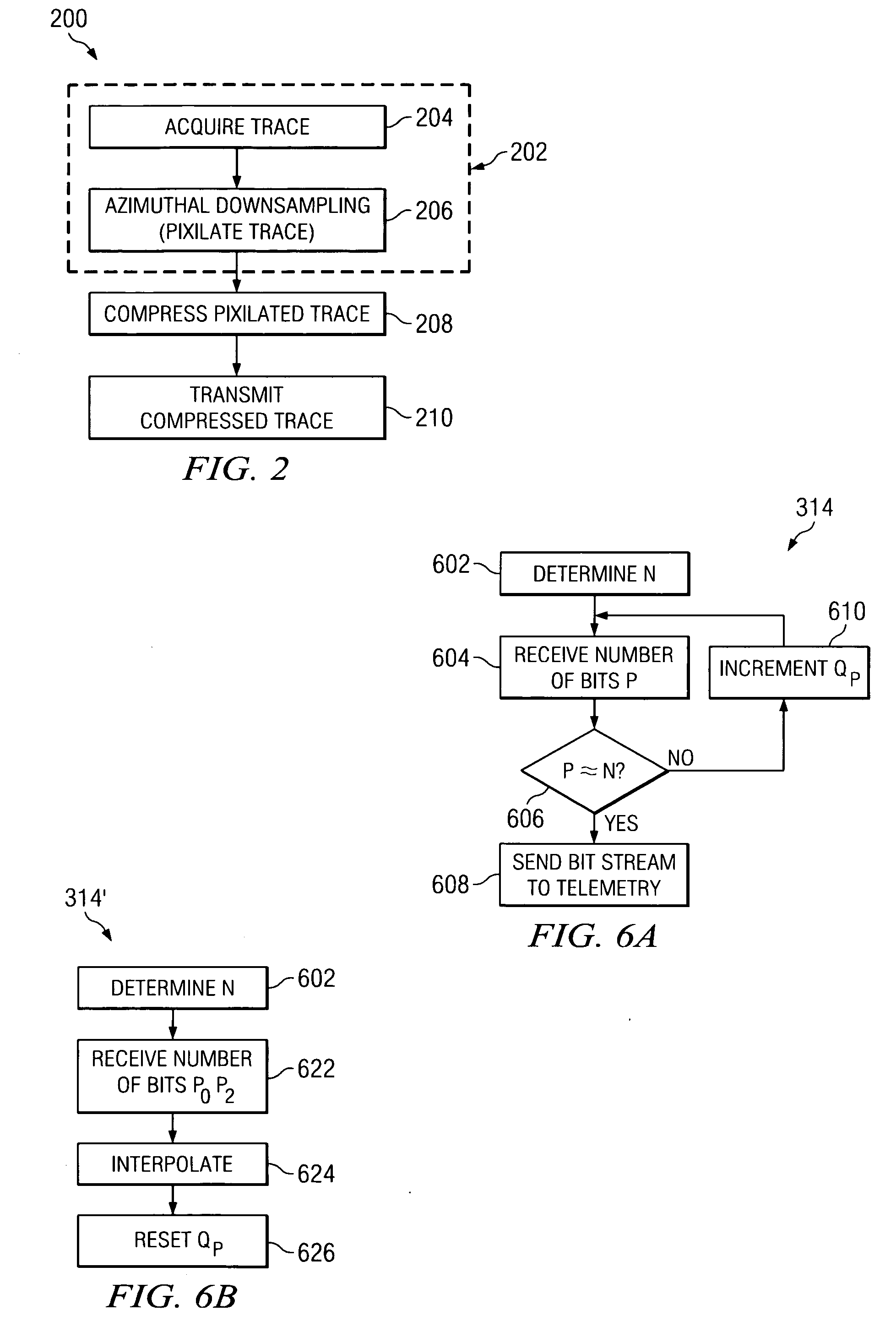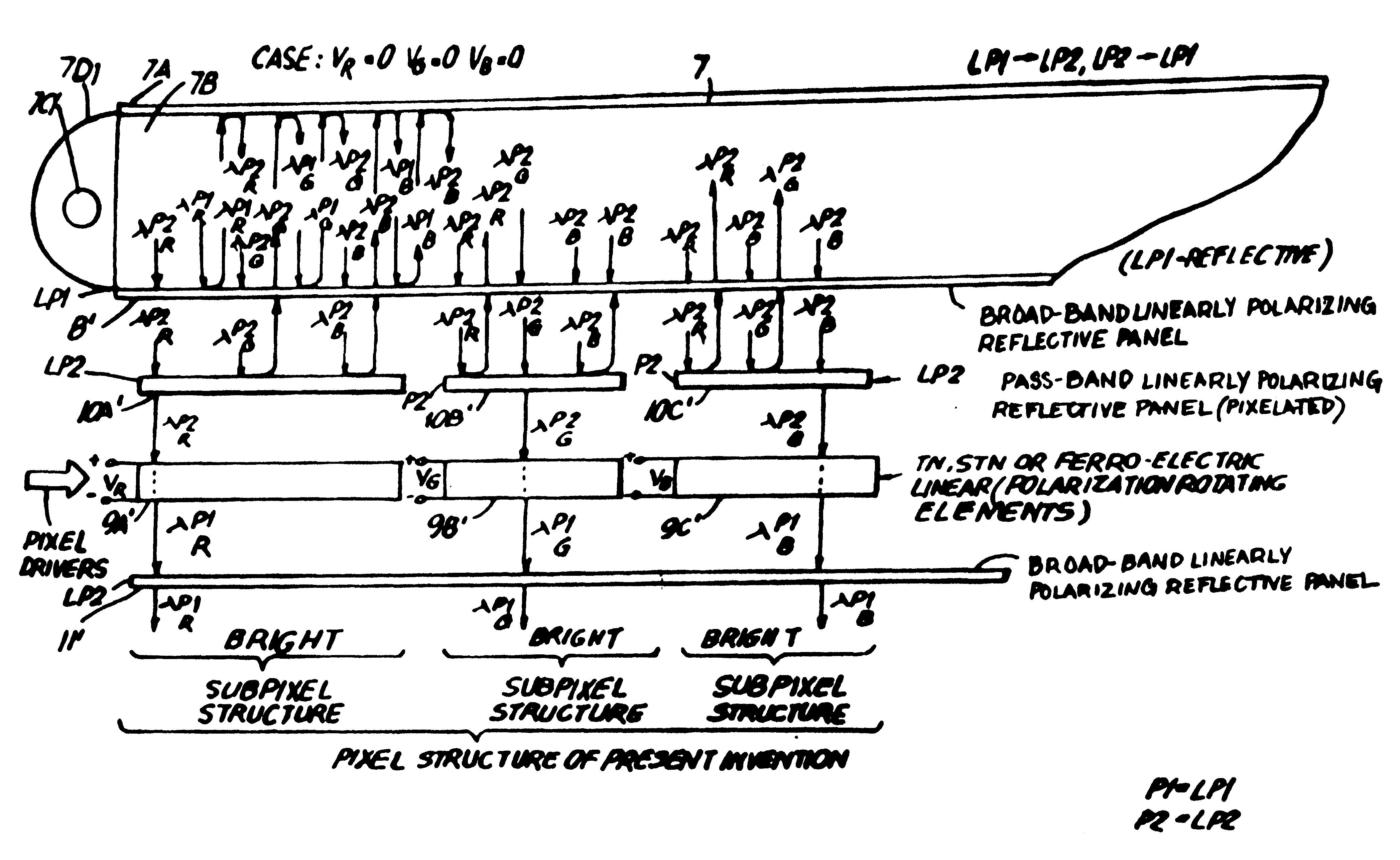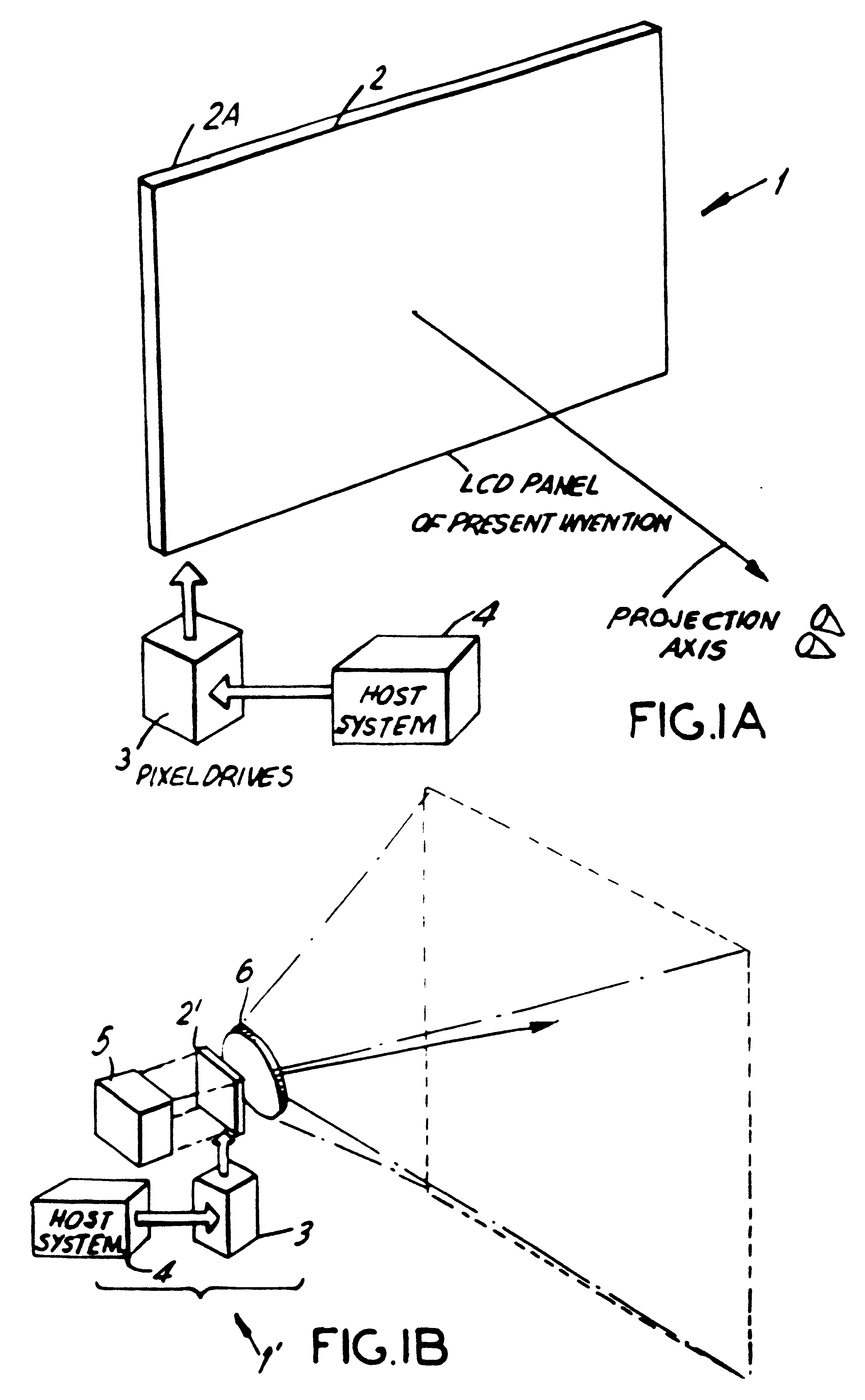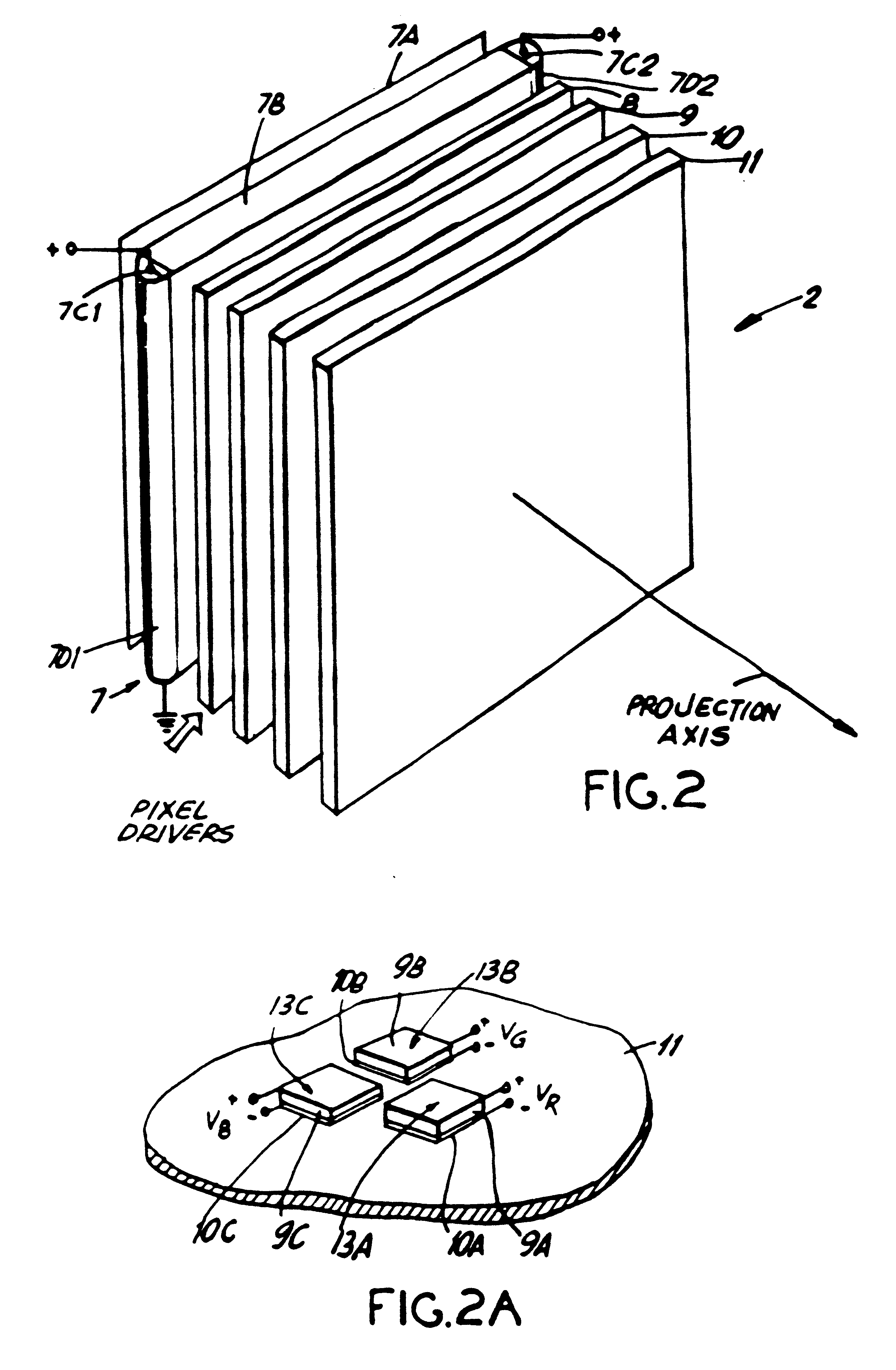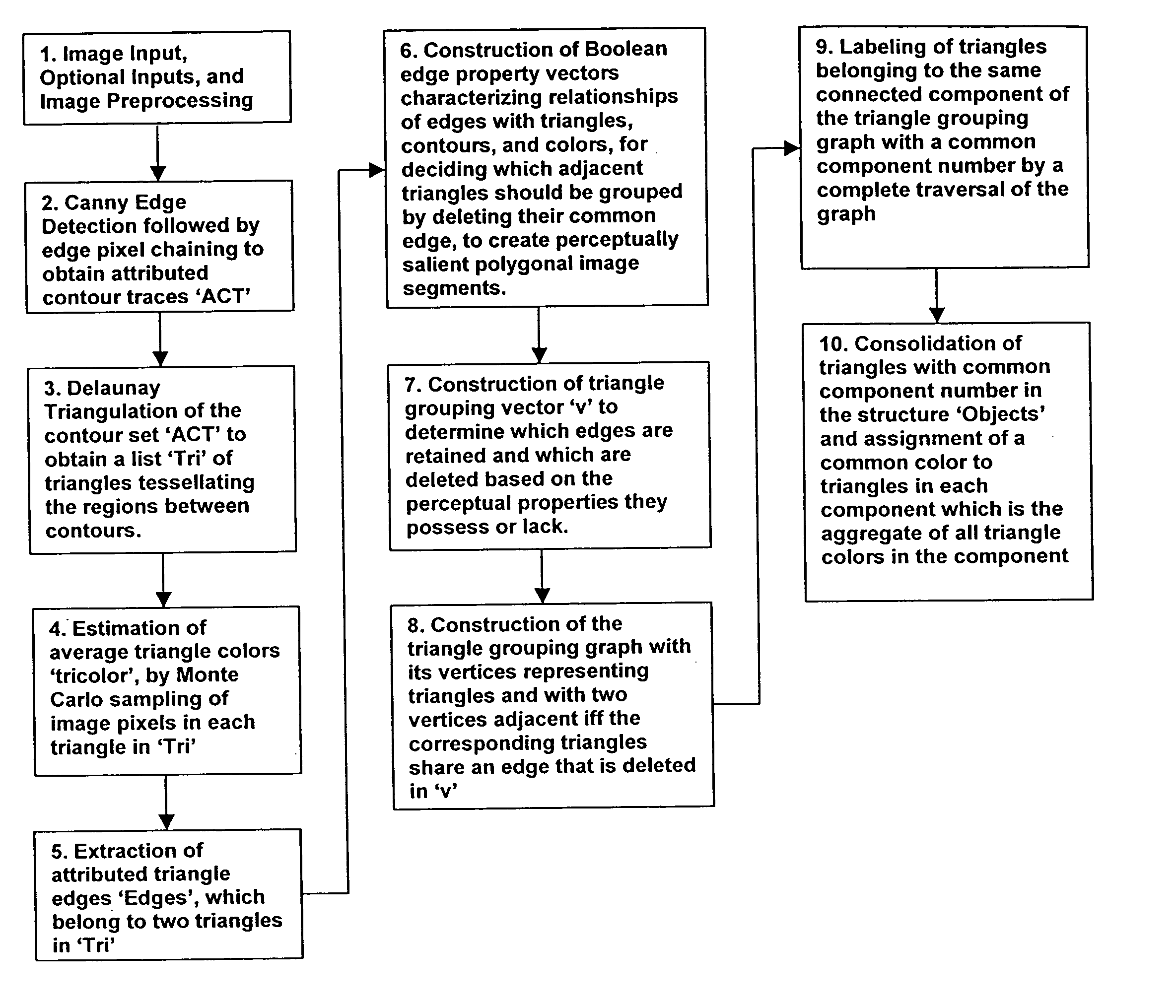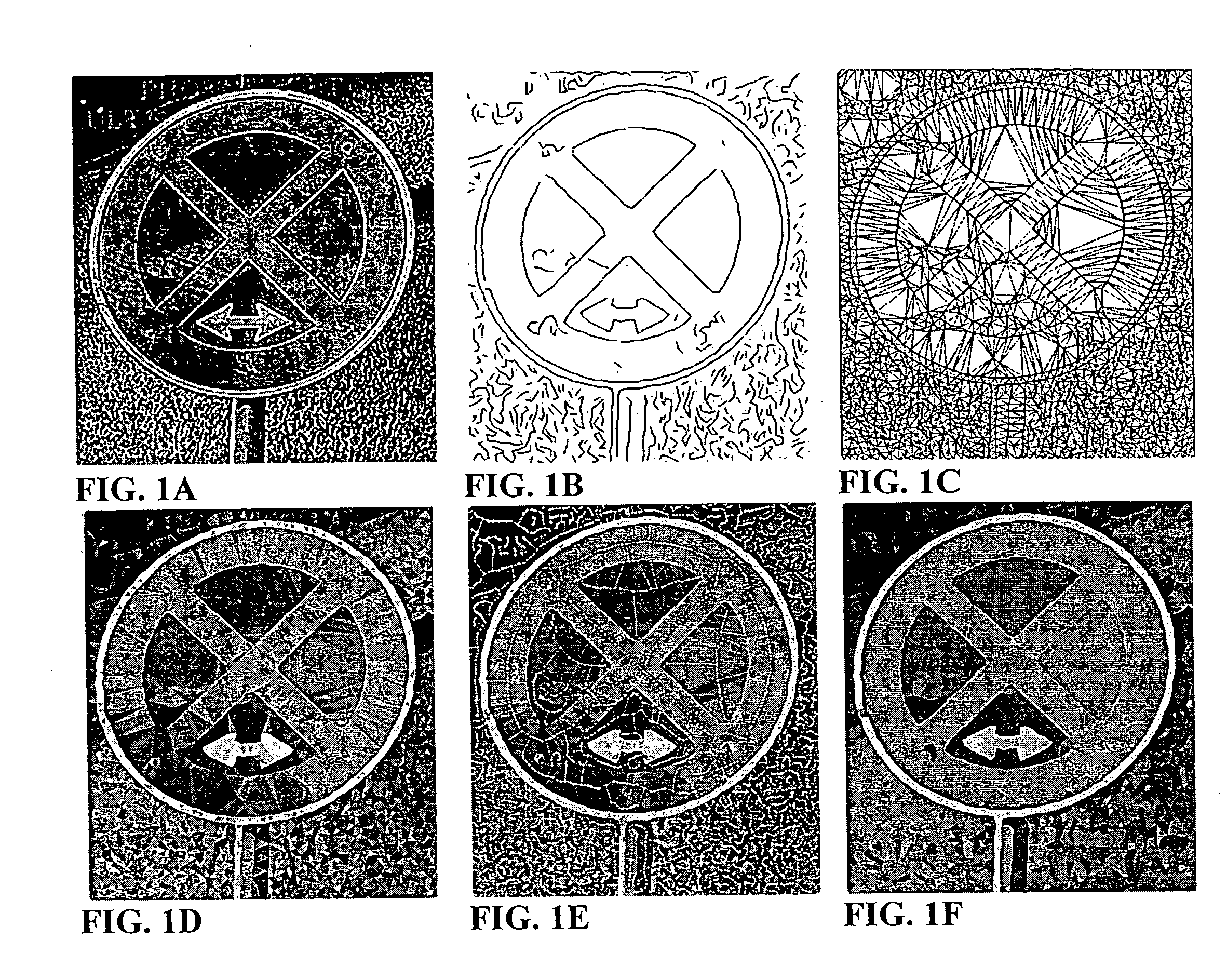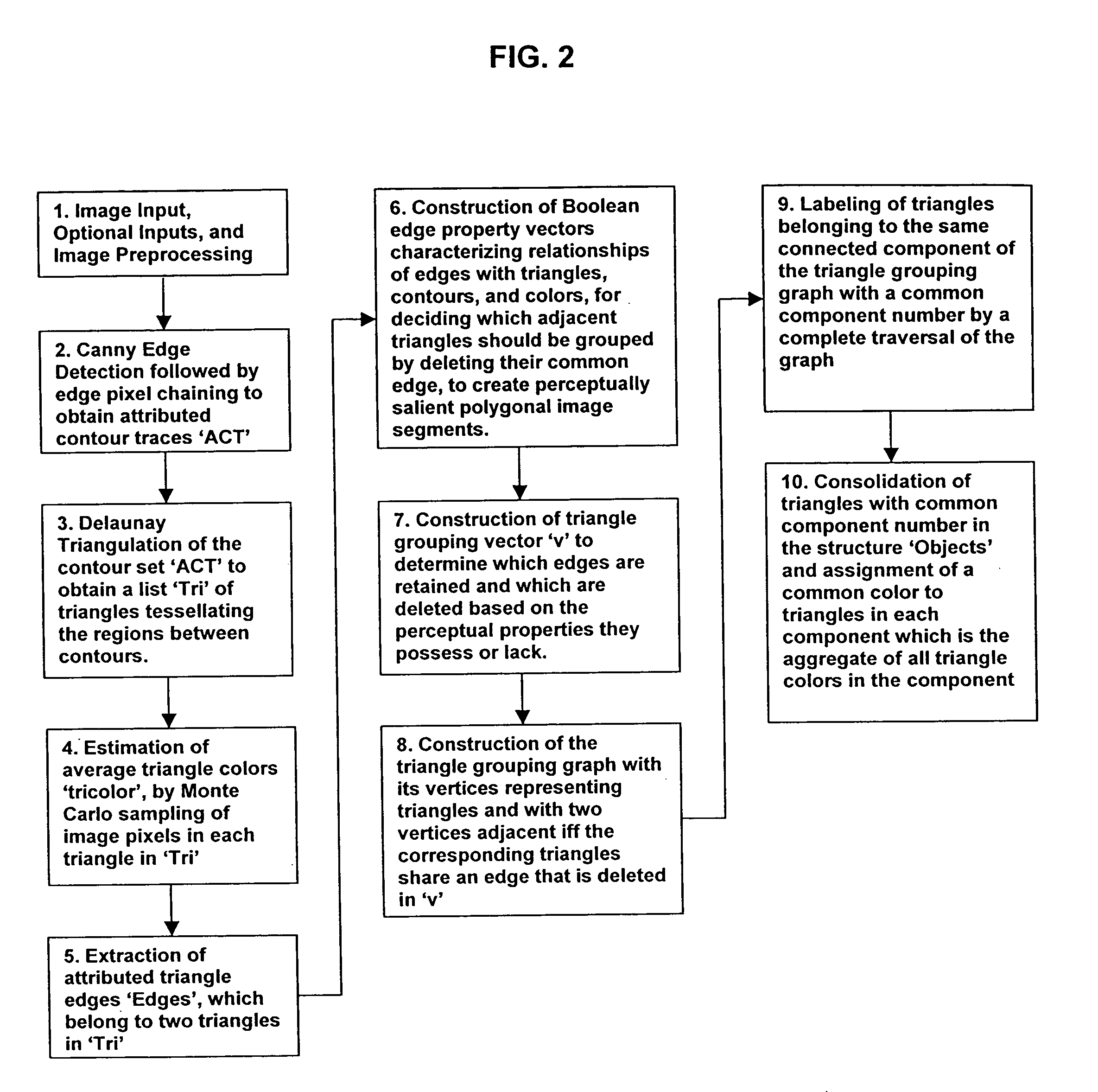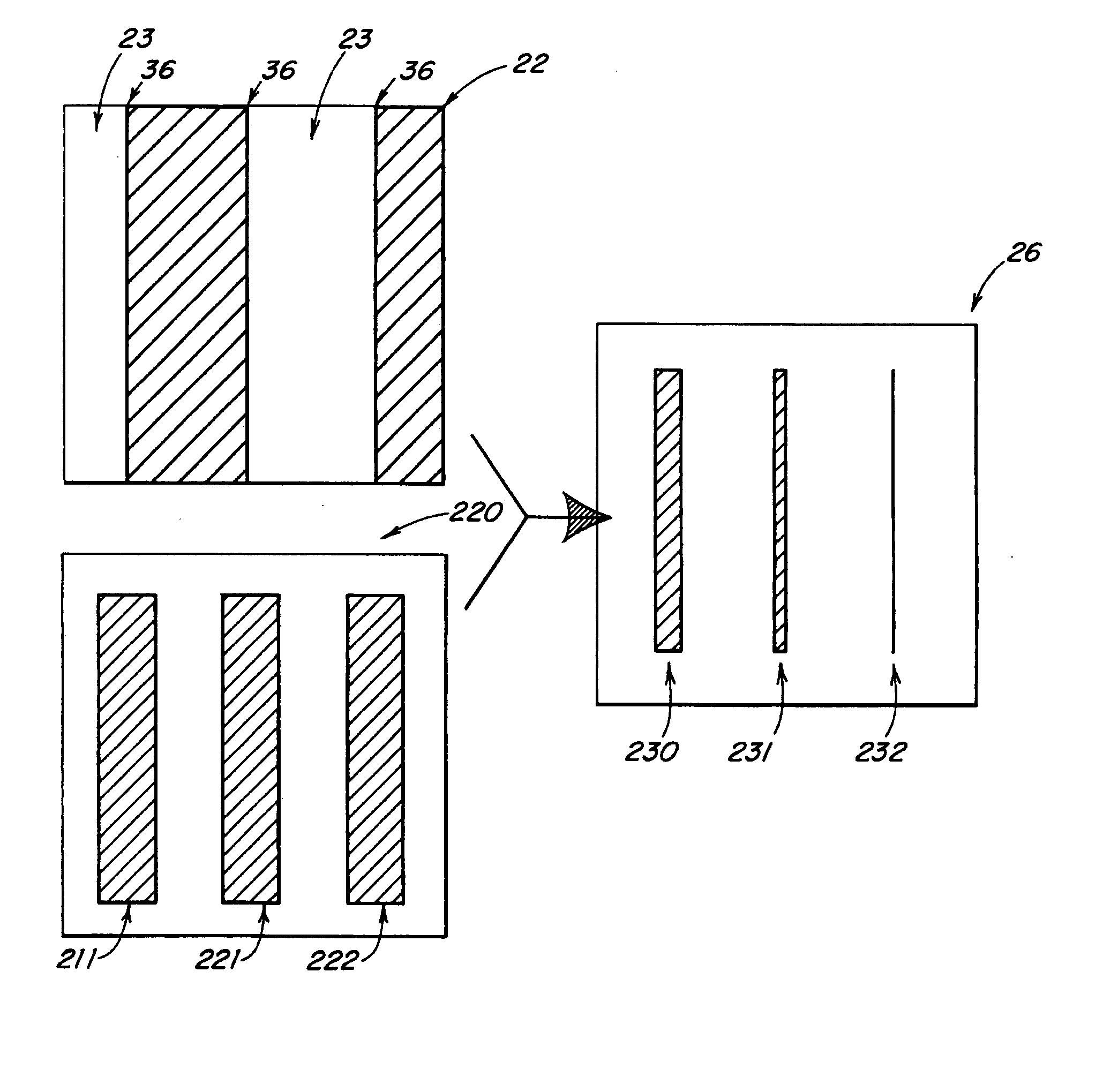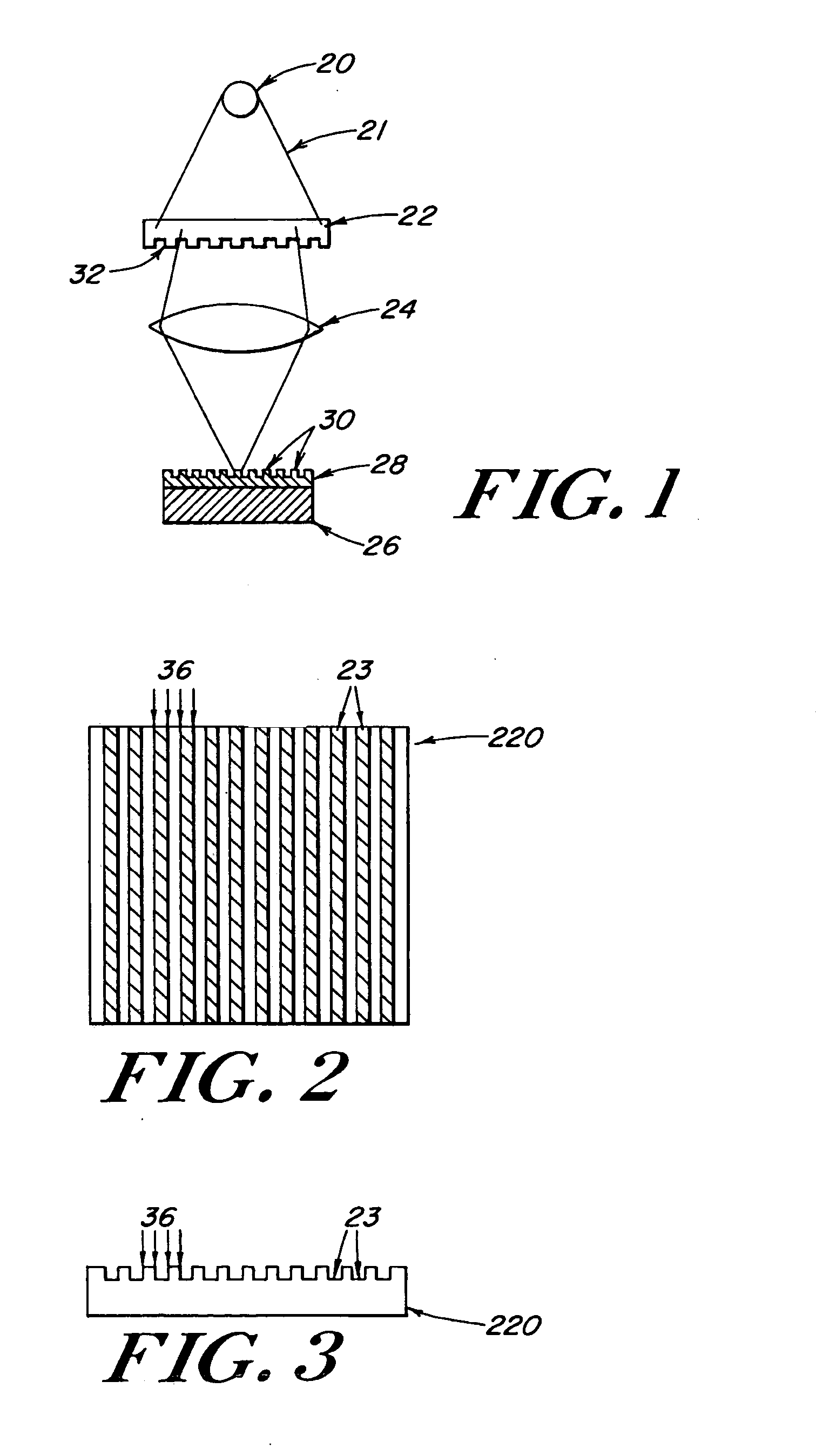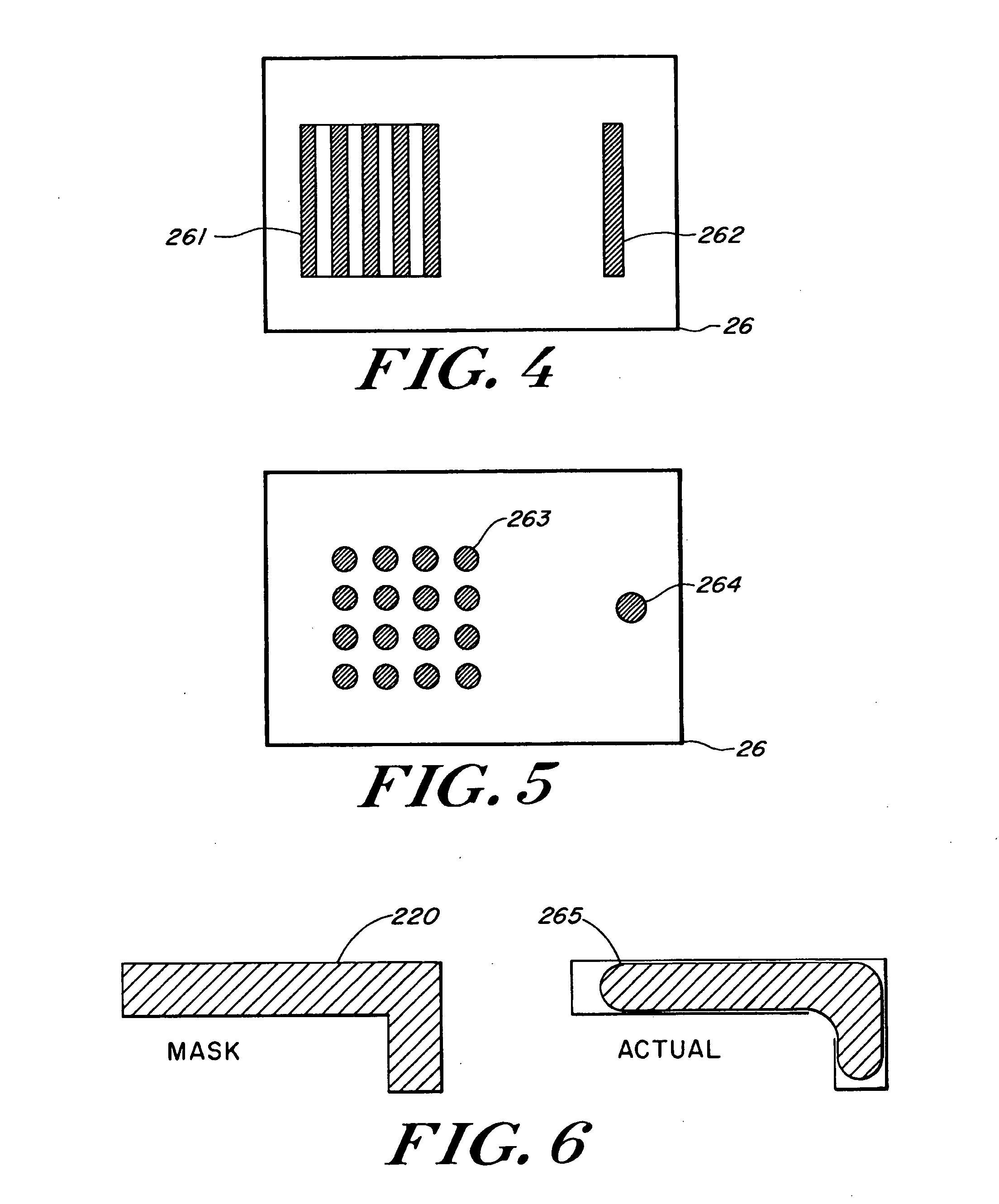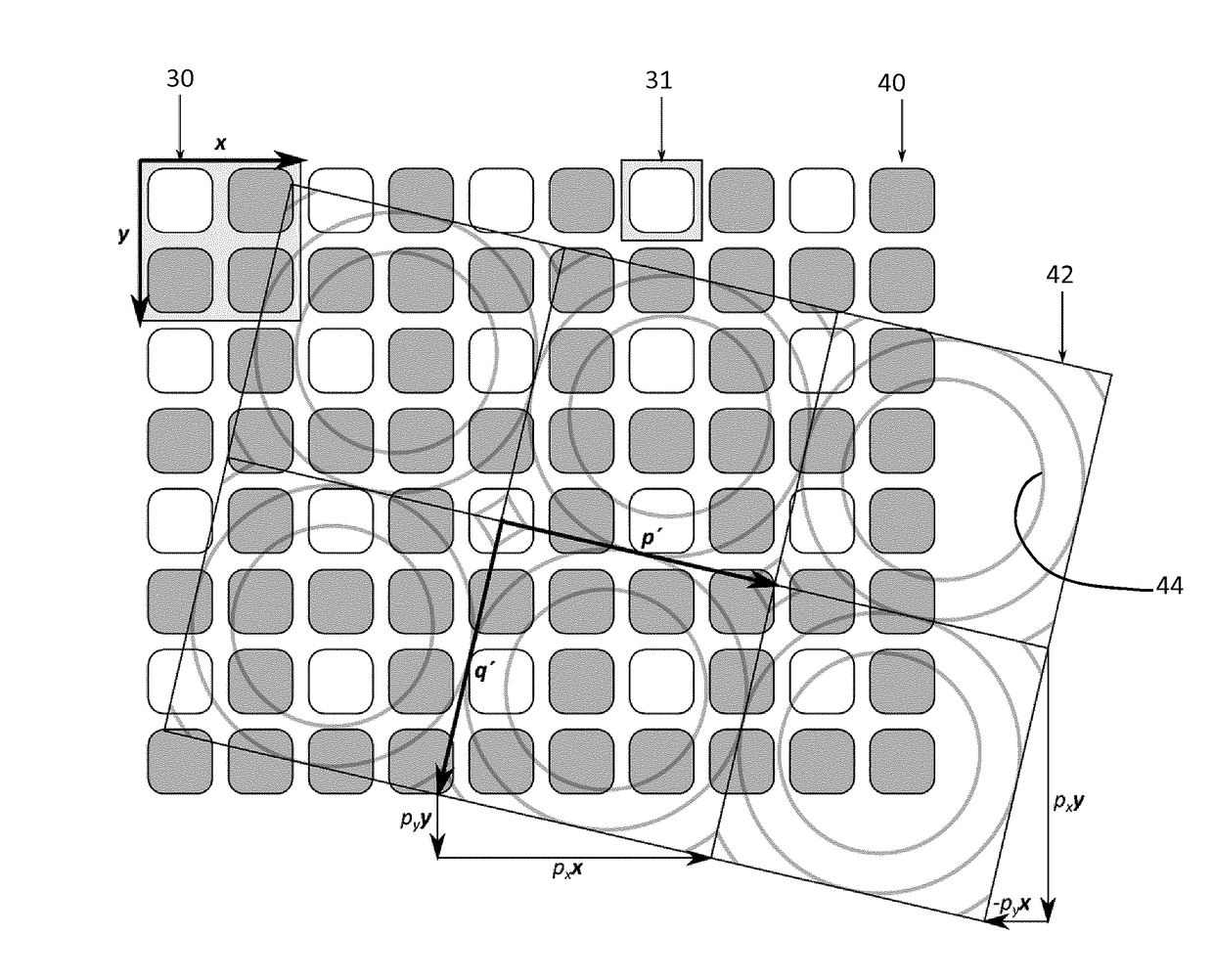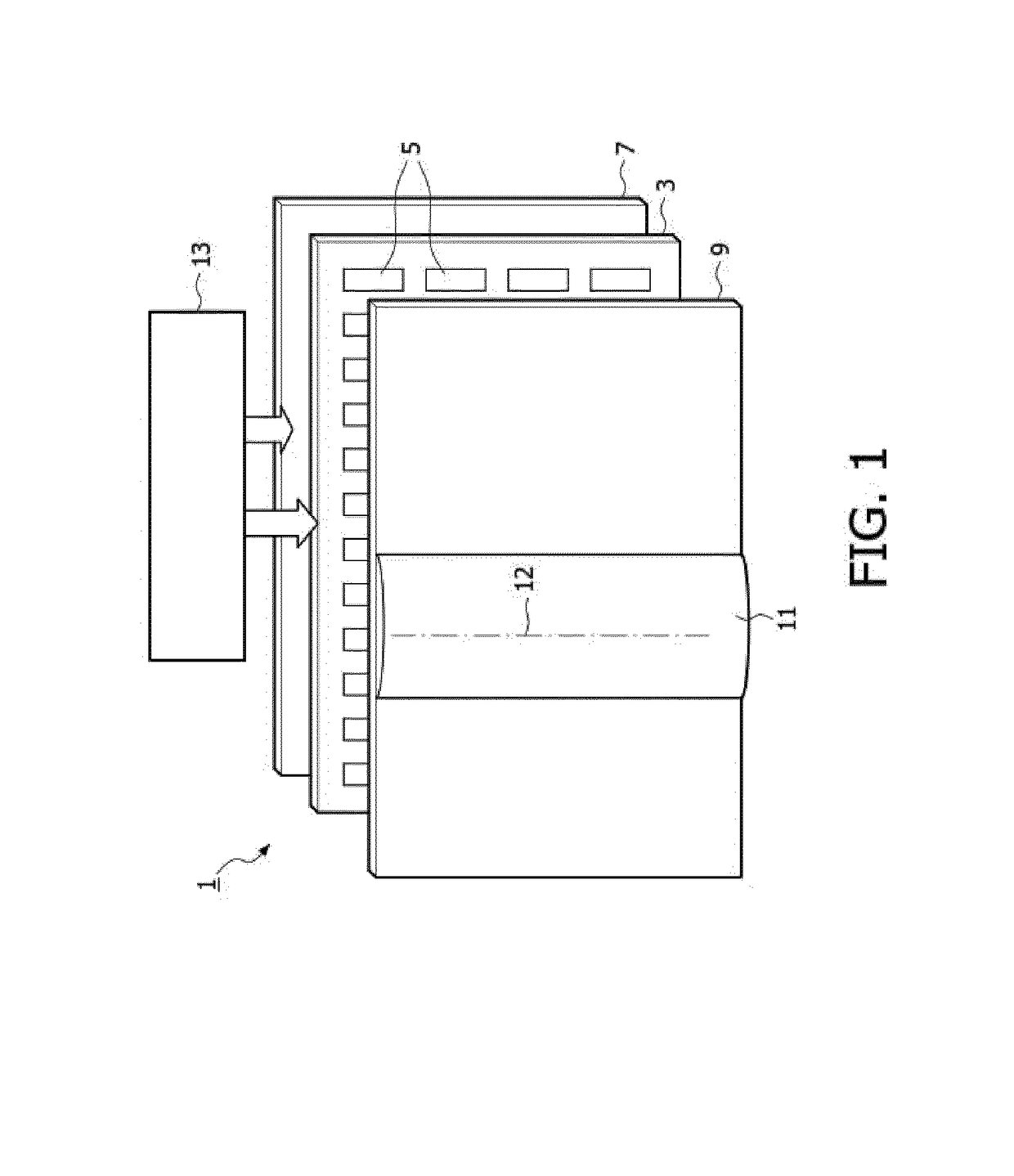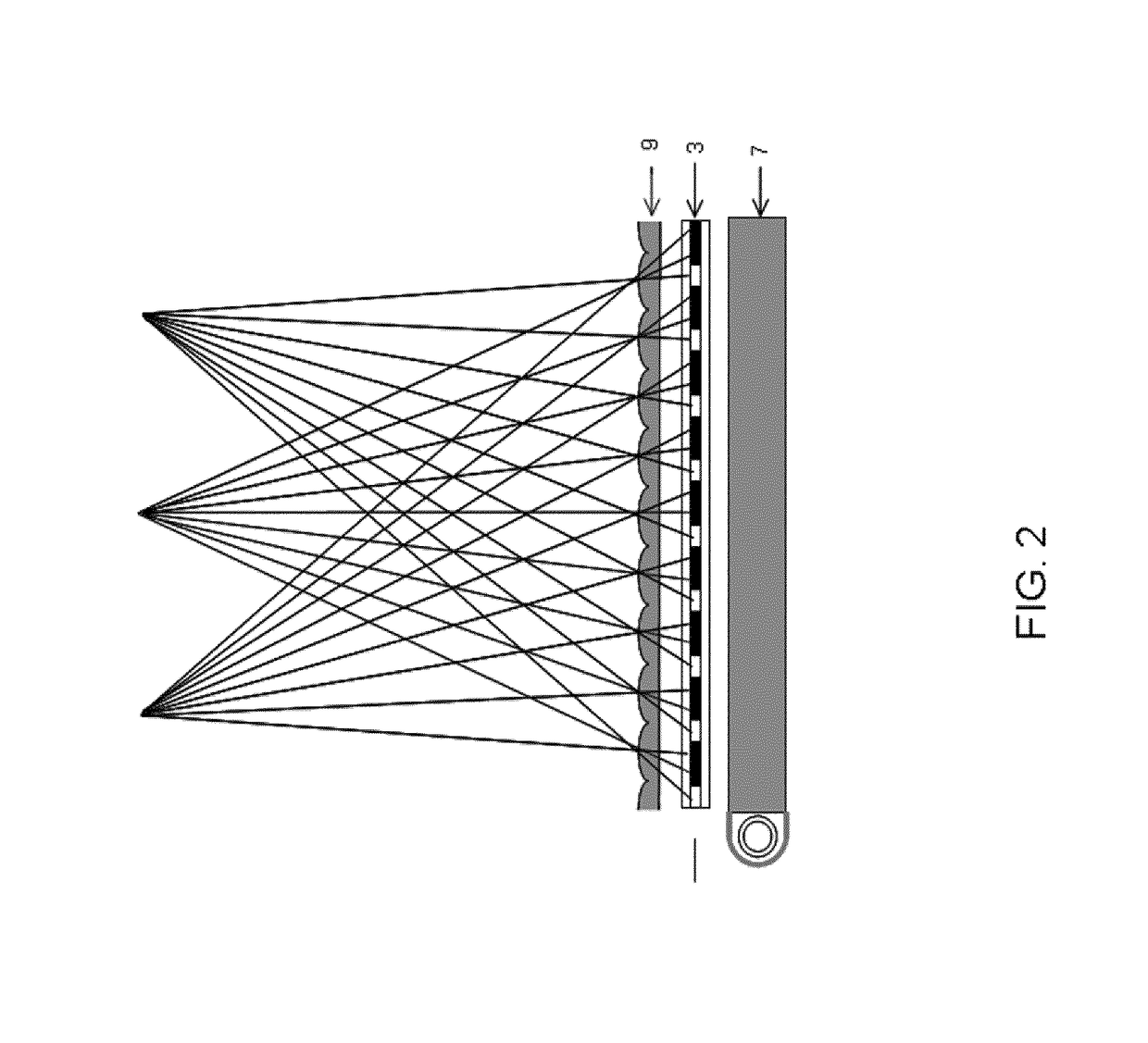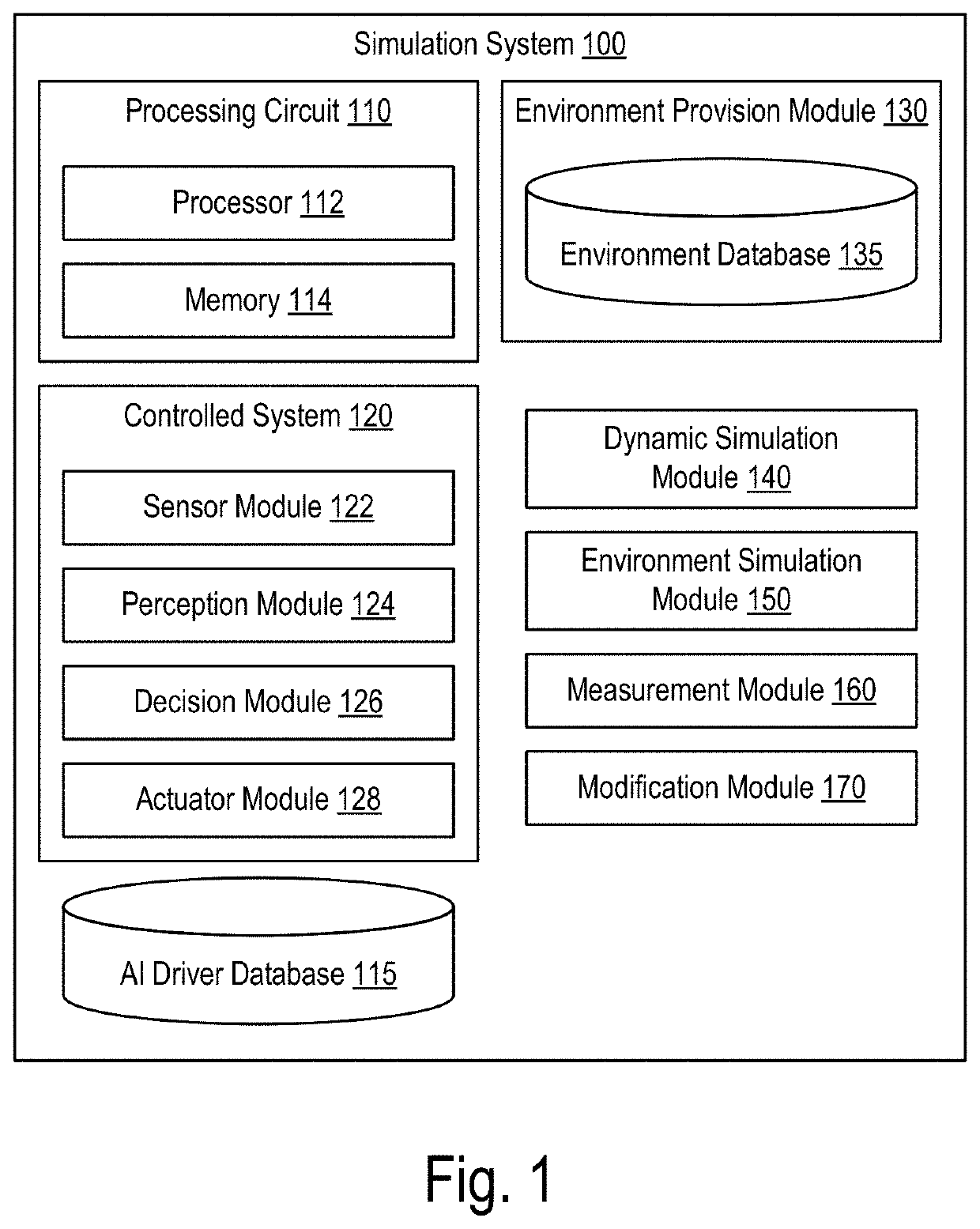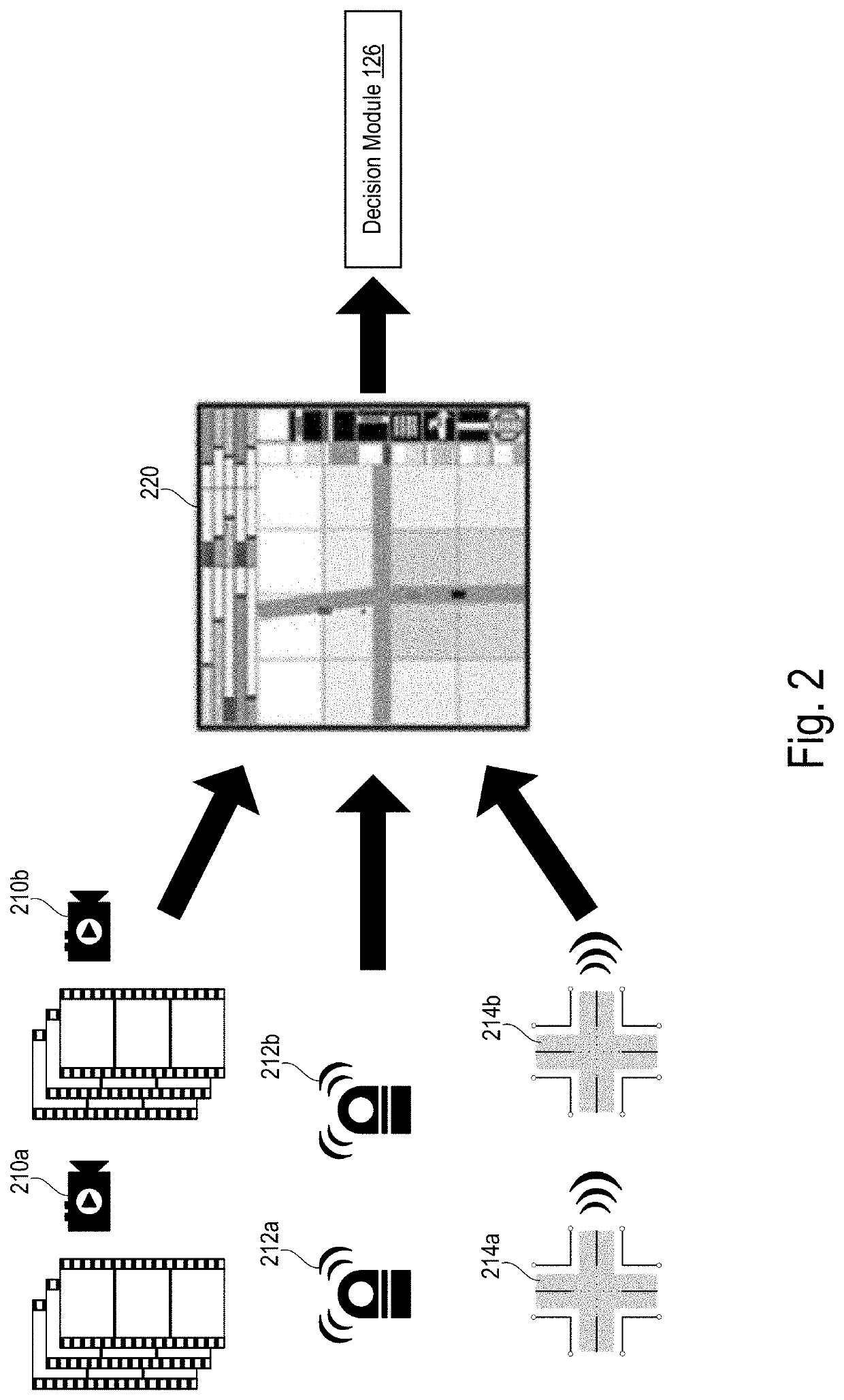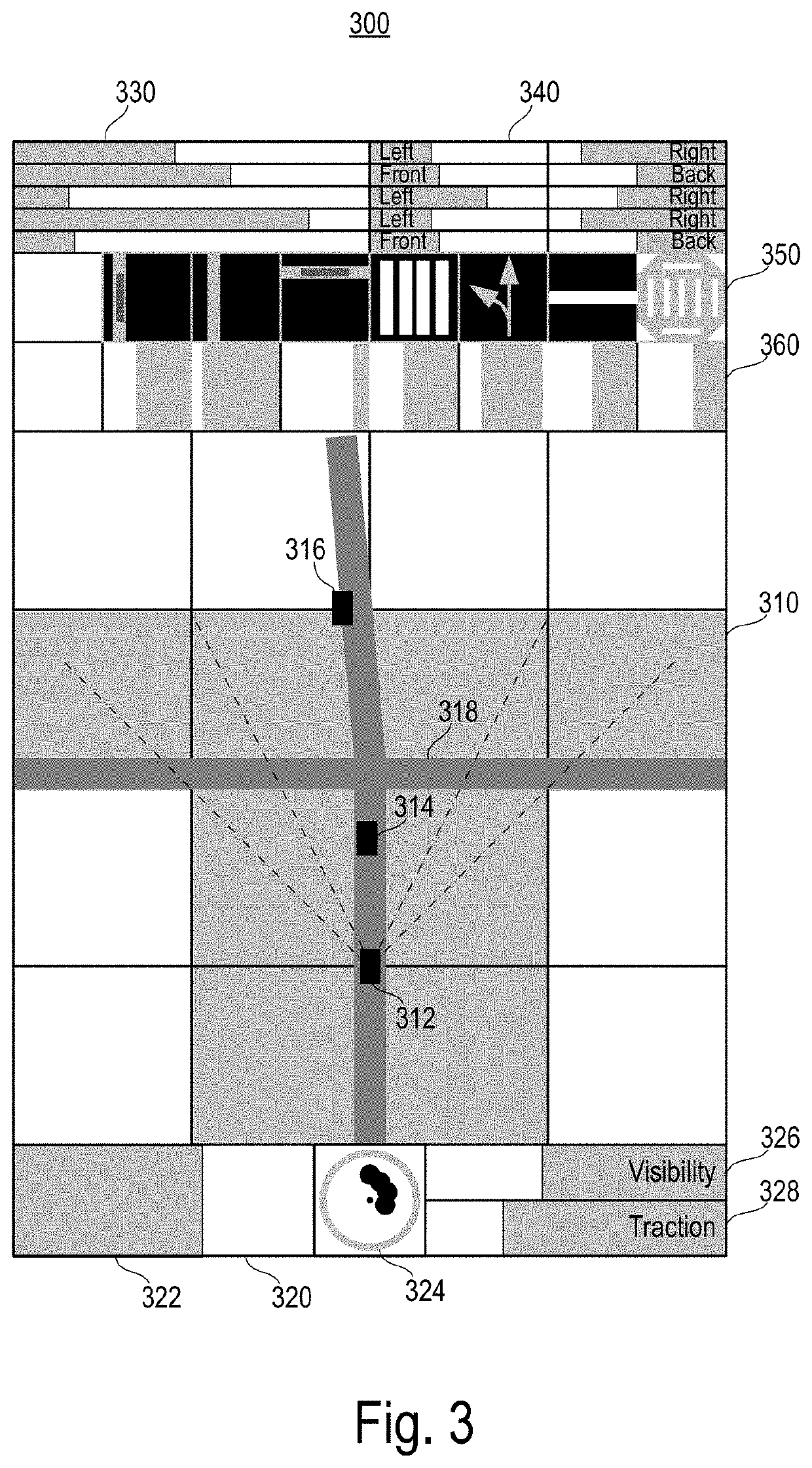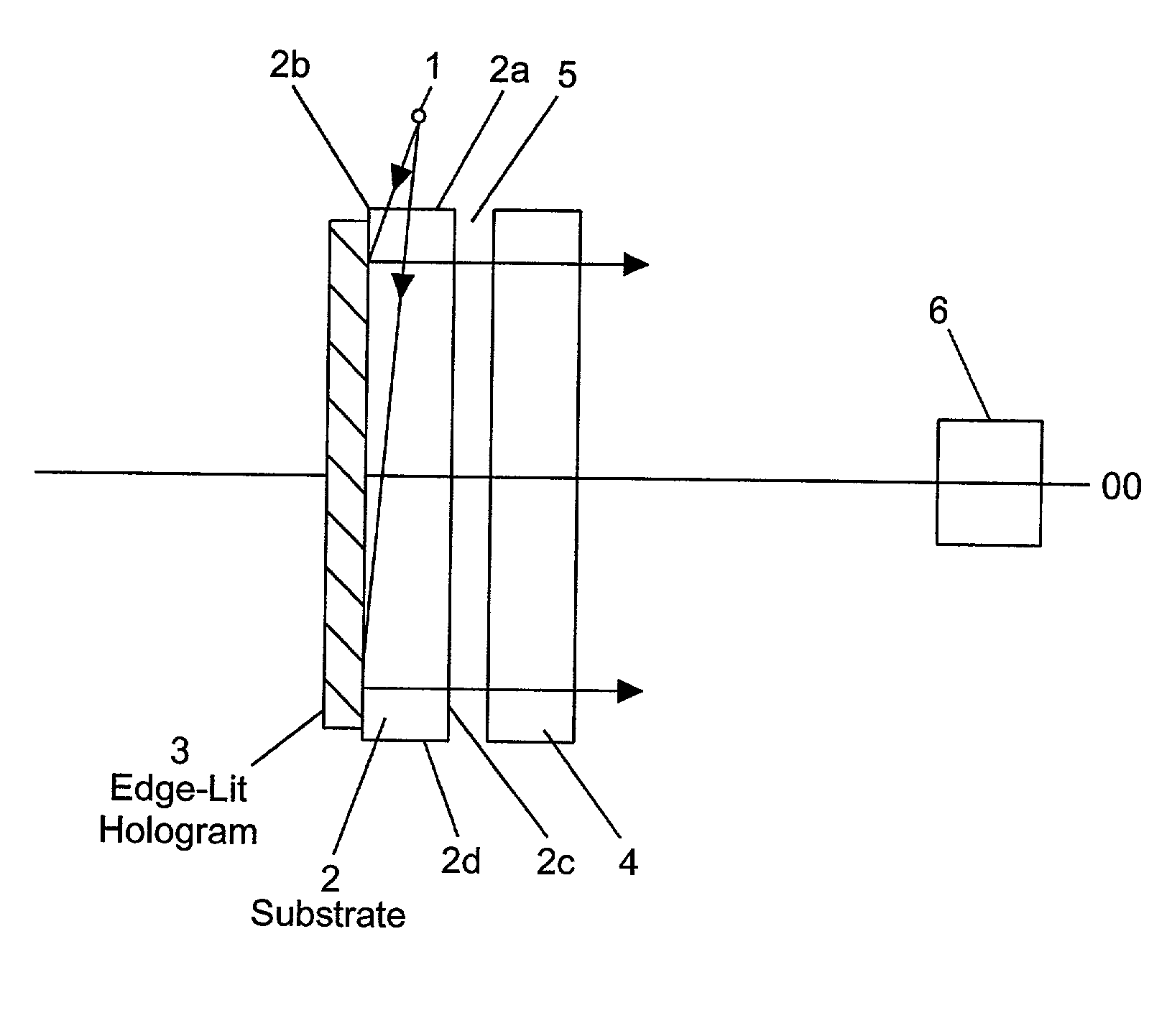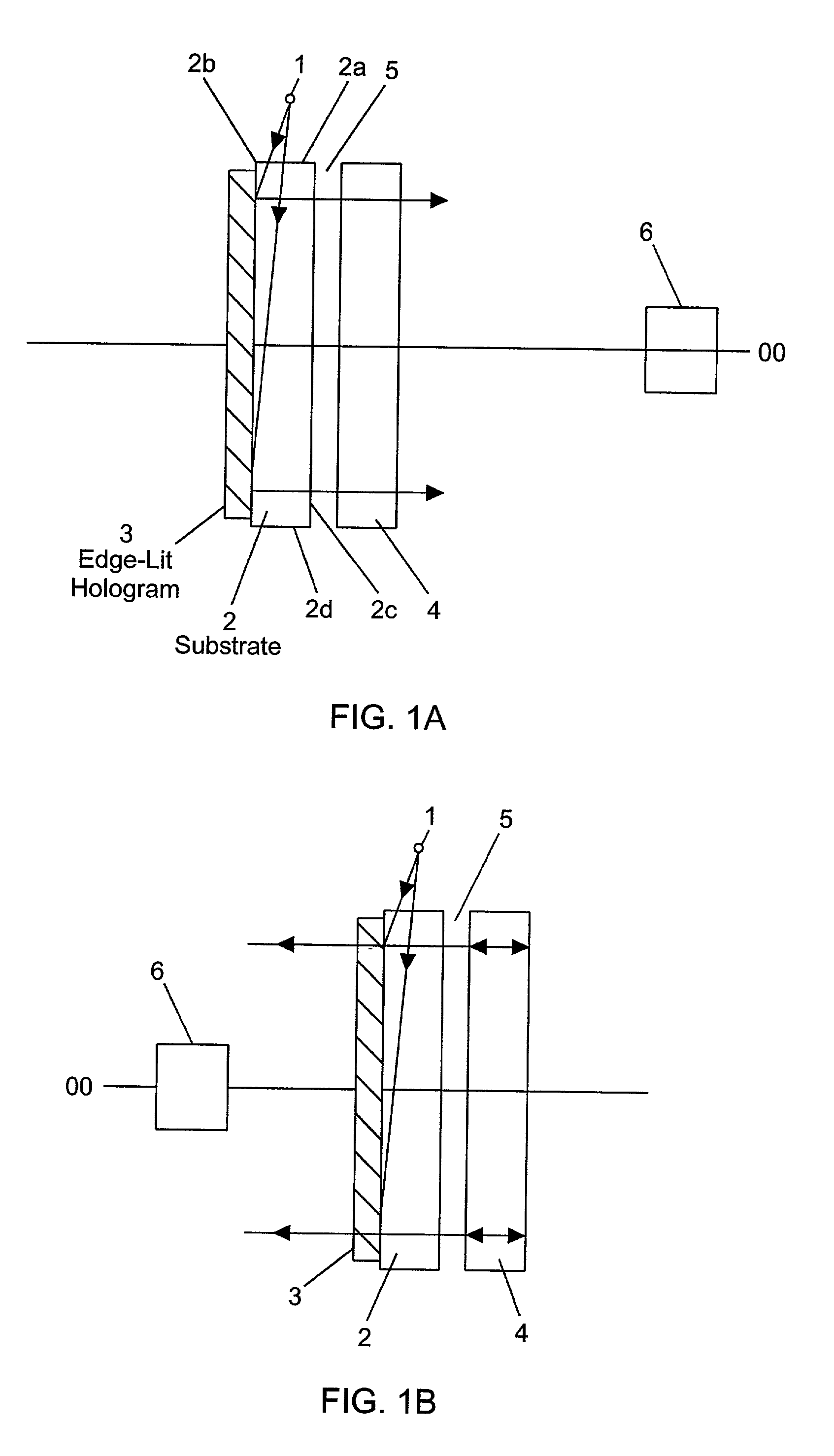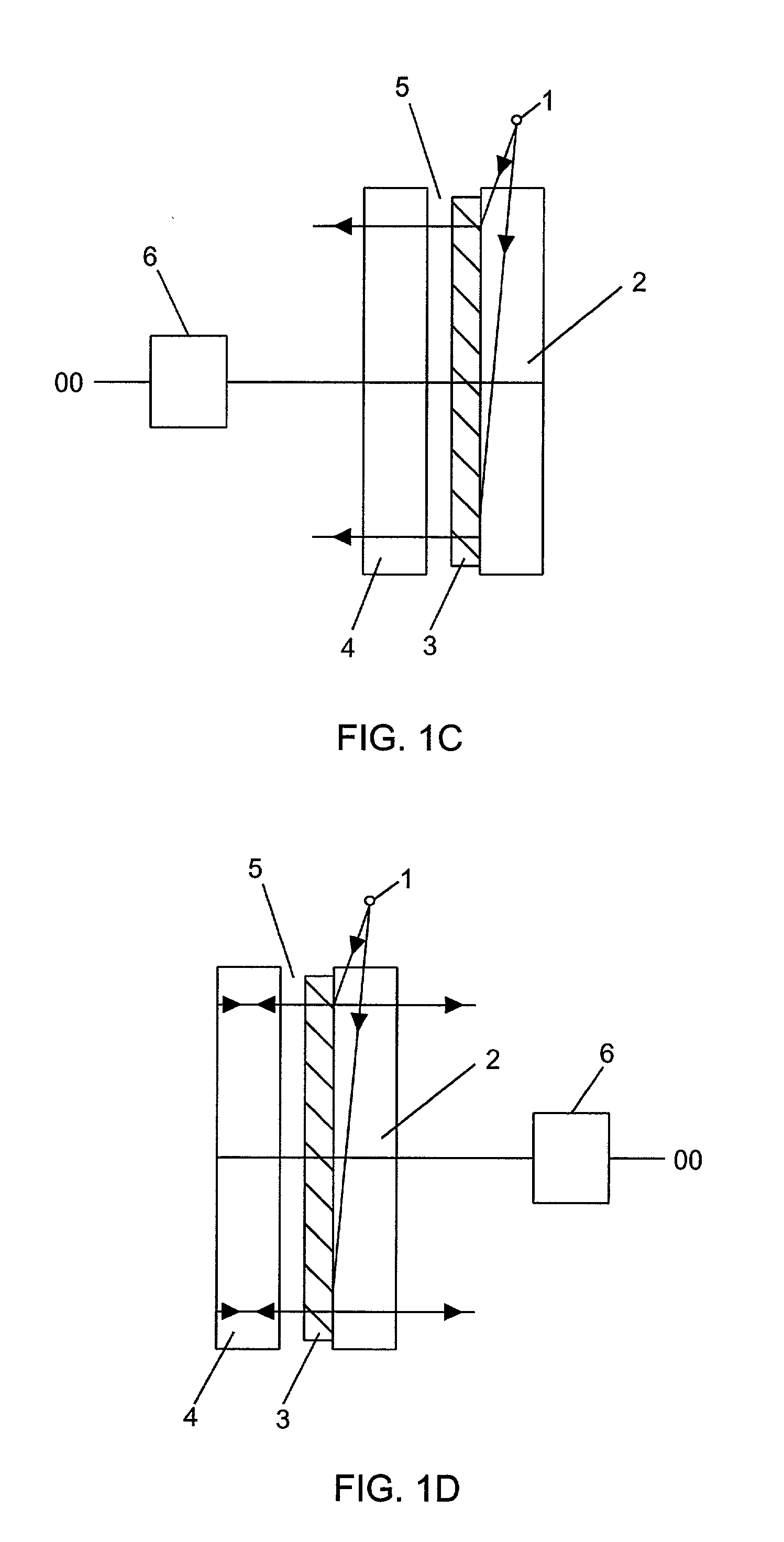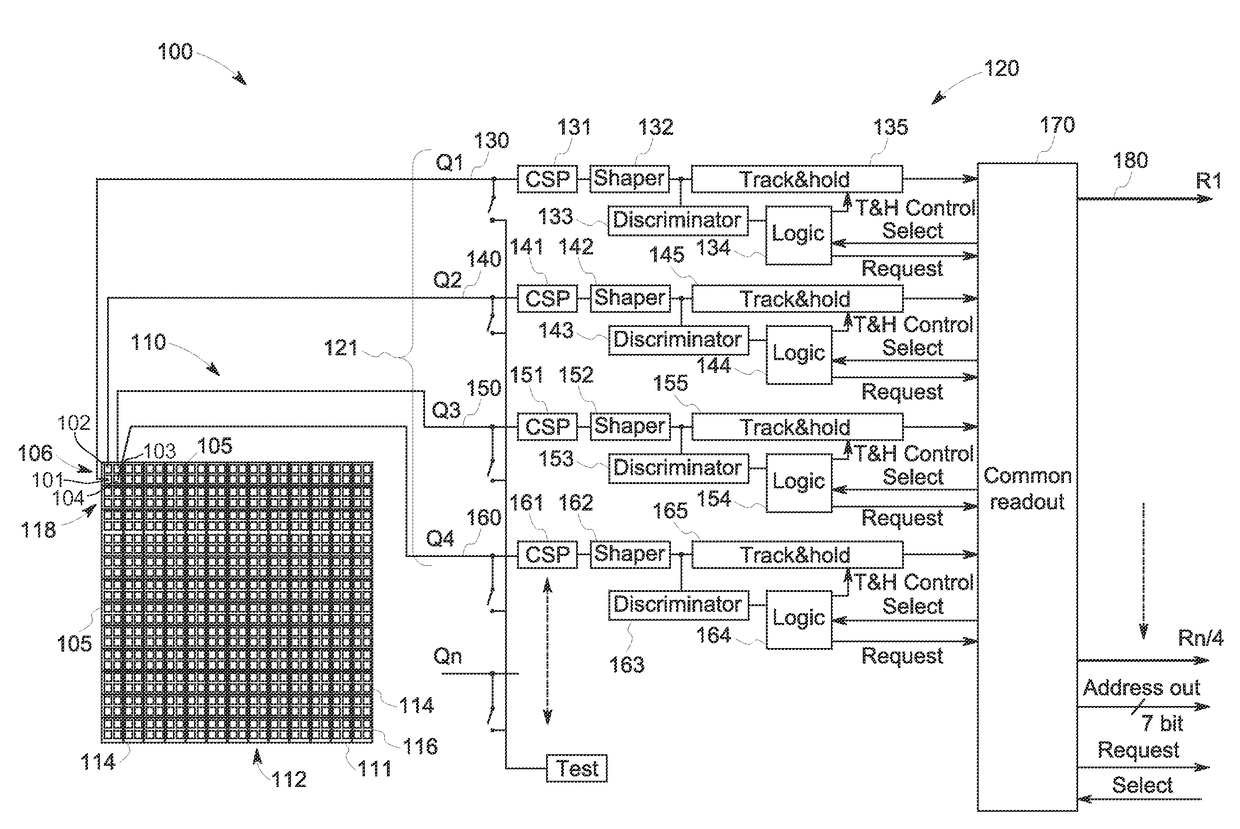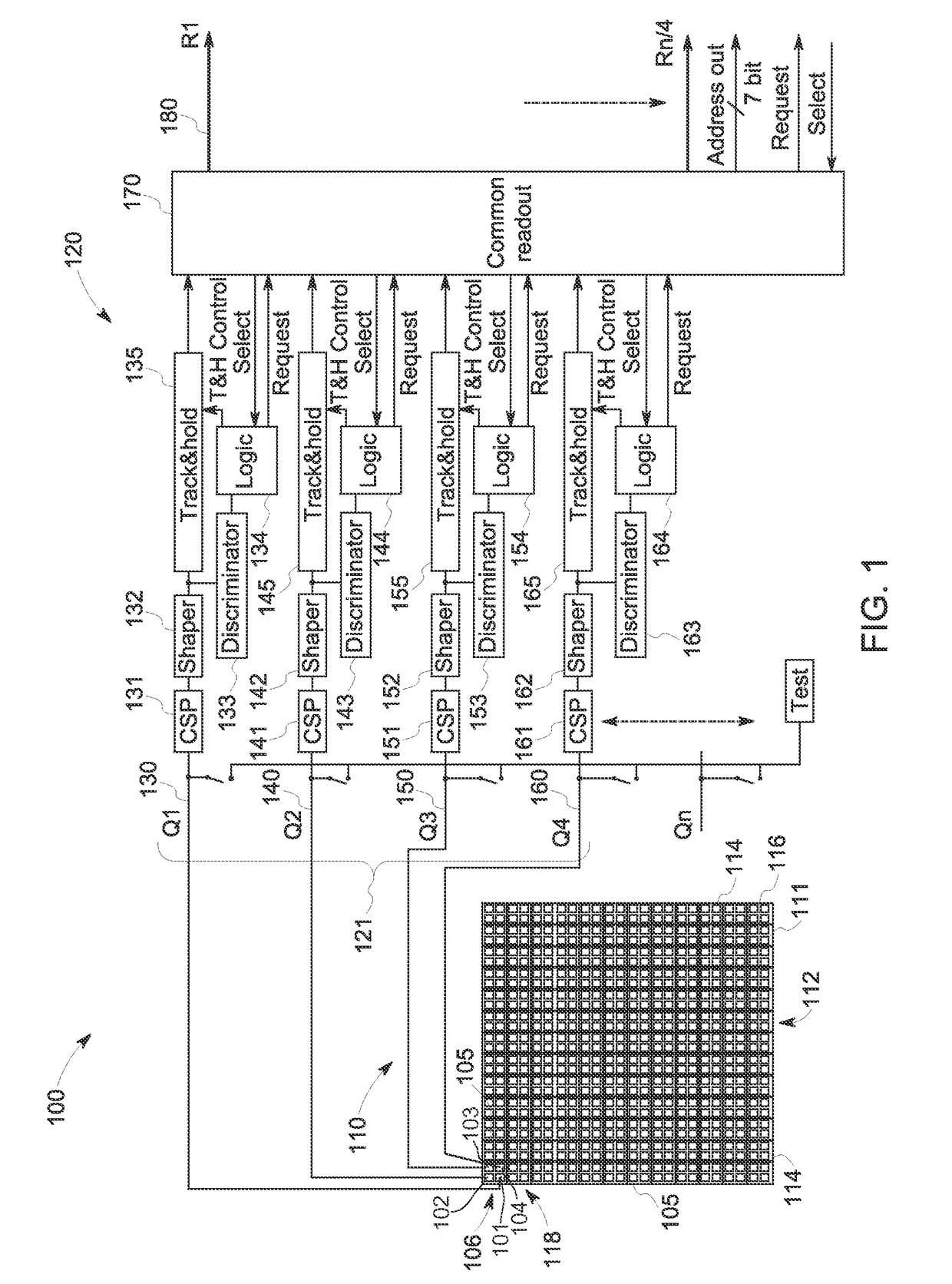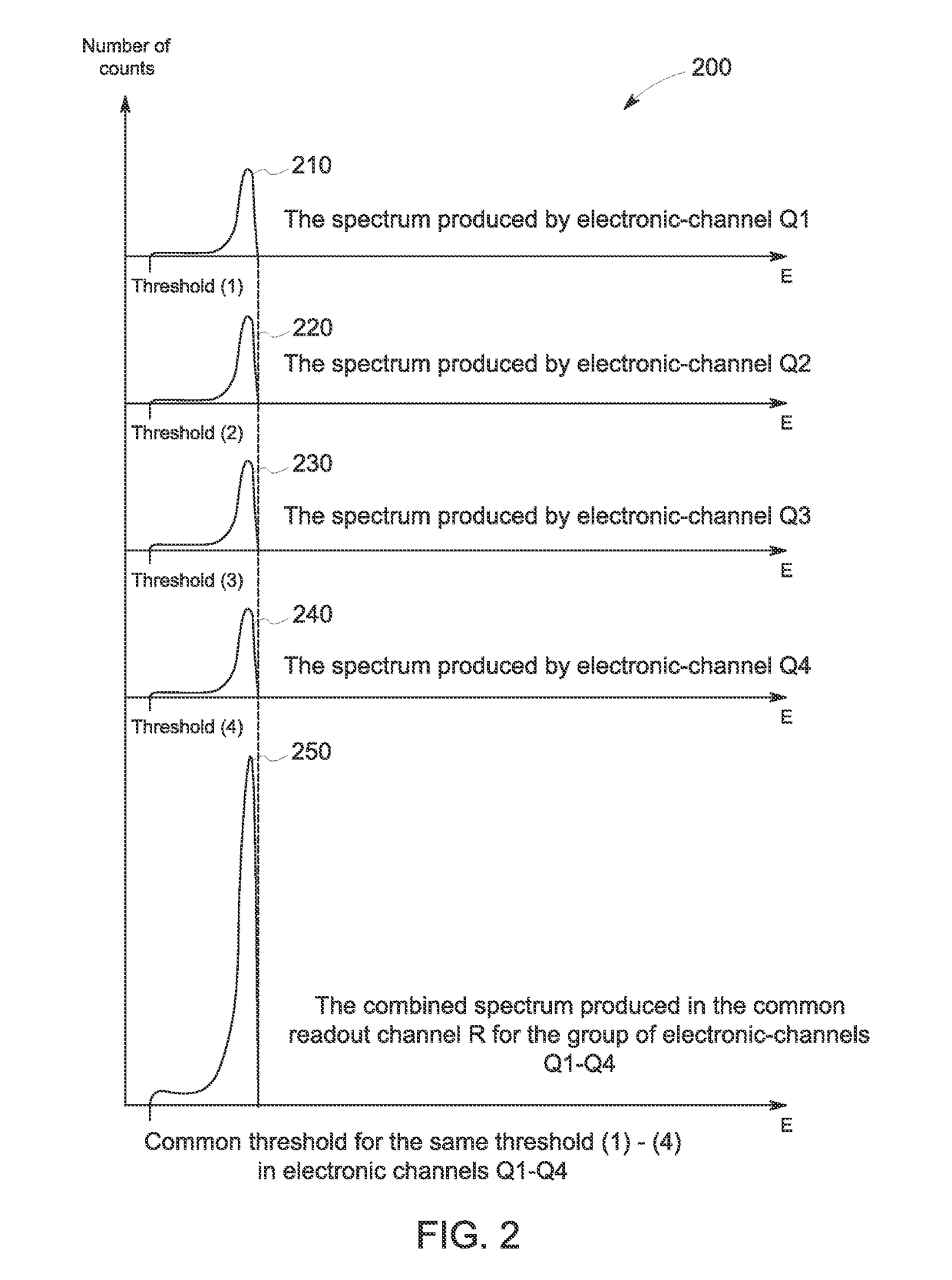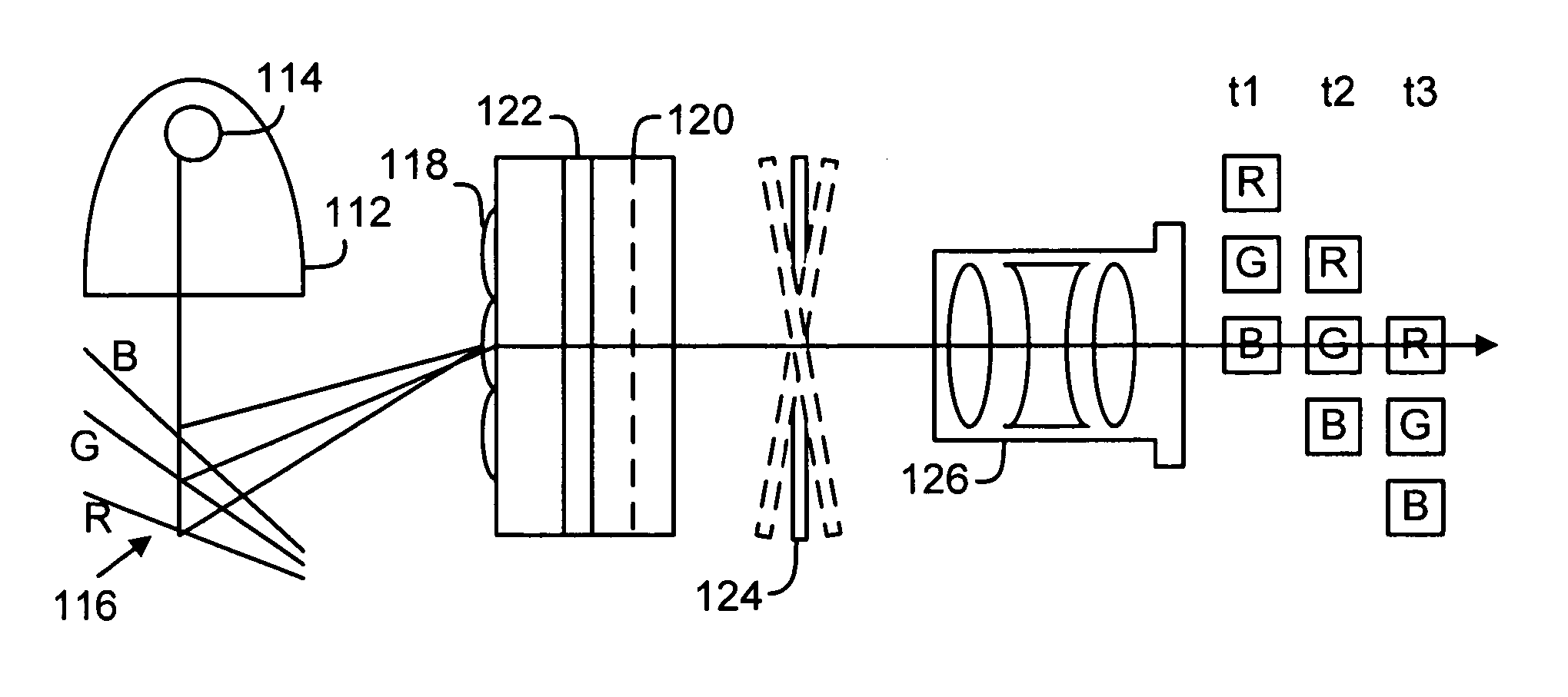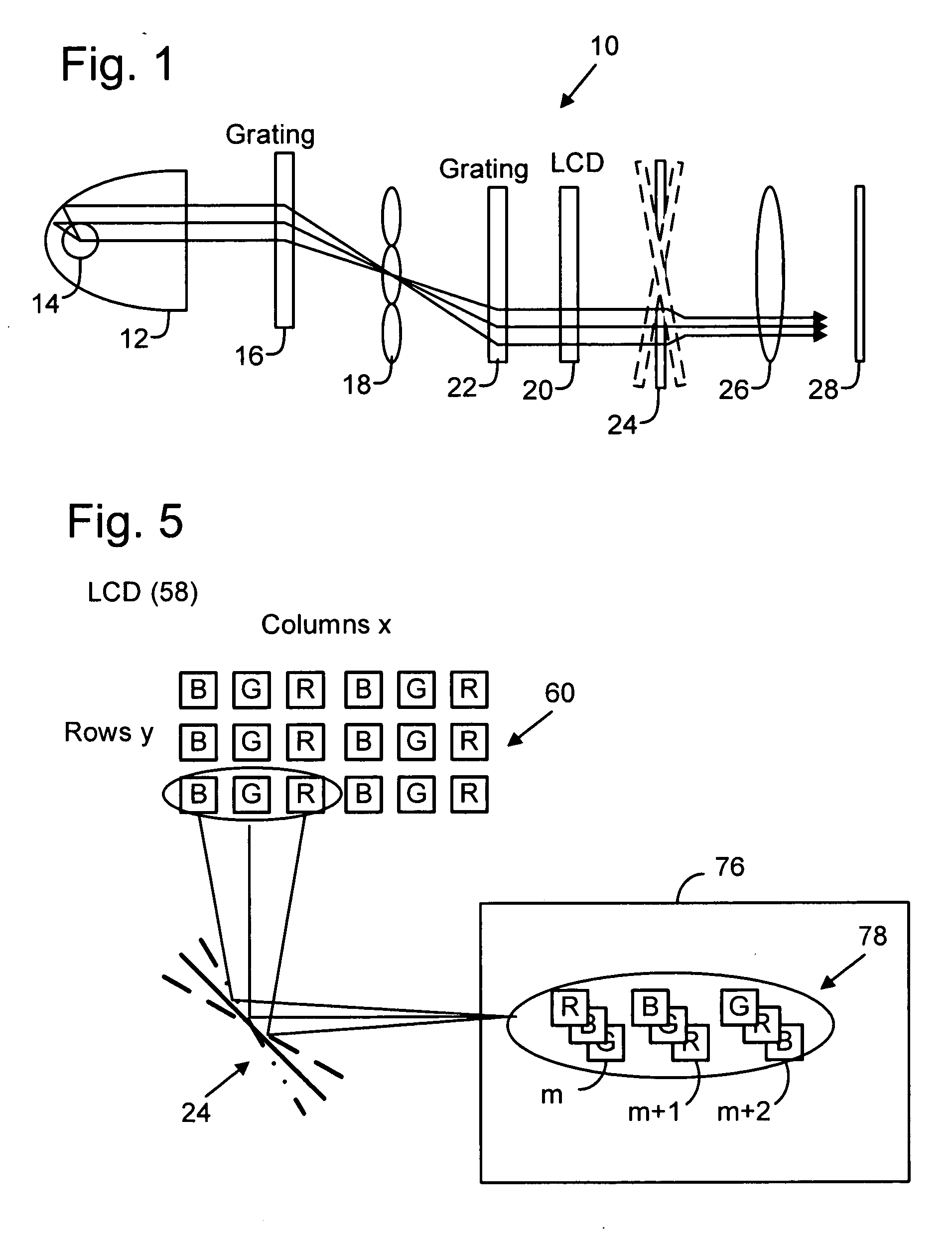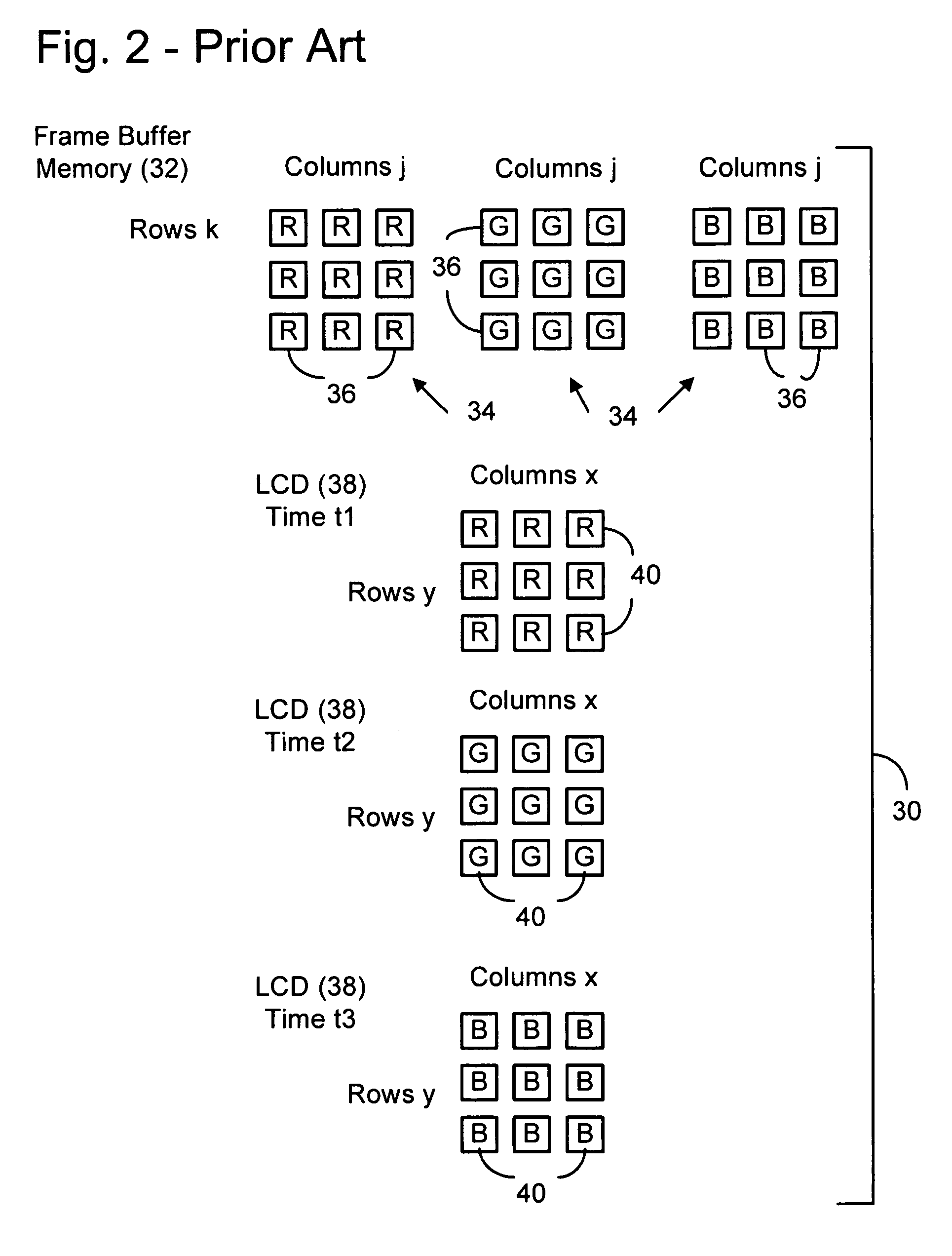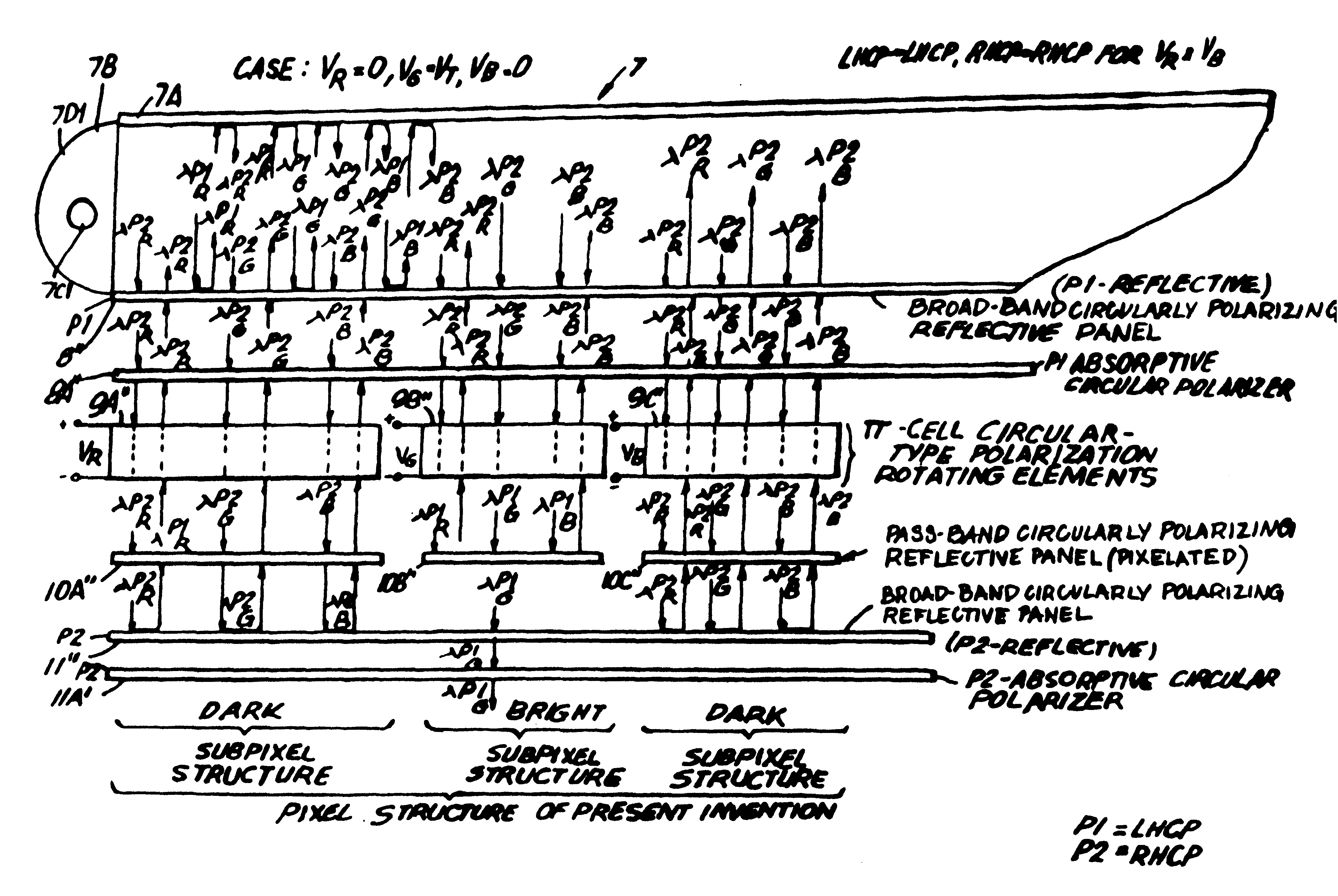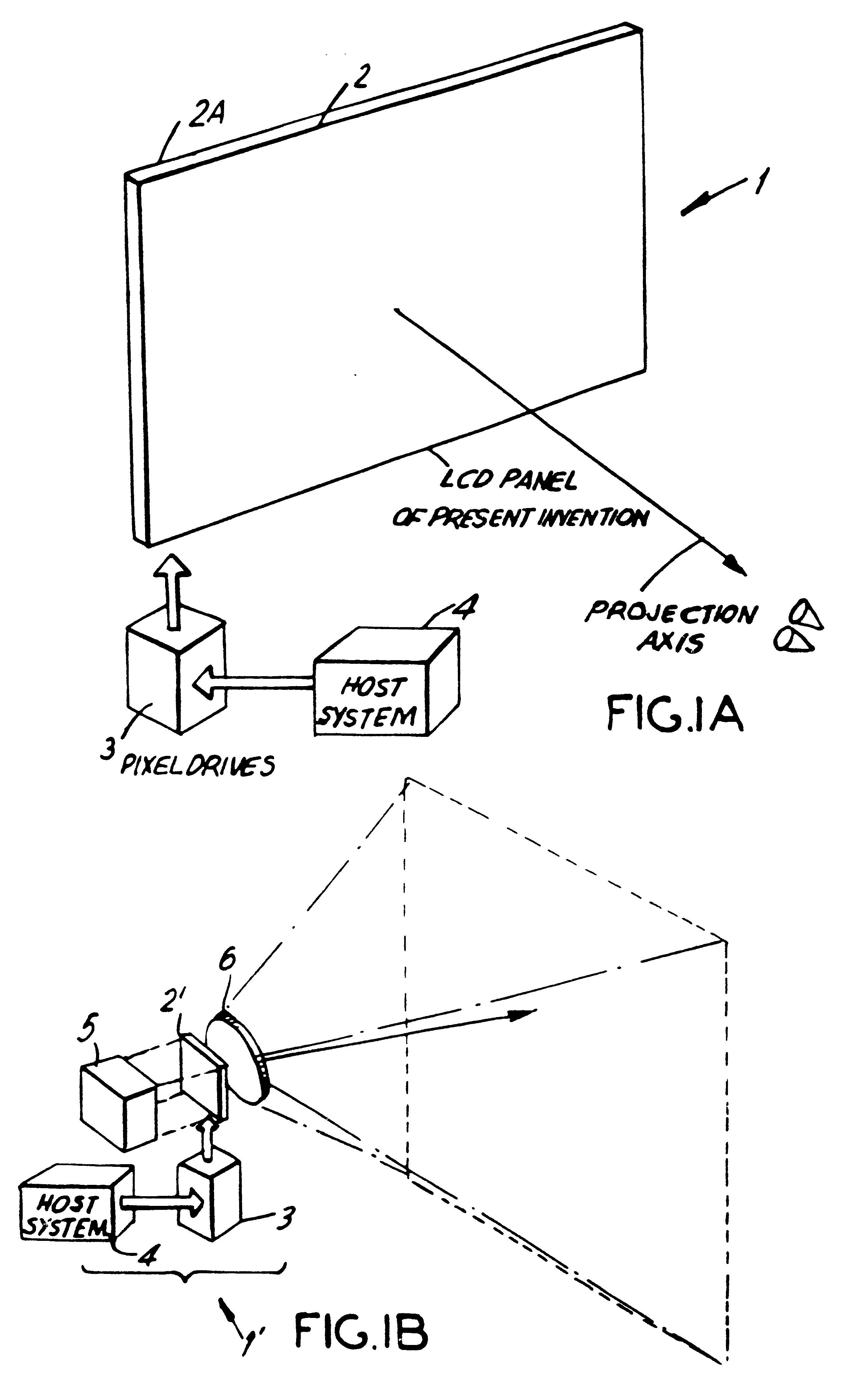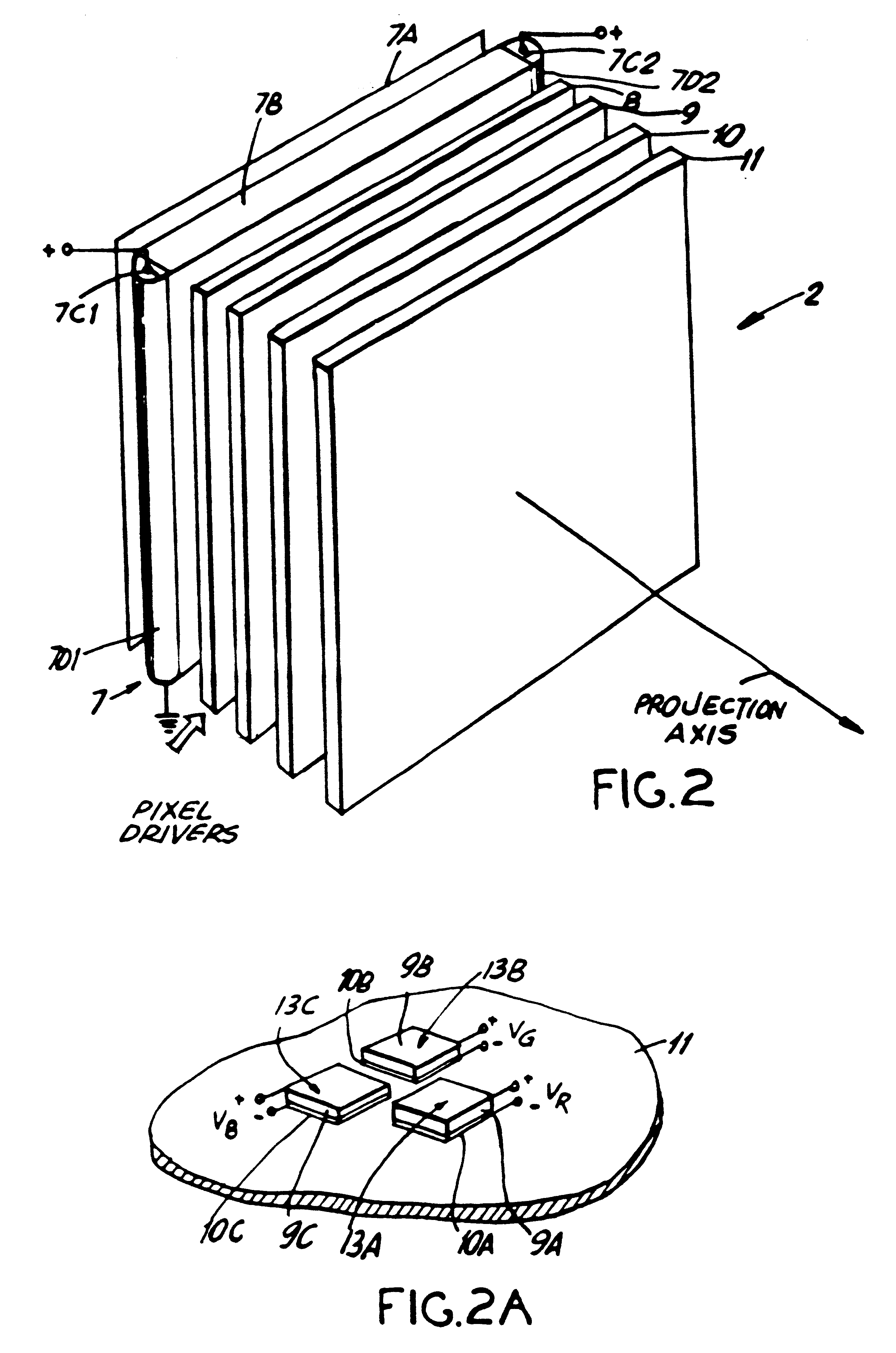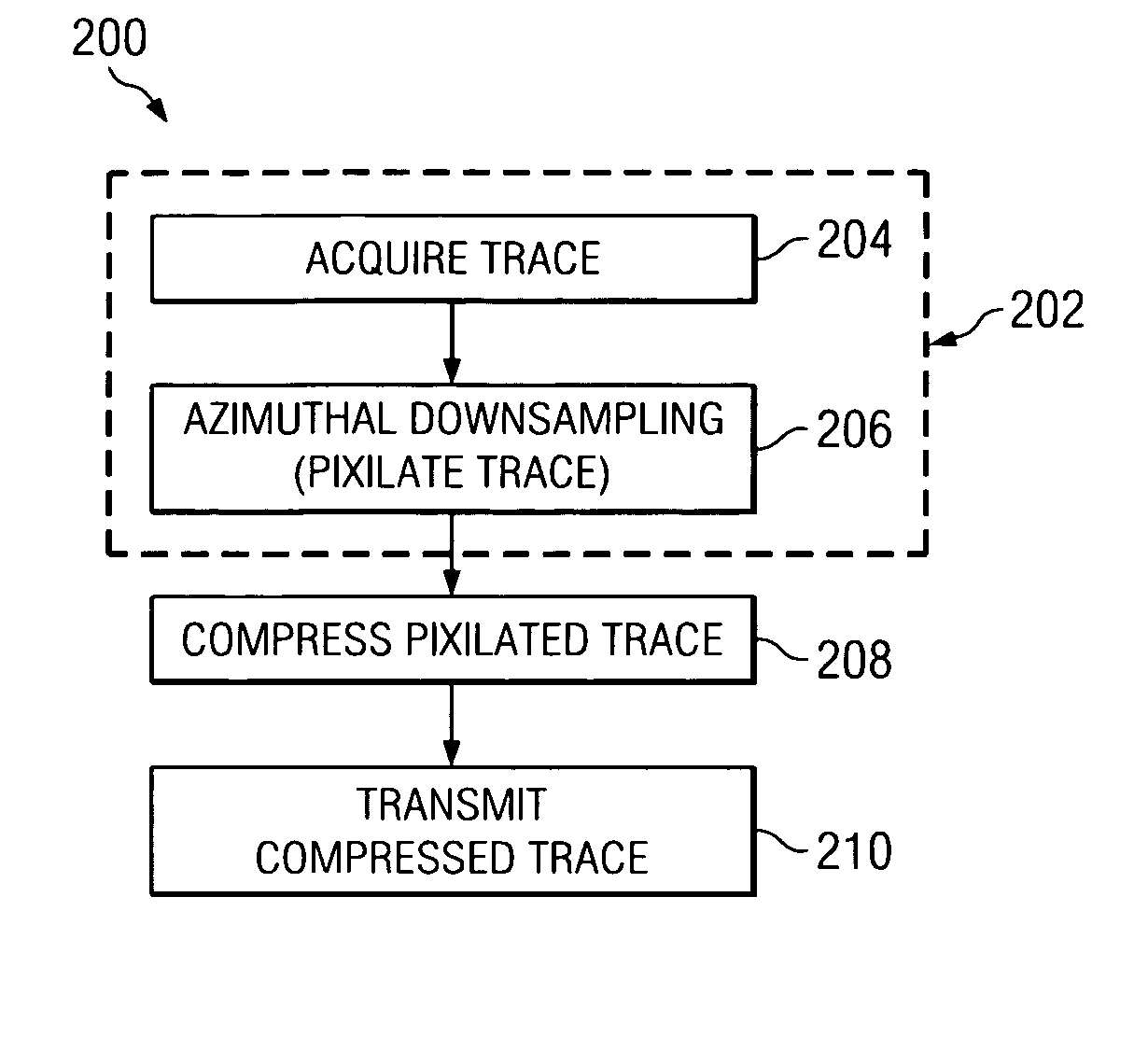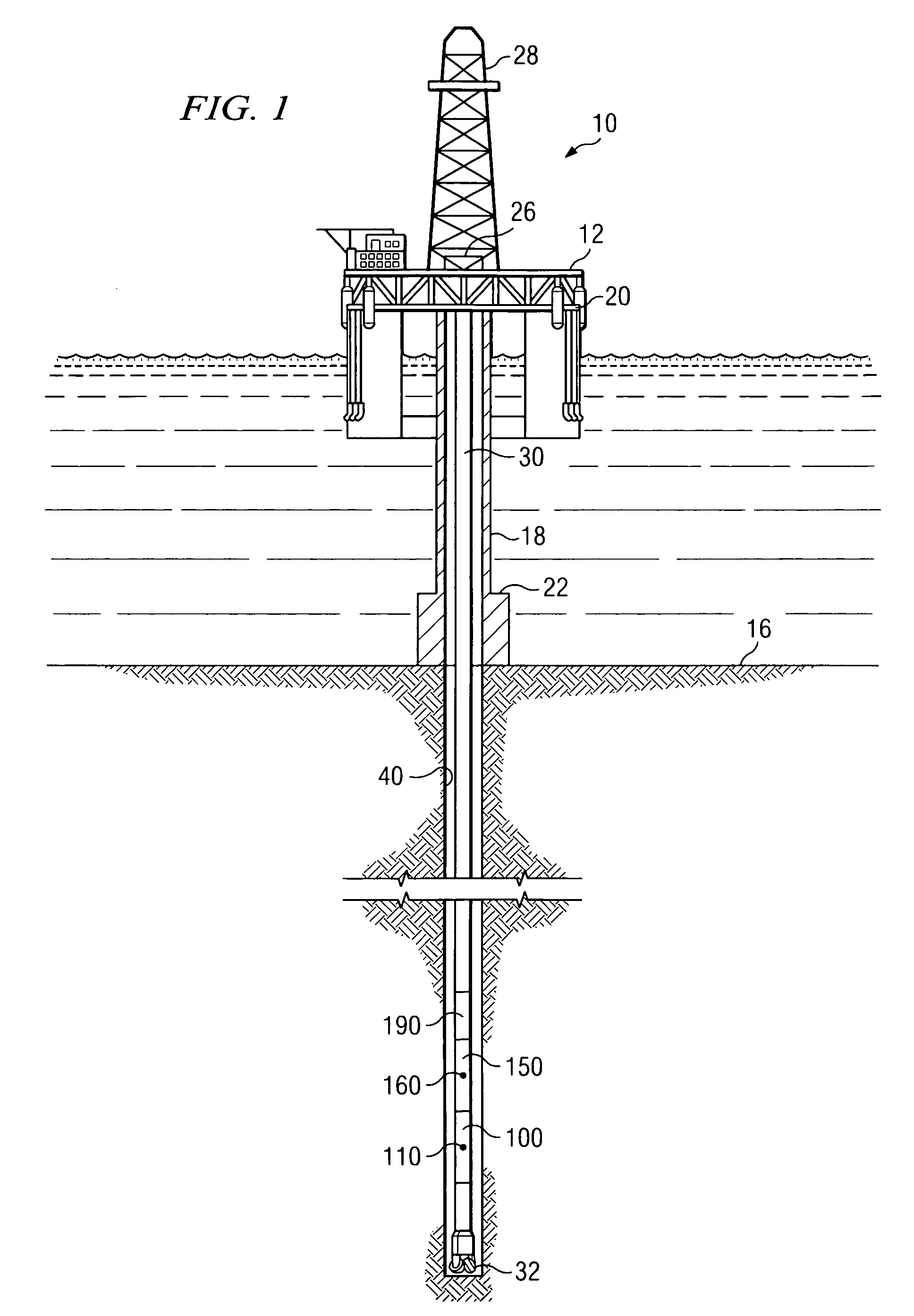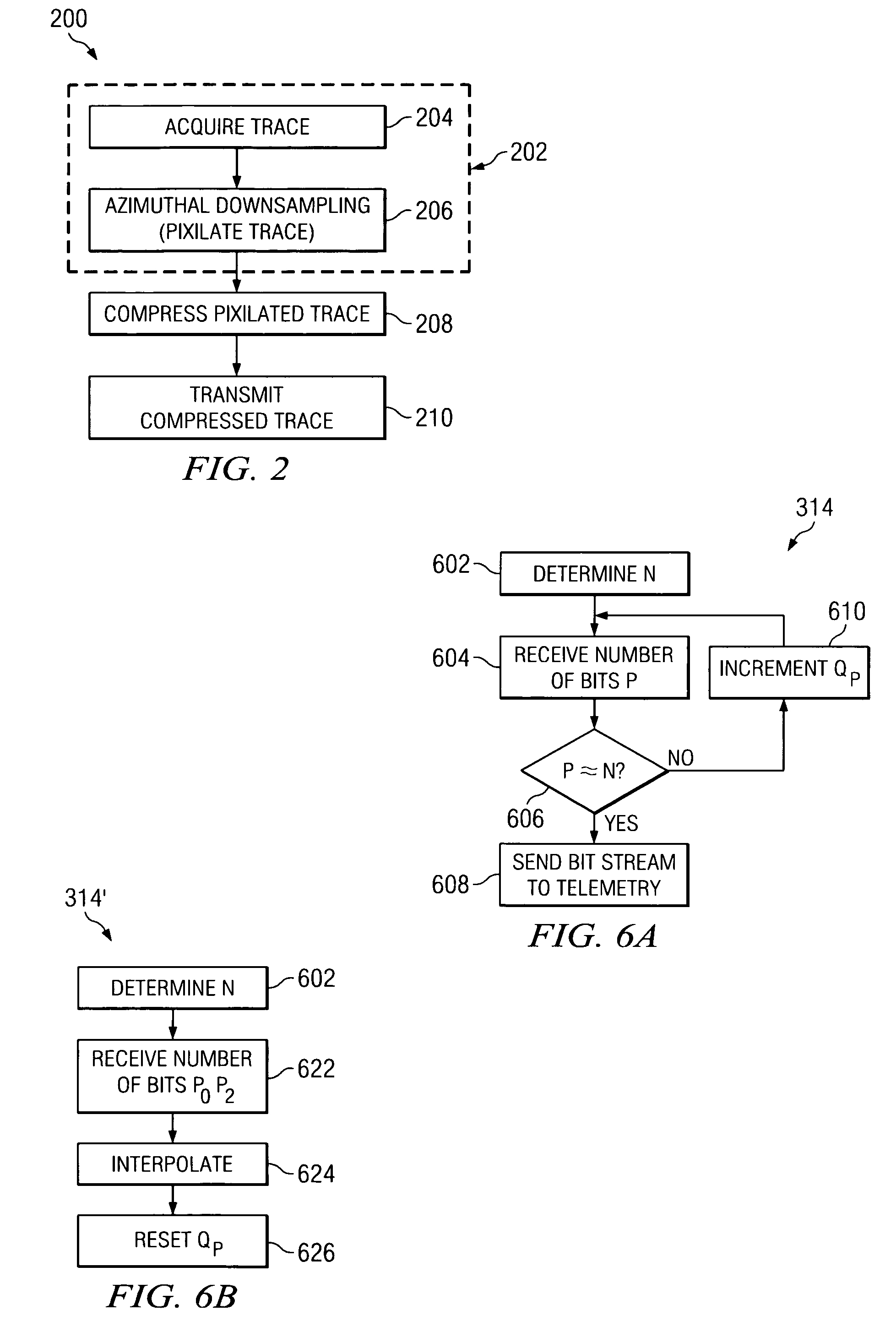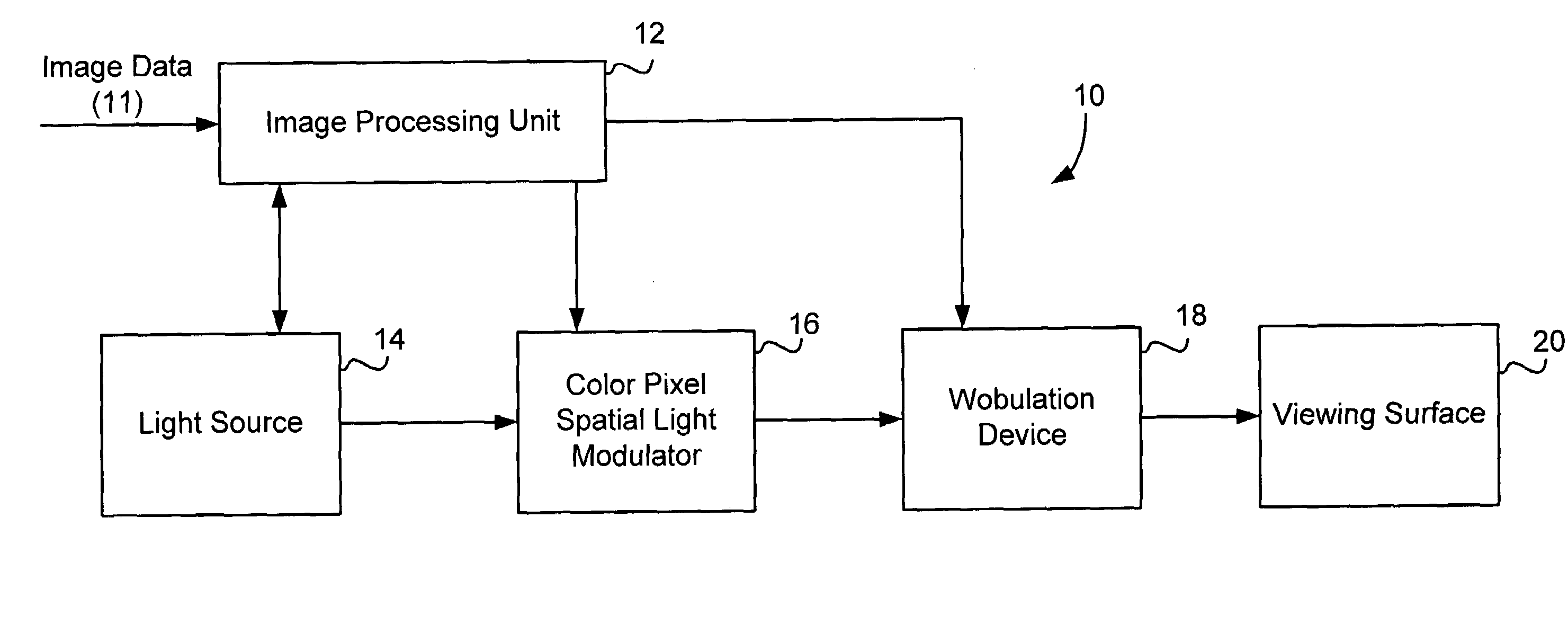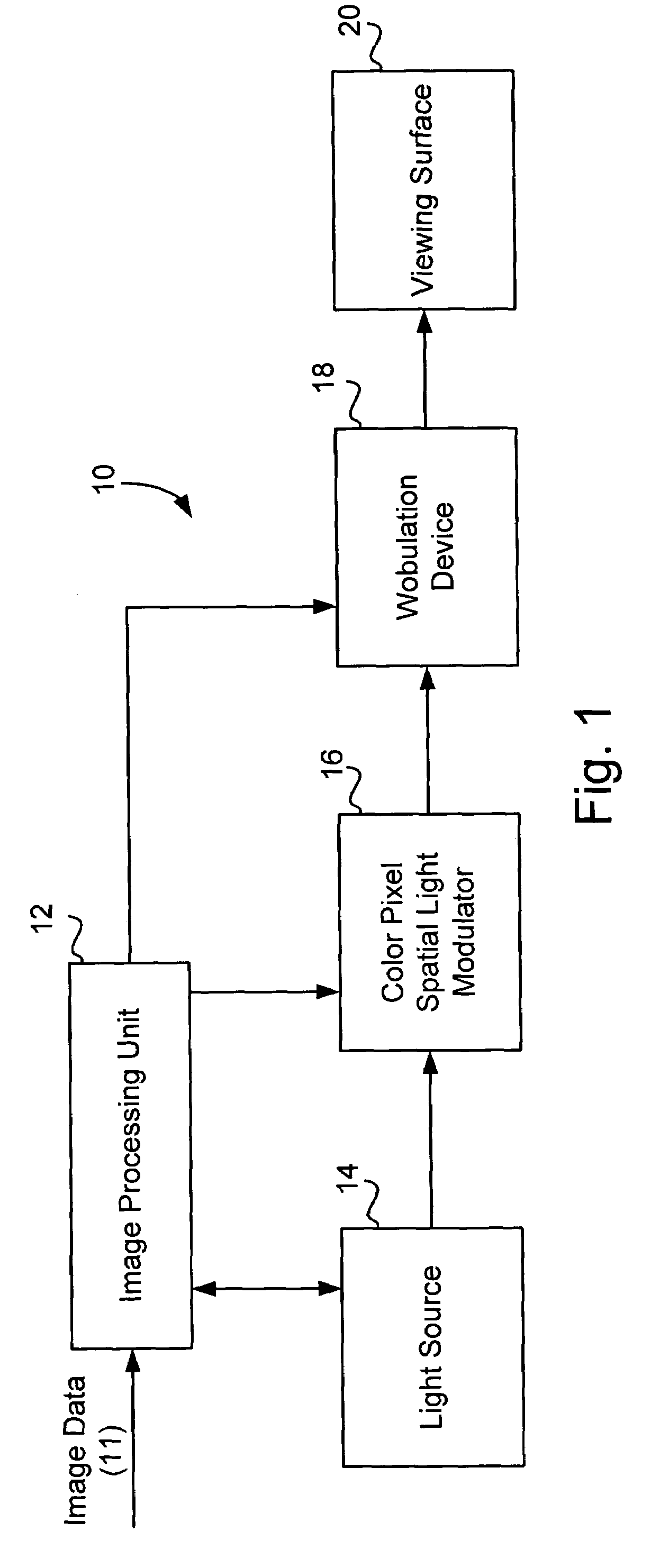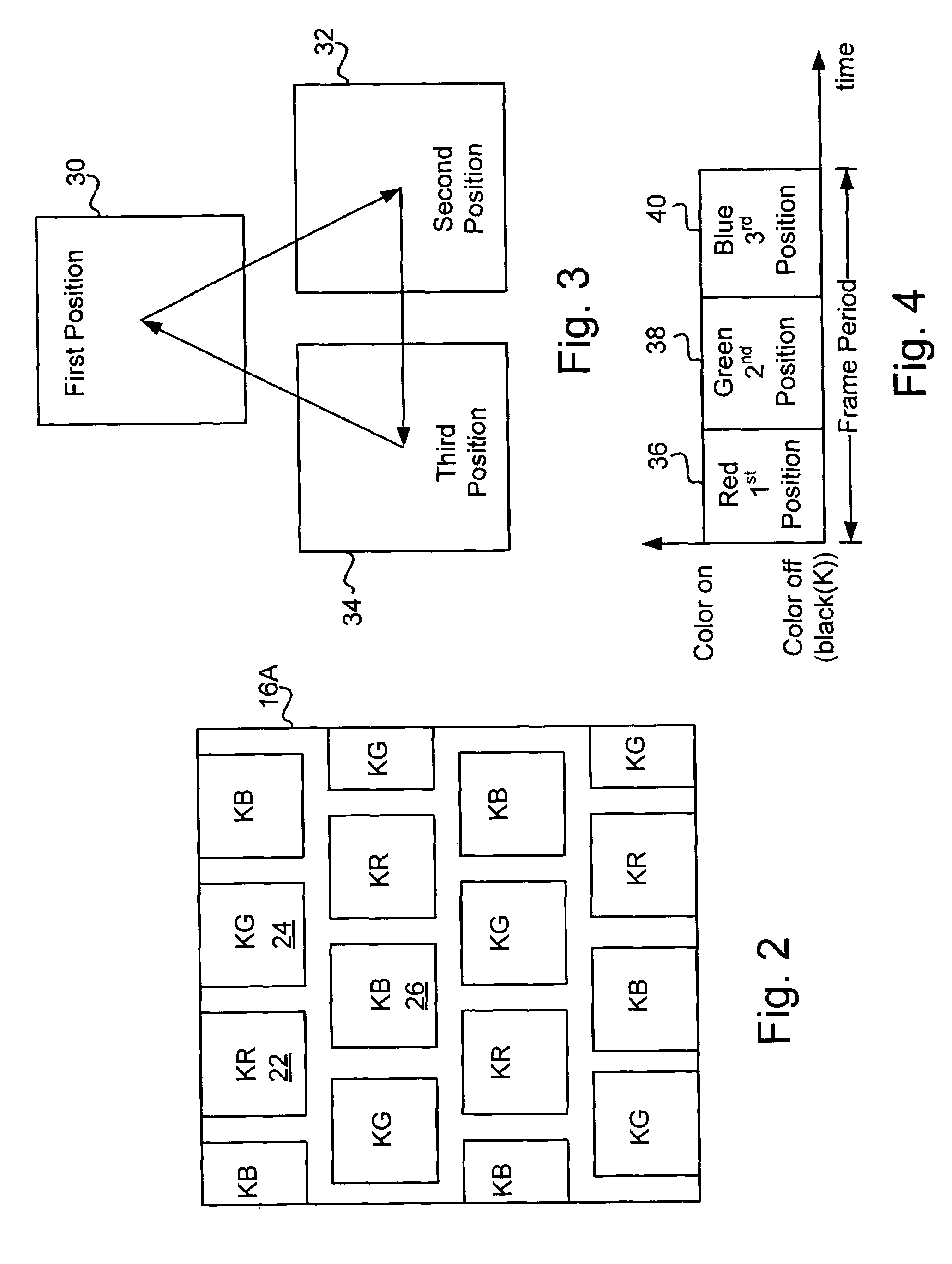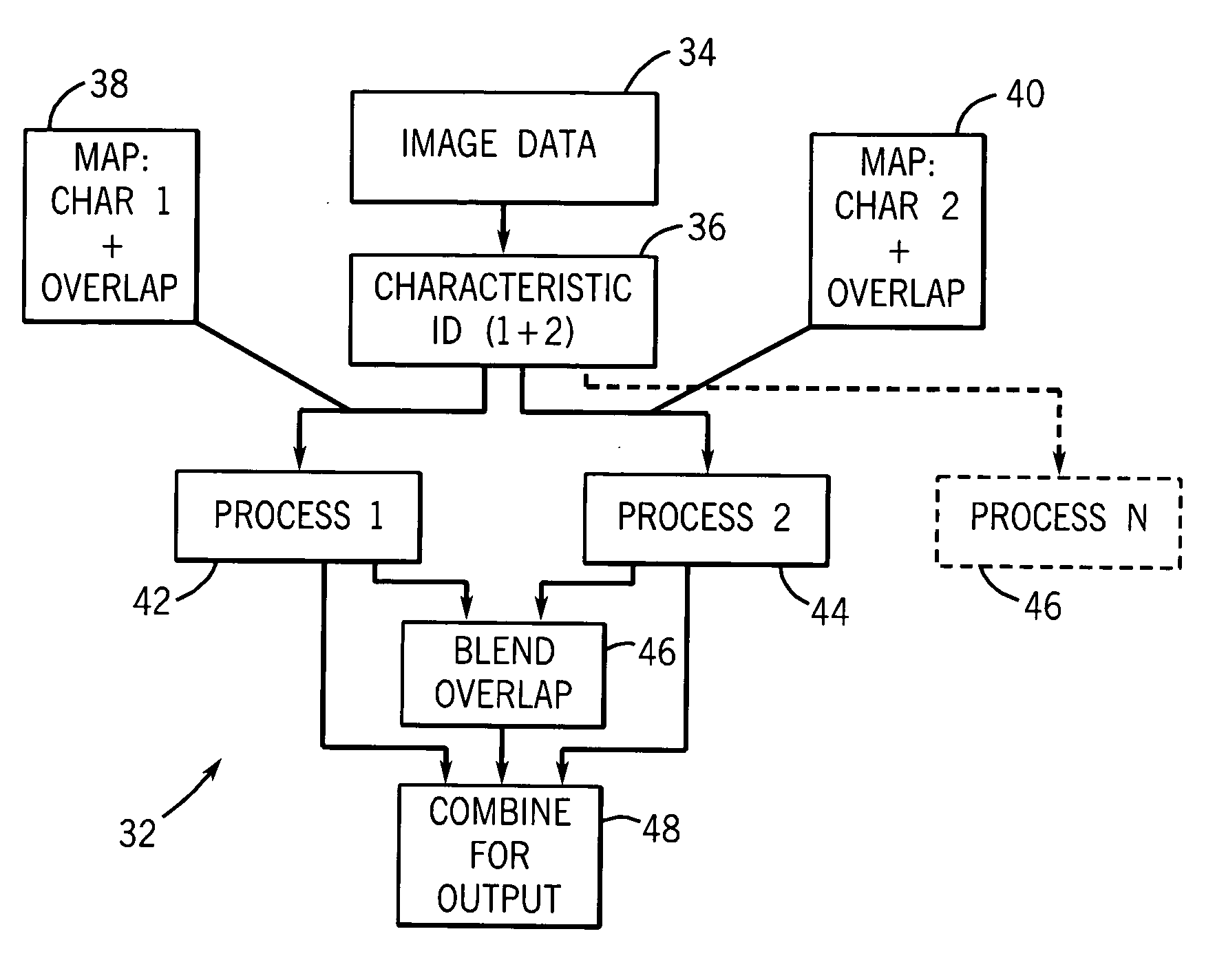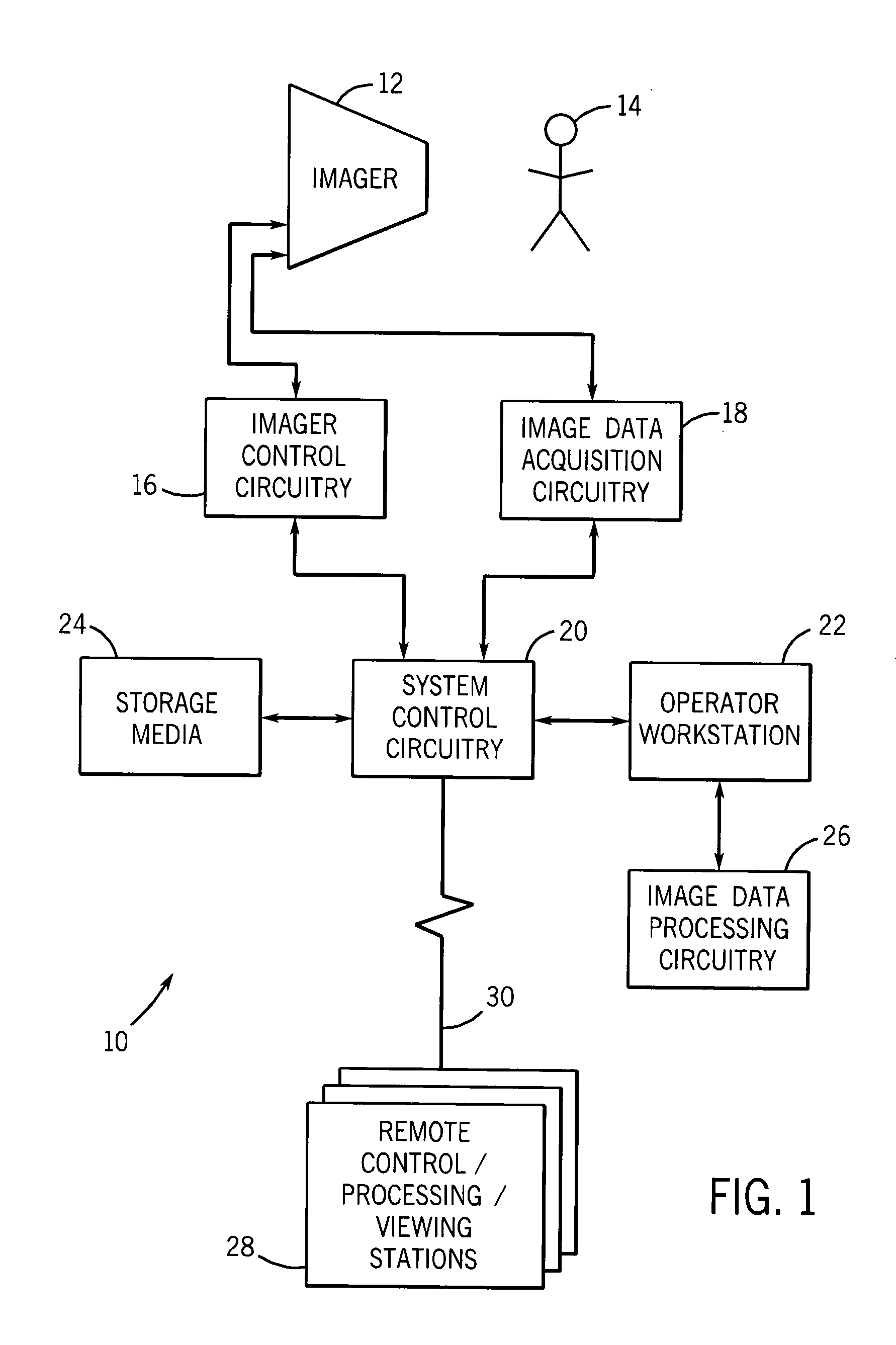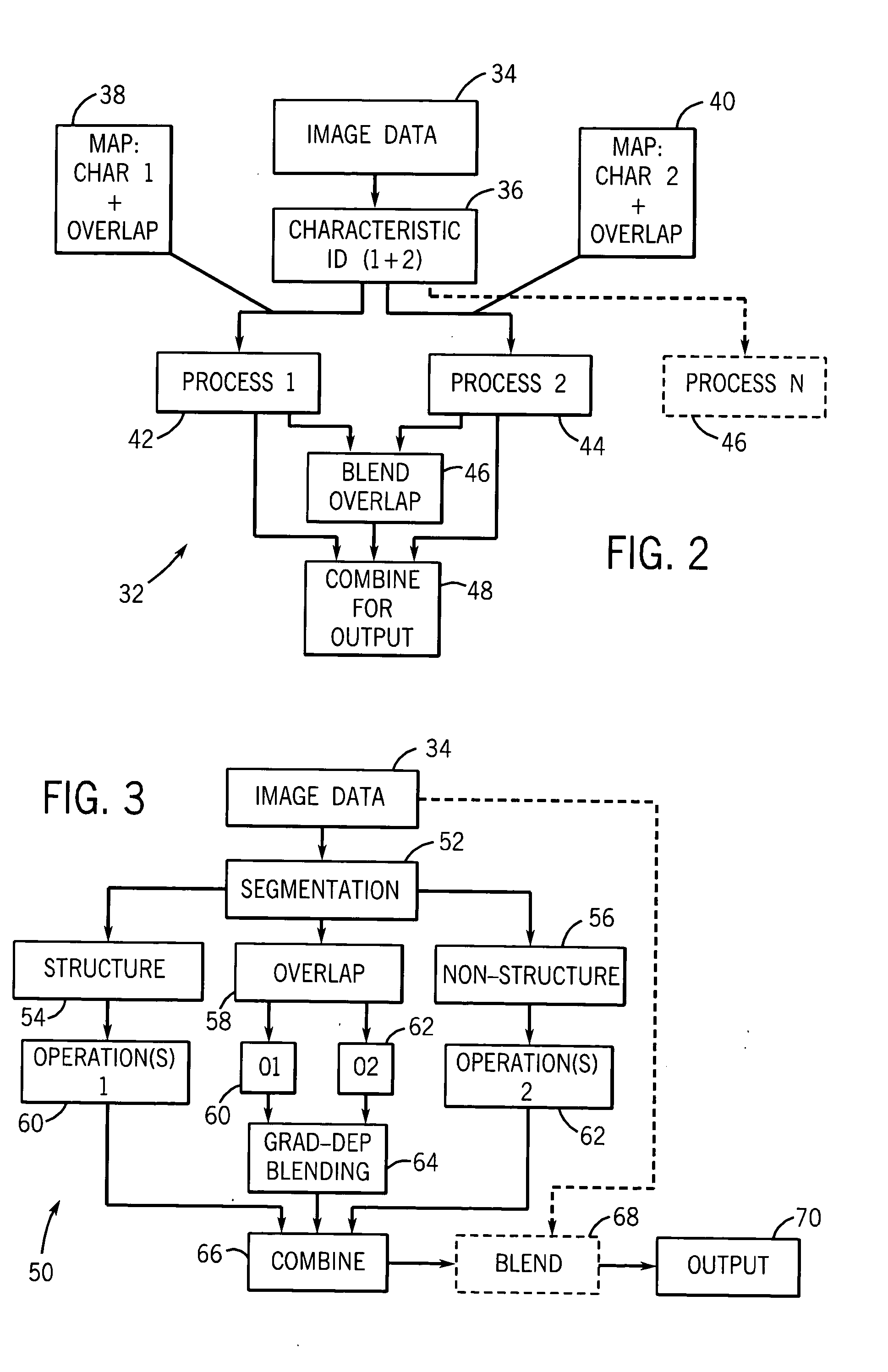Patents
Literature
407 results about "Pixelation" patented technology
Efficacy Topic
Property
Owner
Technical Advancement
Application Domain
Technology Topic
Technology Field Word
Patent Country/Region
Patent Type
Patent Status
Application Year
Inventor
In computer graphics, pixelation (or pixellation in British English) is caused by displaying a bitmap or a section of a bitmap at such a large size that individual pixels, small single-colored square display elements that comprise the bitmap, are visible. Such an image is said to be pixelated (pixellated in the UK).
Ultra-thin digital imaging device of high resolution for mobile electronic devices and method of imaging
InactiveUS20070263114A1Enhance the imageCompact integrationTelevision system detailsColor television detailsDigital imagingData set
An ultra-thin digital imaging device has a thickness of several millimeters and is capable of producing data for creating images of 3 Mp and higher. The device comprises a multi-channel imaging unit that contains a plurality of optical channels formed by microlens objectives and a pixilated image sensor unit with a plurality of sensing elements. Each individual identical image obtained through each optical channel is pixilated and converted into electrical signals that are processed into data sets which can be stored in the imaging device and either reproduced on the display of the device or transmitted to an external image-reproducing device where the obtained data of individual images are transformed into a single, high-resolution megapixel image by means of a technique known in the art.
Owner:MICROALIGN TECH
Intraocular Camera for Retinal Prostheses
ActiveUS20080086206A1Enhanced patient acceptabilityAdd depthHead electrodesEye treatmentControl signalRetinal Prosthesis
An intraocular camera for retinal prostheses may include an optical imaging system comprising a set of optical elements for forming an image of the external world on an image sensor array, wherein the optical elements and the image sensor array may be enclosed in an implantable biocompatible housing that may employ haptic elements for stabilization within the eye. The set of optical elements may be designed to have a short focal length and to provide adequate resolution images that can be transformed into a set of stimulation signals applied to a pixellated microstimulator array. Transmission of the signals from the intraocular camera to a microstimulator driver circuit may be accomplished either by a wired or wireless communication device. Power and control signals may be provided to the intraocular camera by a wired or wireless communication device, or optically by means of ambient illumination or an optical beam.
Owner:UNIV OF SOUTHERN CALIFORNIA
Image style migration method based on deep convolutional neural network
The invention discloses an image text description method based on a visual attention model. The main content comprises the followings: image inputting, loss function training, stylizing, image enhancing and image thinning; and the processes are as follows: an input image is firstly adjusted as a content image (256*256) with a dual-linear down-sampling layer, and then stylized through a style subnet; and then a stylized result as the first output image is up-sampled as an image in the size of 512*512, and then the up-sampled image is enhanced through an enhancement subnet to obtain the second output image; the second output image is adjusted as the image in the size of 1024*1024, and finally, a thinning subnet deletes locally pixelated artifact and further thins the result to obtain a high-resolution result. By use of the image style migration method disclosed by the invention, the brushwork of the artwork can be simulated more closely; multiple models are combined into a network so as to process the image with bigger and bigger size shot by a modern digital camera; and the method can be used for training the combined model to realize the migration of multiple artistic styles.
Owner:SHENZHEN WEITESHI TECH
Pixel-shifting projection lens assembly to provide optical interlacing for increased addressability
InactiveUS20050134805A1Reduce difficultySmall sizeTelevision system detailsProjectorsDisplay deviceProjection lens
A projection display system includes a projection lens assembly that has multiple projection lens elements that are configured to receive light imparted with display information by a pixelated display device. The projection lens elements project the light toward a display screen. A pixel-shifting element is included within the projection lens assembly to cyclically shift between at least two positions within the projection lens assembly to form at a display screen at least two interlaced arrays of pixels. An electromechanical transducer is coupled to the pixel-shifting element to impart on it the cyclic shifting between positions.
Owner:3M INNOVATIVE PROPERTIES CO
Multispectral imager with hybrid double layer filter array
ActiveUS20150144770A1Low costNarrow bandwidthSolid-state devicesNanoopticsTransmittanceColor filter array
Hybrid dual layer filter can be employed can be employed as filters. A multispectral imager comprises a two layer filter array monolithically integrated onto detector array, a top layer of pigment based filter and a lower layer of plasmonic nano-optic filter to make a low cost and narrow bandwidth filter without side leaking or side peaks. Multispectral imager comprises a microlens array, a mosaic patterned optical filter array underlying the microlens array and including a two-dimensional repetition of a unit mosaic pattern, and a pixelated detector array underlying the mosaic patterned optical filter array. The unit mosaic pattern comprises an array of composite filter elements having different peaks in a respective transmittance spectrum. Each composite filter element comprises a pigment based filter portion and a plasmonic nano-optic filter portion.
Owner:NANOLAMBDA KOREA
Orthorectification and mosaic of video flow
InactiveUS20120114229A1Meet the requirementsDescribe wellGeometric image transformationPhotogrammetry/videogrammetryAerial videoVideo image
A method and system are disclosed for creating a real-time, high accuracy mosaic from an aerial video image stream by applying orthorectification of each original video image frame using known ground control points, utilizing a photogrammetric model resolving the object image into pixilation, applying shading to the pixellation, and mosaicking the shaded pixilation of several orthorectified images into a mosaicked image where the mosaicked image is then scaled to the known original image dimensions.
Owner:OLD DOMINION UNIVERSITY RESEARCH FOUNDATION
Pixel-shifting projection lens assembly to provide optical interlacing for increased addressability
InactiveUS20050225732A1Reduce difficultySmall sizeTelevision system detailsProjectorsDisplay deviceProjection lens
A projection display system includes a projection lens assembly that has multiple projection lens elements that are configured to receive light imparted with display information by a pixelated display device. The projection lens elements project the light toward a display screen. A pixel-shifting element is included within the projection lens assembly to cyclically shift between at least two positions within the projection lens assembly to form at a display screen at least two interlaced arrays of pixels. An electromechanical transducer is coupled to the pixel-shifting element to impart on it the cyclic shifting between positions.
Owner:3M INNOVATIVE PROPERTIES CO
Surface defect detection
ActiveUS20180268257A1Quickly and efficiently trainableImage enhancementImage analysisLearning machineNetwork on
A method is provided of forming a neural network for detecting surface defects in aircraft engine components. The method includes: providing (i) a pre-trained deep learning network and (ii) a learning machine network; providing a set of pixelated training images of aircraft engine components exhibiting examples of different classes of surface defect; training the trainable weights of the learning machine network on the set of training images.
Owner:ROLLS ROYCE PLC
Intraocular camera for retinal prostheses
ActiveUS8197539B2Enhanced patient acceptabilityEliminate needHead electrodesEye treatmentSensor arrayDriver circuit
Owner:UNIV OF SOUTHERN CALIFORNIA
Color-corrected projection lenses for use with pixelized panels
Owner:3M INNOVATIVE PROPERTIES CO
Drawing processing apparatus and drawing processing method for multipass rendering
ActiveUS20060267981A1Efficient executionMultiple digital computer combinationsProcessor architectures/configurationComputer graphics (images)Granularity
A drawing processing apparatus capable of executing a drawing processing program having conditional branches efficiently by multipass rendering. The drawing processing apparatus comprises arithmetic processing parts including an object input part, a primitive generating part, a raster part, a pixelation part, a distribution part, and a shader which constitute pipeline stages. The shader divides the program into and executes the same in a plurality of passes depending on conditional branches. The shader generates enable flags determining whether or not respective pixels satisfy branch conditions. The flag generating part generates bind enable flags which are the enable flags on the pixels bound into the processing granularities of the pipeline stages, and feeds back the same to the respective pipeline stages. The arithmetic processing parts in the individual pipeline stages refer to the bind enable flags and limit the submission of data not targeted for arithmetic processing in the branched passes.
Owner:SONY COMPUTER ENTERTAINMENT INC
Alternative detector configuration and mode of operation of a time delay integration particle analyzer
InactiveUS6947128B2Spectrum generation using refracting elementsAcquiring/recognising microscopic objectsOperation mode3d space
Light from an object moving through an imaging system is collected, dispersed, and imaged onto a time delay integration (TDI) detector that is inclined relative to an axis of motion of the object, producing a pixilated output signal. In one embodiment, the movement of the image object over the TDI detector is asynchronous with the movement of the output signal producing an output signal that is a composite of the image of the object at varying focal point along the focal plane. In another embodiment, light from the object is periodically incident on the inclined TDI detector, producing a plurality of spaced apart images and corresponding output signals that propagate across the TDI detector. The inclined plane enables images of FISH probes or other components within an object to be produced at different focal points, so that the 3D spatial relationship between the FISH probes or components can be resolved.
Owner:AMNIS CORP
Pixelated optical filter and method for manufacturing thereof
The present invention discloses a pixelated optical filter comprising high-index refraction material positioned between low-index-refraction matter. At least some of the high-index refraction material has a grated structure and lateral and vertical dimensions with respect to the low-index-refraction matter such that the high-index refraction material is operative to act as a leaky waveguide for light incident on the pixelated optical filter. The grated structure comprises a plurality of at least one grating pattern that is planarly bounded. Each of the plurality of at least one grating pattern constitutes a subpixel. A plurality of subpixels is operative to diffract incident light to at least one zero-order wavelength spectrum respective of the at least one grating pattern. Additional and alternative embodiments are disclosed and claimed.
Owner:CSEM CENT SUISSE DELECTRONIQUE & DE MICROTECHNIQUE SA RECH & DEV
Dot-sequential color display system
InactiveUS7113231B2Low costHigh-resolution imageProjectorsPicture reproducers using projection devicesDot matrixLength wave
1266-03028 A color display system includes a color light separator that separates incident white illumination light into red, green and blue wavelength bands to be directed to distinct color component sub-pixels (sometimes called dots) that are arranged in a dot-matrix, color triad arrangement (e.g., stripe or delta) to form individual picture elements (pixels) on a pixelated electronic image device (e.g., LCD of DMD). The entire picture is optically shifted from one set of color component sub-pixels to another in a 3-field sequence. As a result, the sets of red, green and blue color component sub-pixels appear to an observer as a single full-color image, thereby providing a dot sequential color display.
Owner:3M INNOVATIVE PROPERTIES CO
Spatial resolution enhancement in hyperspectral imaging
ActiveUS20150015692A1Enhanced informationIncrease spacingTelevision system detailsImage enhancementHyperspectral imagingImaging Feature
In a hyperspectral imaging system and method, a pixilated imaging sensor array receives light reflected from, transmitted through, or scattered by a target scene. Images of the target scene are acquired at a number of times and these images are processed to generate hyperspectral data for each pixel of the imaging sensor array based on data for the pixel included in each of the acquired images. This processing can include spatially aligning two or more of the images that were spatially shifted with respect to each other when acquired based on at least one common image feature in the images.
Owner:HEALTHY IO LTD
Collimator for a pixelated detector
InactiveUS20130168567A1Reduce the overall heightElectrode and associated part arrangementsHandling using diaphragms/collimetersHigh energyHigh energy photon
A collimator for collimating high-energy photons, which may be used in medical imaging (e.g., nuclear medicine). The collimator has holes through the thickness (height) of the collimator, with the holes arranged in groups or clusters. The collimator may be used with a detector having an array of pixels, wherein each group of holes may be associated with a corresponding pixel, thereby providing multiple collimator holes per pixel. In one embodiment, each group of holes has septa of a given width separating the holes in that group, and each group of holes is separated from neighboring groups by septa of another, greater width. In another embodiment, the intra-group septa may be recessed from the top and / or bottom surface(s) of the collimator such that these septa have a smaller thickness (height) than the inter-group septa.
Owner:GE MEDICAL SYST ISRAEL
Multi-view display device
InactiveUS20130057159A1Reduce weightImprove matchElectric light circuit arrangementSteroscopic systemsComputer graphics (images)Display device
A multi-view display device comprises a pixellated display panel and a backlight comprising an arrangement of light sources (30), wherein each light source, when turned on, illuminates an associated region of pixels of the display panel. A display controller is adapted to control the pixellated display panel and the arrangement of light sources such that a partial display output is provided comprising simultaneously a set of at least three 2D views with no repetition of individual 2D views. This arrangement provides an output with controlled illumination direction of the pixels so that view repetitions are avoided. The output can be a single cone of views, and the location from which the cone of views can be viewed depends on the relationship between the light sources of the backlight which are activated and the display panel.
Owner:KONINKLIJKE PHILIPS ELECTRONICS NV
Data compression method for use in downhole applications
ActiveUS20090192711A1Lower latencyLower requirementElectric/magnetic detection for well-loggingSurveyComputer hardwareEngineering
Borehole image data is compressed and transmitted to the surface one pixilated trace at a time. The compression methodology typically includes transform, quantization, and entropy encoding steps. The invention advantageously provides for sufficient data compression to enable conventional telemetry techniques (e.g., mud pulse telemetry) to be utilized for transmitting borehole images to the surface. By compressing and transmitting sensor data trace by trace the invention also tends to significantly reduce latency.
Owner:SCHLUMBERGER TECH CORP
Image display panel having a backlighting structure and a single-layer pixelated aray of reflective-type spectral filtering elements where between light is recycled for producing color images with enhanced brightness
InactiveUS6188460B1Avoiding shortcomingHigh color imageTelevision system detailsSolar heating energyColor imageSpectral bands
An LCD panel employing a novel scheme of systemic light recycling. A single polarization state of light is transmitted from the backlighting structure to section of the LCD panel where both spatial intensity and spectral filtering of the transmitted polarized light simultaneously occurs on a subpixel basis. At each subpixel location, spectral bands of light not transmitted to the display surface during spectral filtering, are reflected without absorption back along the projection axis into the backlighting structure. At a subcomponent level within the LCD panel, spectral components of transmitted polarized light not used at any particular subpixel structure location are effectively reflected either directly or indirectly back into the backlighting structure.
Owner:REVEO
Vectorized image segmentation via trixel agglomeration
A computer implemented method transforms an image comprised of pixels into a vectorized image specified by a plurality of polygons that can be subsequently used to aid in image processing and understanding. The pixelated image is processed to extract edge pixels that separate different colors and a constrained Delaunay triangulation of the edge pixels forms a plurality of triangles having edges that cover the pixelated image. A color for each one of the plurality of triangles is determined from the color pixels within each triangle. A filter is formed with a set of grouping rules related to features of the pixelated image and applied to the plurality of triangle edges to merge adjacent triangles consistent with the filter into polygons having a plurality of vertices. The pixelated image may be then reformed into an array of the polygons, that can be represented collectively and efficiently by standard vector image.
Owner:CALIFORNIA UNIVRSITY OF RGT +1
Method and system of lithography using masks having gray-tone features
A method forms patterns on a substrate by exposing the substrate a first time and exposing the substrate a second time using a mask containing gray-tone features. The gray-tone features locally adjust an exposure dose in regions corresponding to features defined in the primary exposure. Moreover, the gray-tone features enable the forming of features having different critical dimensions on a substrate. The gray-tone features may be sub-resolution features and formed by pixellation. The trim mask containing gray-tone features may have regions with different transmissivities.
Owner:MASSACHUSETTS INST OF TECH
Autostereoscopic display device
ActiveUS20170307898A1Avoid problemsImprove performanceSteroscopic systemsOptical elementsDisplay deviceMonochrome
Owner:KONINKLJIJKE PHILIPS NV
Automated vehicle artificial intelligence training based on simulations
Examples described herein relate to apparatuses and methods for or simulating and improving performance of an artificial intelligence (AI) driver, including but not limited to generating sensor data corresponding to a virtual environment, generating a pixelated image corresponding to the virtual environment based on the sensor data, determining actuator commands responsive to pixels in the pixelated image, wherein the decision module determines the actuator commands based on the AI driver, and simulating behaviors of the ego vehicle object using the actuator commands.
Owner:HEXAGON MFG INTELLIGENCE INC
Holographic light panels and flat panel display systems and method and apparatus for making same
InactiveUS20030020975A1Reduce physical sizeMechanical apparatusChromate compound compositionsColor imageGrating
An illumination panel for illuminating an object, comprising a substrate, a light diffractive grating and a light source. The substrate is made from an optically transparent material having first and second area surfaces disposed substantially parallel to each other and a light input surface for conducting a light beam into the substrate. The light diffractive grating is mounted to the first areal surface and has a slanted fringe structure embodied therein for diffracting the light beam falling incident thereto, along a first diffractive order of the slanted fringe structure. The light source produces a light beam for transmission through the input surface and direct passage through the substrate to the slanted fringe structure so as to produce an output light beam of areal extent that emerges from either the first or second areal surface along the first diffractive order, for use in illuminating an object. A spatial-intensity modulation panel can be mounted to the illumination panel to form a color image display device. In the illustrative embodiments, the light diffractive grating is a volume hologram that is pixelated and spectrally-tuned in order to carry out spectral filtering functions within the color image display device.
Owner:KREMEN STANLEY H
Systems and methods for reduced size detector electronics
ActiveUS20170090047A1Solid-state devicesHandling using diaphragms/collimetersSoftware engineeringApplication-specific integrated circuit
A radiation detector processing assembly is provided including at least one application specific integrated circuit (ASIC). The radiation detector processing assembly includes plural input channels, a common readout, and a readout channel. Each input channel is configured to receive an input corresponding to a detection event from a pixel of a pixelated detector. The common readout is operably coupled to the plural input channels, and is configured to receive a corresponding output signal from each input channel. Each corresponding output signal has a unique address identifying the corresponding input channel. The readout channel is configured to receive a corresponding readout output from the common readout. The readout output includes output signals from a corresponding group of input channels.
Owner:GENERAL ELECTRIC CO
Dot-sequential color display system
InactiveUS20060098128A1High-resolution imageEliminate the effects ofPicture reproducers using projection devicesNon-linear opticsDot matrixLength wave
A color display system includes a color light separator that separates incident white illumination light into red, green and blue wavelength bands to be directed to distinct color component sub-pixels (sometimes called dots) that are arranged in a dot-matrix, color triad arrangement (e.g., stripe or delta) to form individual picture elements (pixels) on a pixelated electronic image device (e.g., LCD of DMD). The entire picture is optically shifted from one set of color component sub-pixels to another in a 3-field sequence. As a result, the sets of red, green and blue color component sub-pixels appear to an observer as a single full-color image, thereby providing a dot sequential color display.
Owner:3M INNOVATIVE PROPERTIES CO
Image display panel employing a broad-band polarizing/reflective backlighting structure and a pixelated array of reflective-type of filtering elements
InactiveUS6333773B1Avoiding shortcoming and drawbackHigh color imageSolar heating energyTelevision system detailsColor imageSpatial registration
Owner:REVEO
Data compression method for use in downhole applications
ActiveUS8024121B2Lower latencyLower requirementElectric/magnetic detection for well-loggingSurveyComputer hardwareEngineering
Borehole image data is compressed and transmitted to the surface one pixilated trace at a time. The compression methodology typically includes transform, quantization, and entropy encoding steps. The invention advantageously provides for sufficient data compression to enable conventional telemetry techniques (e.g., mud pulse telemetry) to be utilized for transmitting borehole images to the surface. By compressing and transmitting sensor data trace by trace the invention also tends to significantly reduce latency.
Owner:SCHLUMBERGER TECH CORP
Pixelated color wobulation
ActiveUS7267442B2Television system detailsTelevision system scanning detailsWobulationSpatial light modulator
A display system includes a mechanism to provide for simultaneous pixelated color with a spatial light modulator. Also included is a mechanism to project the simultaneous pixelated color to create a color field display on a viewing surface. A further mechanism moves the color field display relative to viewing surface to provide at least one of color and resolution increasing wobulation.
Owner:HEWLETT PACKARD DEV CO LP
Method and apparatus for segmentation-based image operations
ActiveUS20050110802A1Ultrasonic/sonic/infrasonic diagnosticsImage enhancementPattern recognitionImaging data
A technique is provided for processing image data based upon determination of whether pixilated data tends to represent or exhibit one characteristic or another. Many such characteristics may be considered, such as whether the pixels probably represent structures or non-structures. Multiple thresholds for the classification of segmentation are used, and pixels falling within an overlapping regions are processed as if they exhibited both characteristics. Subsequent processing may include assignment of values for the overlapping pixels, such as by weighted blending.
Owner:GE MEDICAL SYST GLOBAL TECH CO LLC
Features
- R&D
- Intellectual Property
- Life Sciences
- Materials
- Tech Scout
Why Patsnap Eureka
- Unparalleled Data Quality
- Higher Quality Content
- 60% Fewer Hallucinations
Social media
Patsnap Eureka Blog
Learn More Browse by: Latest US Patents, China's latest patents, Technical Efficacy Thesaurus, Application Domain, Technology Topic, Popular Technical Reports.
© 2025 PatSnap. All rights reserved.Legal|Privacy policy|Modern Slavery Act Transparency Statement|Sitemap|About US| Contact US: help@patsnap.com
